 10/07/2009 15:47 10/07/2009 15:47 |
|
| | | OFFLINE | | Post: 17.907
Post: 576 | Registrato il: 28/08/2005
Registrato il: 20/01/2009 | Administratore | Utente Senior | |
|


 White House looks for 'frank' talks
White House looks for 'frank' talks
between Obama and Pope Benedict XVI
by VICTOR L. SIMPSON

VATICAN CITY, July 10 (AP) — The White House says it expects "frank" but constructive talks in President Barack Obama's meeting Friday with Pope Benedict XVI — two men who share similar views on helping the poor and pushing for Middle East peace but disagree on abortion and stem cell research.
With some Catholic activists and American bishops outspoken in their criticism of Obama, even as polls have shown he received a majority of Catholic votes, the audience is much awaited.
Obama's election presented a challenge for the Vatican after eight years of common ground with President George W. Bush in opposing abortion, an issue that drew them together despite the Vatican's opposition to the war in Iraq.
But the Vatican has been openly interested in Obama's views and scheduled an unusual afternoon meeting to accommodate the American president at the end of his stay in Italy for a G-8 summit meeting in the earthquake-stricken city of L'Aquila and just before he leaves for Ghana.
In the tradition-conscious Vatican, most such meetings are held at midday. The Vatican has also arranged live TV coverage of the open session of the meeting after their private talks.
"I think there will be frank discussion," White House press secretary Robert Gibbs said earlier this week. "I think that there's a lot that they agree on that they'll get a chance to discuss."
"We know the Pope has been keenly aware of the president's outreach to the Muslim world. The Pope shares the president's view on reducing the number of nuclear weapons. So I think there's certainly a lot of common ground."
Benedict broke Vatican protocol the day after Obama was elected by sending a personal note of congratulations rather than waiting and sending the usual brief telegram on Inauguration Day.
"I've had a wonderful conversation with the Pope over the phone right after the election," Obama told a group of Catholic journalists in Washington shortly before he left for Europe. "And in some ways we see this as a meeting with any other government — the government of the Holy See. There are going to be some areas where we've got deep agreements; there are going to be some areas where we've got some disagreements."
But he acknowledged the Pope is more than a government head, saying the church "has such profound influence worldwide and in our country."
L'Osservatore Romano, the Vatican's daily newspaper, gave Obama a positive review after his first 100 days in office. In a front-page editorial, it said that even on ethical questions Obama hadn't confirmed the "radical" direction he discussed during the campaign.
Tensions grew when Obama was invited to receive an honorary degree at the leading U.S. Catholic university, Notre Dame. Dozens of U.S. bishops denounced the university and the local bishop boycotted the ceremony.
Former St. Louis Archbishop Raymond Burke, who now heads a Vatican tribunal, accused Obama of pursuing anti-life and anti-family agendas. He called it a "scandal" that Notre Dame had invited him to speak.
Yet L'Osservatore concluded that Obama was looking for some common ground with his speech, noting he asked Americans to work together to reduce the number of abortions.
Some conservative American Catholics criticized the Vatican newspaper for its accommodating stance.
This week, Cardinal Justin Rigali, who heads the U.S. bishops' Committee on Pro-Life Activities, complained that the final guidelines of the National Institutes of Health for human embryonic stem cell research are broader than the draft guidelines.
As a child in Indonesia, Obama's Muslim father enrolled him in Catholic school [????He went to a Muslim school!] for a few years. The president is a Protestant who says he is taking his time picking a church because his choice will undergo political scrutiny.
Obama left the Rev. Jeremiah Wright's church in Chicago after incendiary sermons were made public and their relationship became a political liability for him as a presidential candidate.
White House national security aide Denis McDonough, speaking to reporters Thursday on the influence of Catholic social teaching on Obama, said the president "expresses many things that many Catholics recognize as fundamental to our teaching."
Obama "often refers to the fundamental belief that each person is endowed with dignity ... The dignity of people is a driving goal in what we hope to accomplish in development policy, for example, and in foreign policy," McDonough said.
In his interview with Catholic journalists, Obama said he would tell the Pope of his concern that the world financial crisis is not "borne disproportionally by the most poor and vulnerable countries."
Just this week, Benedict issued a major document calling for a new world financial order guided by ethics and the search for the common good, denouncing the profit-at-all-cost mentality blamed for bringing about the global financial meltdown.
As Obama has pledged to step-up efforts for Middle East peace through a two-state solution, Benedict made a similar appeal during a trip in May to Jordan, Israel and the Palestinian territories. He issued the Vatican's strongest call yet for a Palestinian state.
Obama will first hold a brief meeting with Cardinal Tarcisio Bertone, the Vatican's secretary of state, before his audience with Benedict in the Pope's study.
Vatican officials said Michelle Obama and their two daughters are expected at the Vatican before the president arrives from L'Aquila for a tour of St. Peter's Basilica and the Sistine Chapel. They then will join Obama to meet the Pope at the end of the private talks.
I must register the commonsense observation that the areas mentioned as 'common ground' between the Pope and the President are all those noble intentions which no one in his right mind could possibly say he is against- reducing armaments, helping thr poor nations, settling the Arab-Israel conflict peacefully and justly, reaching out to the Muslim world, etc.
The spinmasters are making it appear that Obama is the first US president to have these positions. George W. Bush had exactly the same positions - and I think it was quite clear that Benedict XVI appreciated all that in him, as well as their seeing eye-to-eye on ethical issues, particularly right to life.
Having studiously avoided posting any of the pre-meeting chatterwith all its hooplah, speculation and apprehension, depending on how you view Obama, I will post George Wiegel's piece for Newsweek in which is usual good judgment is not clouded by 'getting even' with some Curial minds he cnanot stand as he was in his first commentary on CIV, in the process almost savaging even Benedict XVI himself.
The President and the Pope
by George Weigel

July 8, 2009
When he meets Pope Benedict XVI at the Vatican on July 10, President Barack Obama will find himself in conversation with a man who is, at heart, a teacher. Which raises the question: what lessons might Professor Ratzinger be interested in proposing to President Obama?
The first — and obvious — lesson has to do with what the Roman Catholic Church regards as the premier civil-rights issues of the moment: the life issues, including abortion, euthanasia, and embryo-destructive stem-cell research.
Ever since the Saddleback Church debate during the 2008 campaign, Obama has steadfastly declined to address the moral argument at the heart of the Catholic Church's teaching on the life issues, preferring instead to speak of different "beliefs" or different "views" on these deeply controverted questions.
The professor-pope, who knows this, may gently remind his guest that what is at stake here is not a matter of taste or opinion, but a first principle of justice that can be known by reason: innocent human life is inviolable and must be afforded the protection of the law.
That principle, Benedict XVI may continue, is not some peculiarly Catholic notion. Rather, it an argument that can be engaged by any serious person, irrespective of his or her theological convictions (or lack thereof). And grasping it is essential to securing the moral foundations of democracy — a point Benedict underscores in his new encyclical, Caritas in Veritate [Charity in Truth].
Should the president reply (as both his May commencement address at Notre Dame and his July 2 interview with religion reporters suggest he might) that people of good will ought to be able to find "common ground" on reducing the incidence of abortion and providing more effective aid for women in crisis pregnancies, Professor Ratzinger would likely thank Obama for such efforts — and then point out that any "common ground" will become slippery and untenable if it does not rest on the firm foundation of reason and moral principle.
That, he might well add, is the lesson to be drawn from the two most impressive moral revolutions of the late 20th century: the American civil-rights movement, and the human-rights revolution that produced the Revolution of 1989 and the demise of European communism.
The second lesson the professor-pope might propose is less immediately obvious in the American media ground clutter. It has to do with the president's subtle but striking insertion of himself and his office into an internal U.S. Catholic debate over Catholic identity, and what that identity requires of Catholic institutions such as colleges and universities, hospitals and other health-care facilities, and social service agencies.
The furor over Notre Dame's invitation to the president to deliver the university's commencement address and receive an honorary doctorate of laws didn't have to do with politics but with ecclesiology — the debate over what constitutes Catholic identity, and who defines the Catholic "brand."
At Notre Dame, and in his recent interview with religion reporters, Obama took a partisan position in that debate, citing the late Cardinal Joseph Bernardin of Chicago as a role model who had taught the future president that the real Catholics, the good Catholics, were those "common ground" Catholics who sought to work with all people of good will in advancing mutual goals, especially service to the poor.
What the president did not say at Notre Dame or to the reporters is that, despite Bernardin's strong personal commitment to the pro-life cause, his "common ground" approach to public policy and his "consistent ethic of life" (or "seamless garment") linkage of abortion, capital punishment, and nuclear disarmament served to permit an entire generation of Catholic politicians (including Joe Biden and Nancy Pelosi) to take a pass on abortion by claiming that they were, after all, batting .667 on the consistent ethic of life.
[The uncritical - and even laudatory - reporting by those whow ere invited to the White House of what Obama said about Cardinal Bernardin was particularly telling. The late cardinal's role in a so-called Catholic Human Development group that funded 'community organizing' groups like the now notorious ACORN is not exactly a shining chapter in Catholic social activism, but the 'bought' media either did not bother to resarch Bernardin's work or preferred to ignore the not-so-felicitous side of it. How lucky for Obama he has a cardinal to use as a convenient cover, though in a dishonest way,
As a reader of America magazine's dutifully drooling report on the Obama lovefest with the Catholic liberal media pointed out, Bernardin reportedly said of abortion: "I don't see how you can subscribe to the consistent ethic and ... [feel] that abortion is a 'basic right' of the individual.... I know that some people on the left, if I may use that label, have used the consistent ethic to give the impression that the abortion issue is not all that important anymore, that you should be against abortion in a general way but that there are more important issues, so don't hold anybody's feet to the fire just on abortion. That's a misuse of the consistent ethic, and I deplore it."]
By suggesting at Notre Dame that the real Catholics were those who welcomed his receipt of an honorary degree from a university claiming to have an entirely different view than his on the basic civil-rights issue of the moment, Obama was also saying that the real Catholics were not those who thought such an award a confession of institutional incoherence — those, for instance, like the Catholic bishop of Ft. Wayne-South Bend, John D'Arcy.
At Notre Dame, the president in effect said that he, not Bishop D'Arcy (and the 80 U.S. bishops who publicly supported D'Arcy), would decide what constitutes authentic Catholicism — and did so to the applause of a considerable number of Catholic intellectuals and activists for whom the politics of the moment trumped any concerns about the chief executive playing arbiter of a dispute within a religious community, a genuine novelty in American history.
Benedict XVI will be aware of this ominous development and will understand that what is afoot here is a deft attempt by the administration to solidify its hold on Catholic voters by driving wedges between the Catholic bishops of the U.S. and the Catholic people of the U.S.
Thus the president should not be surprised if the Pope raises some rather urgent questions about how Obama's playing referee in an internal Catholic scrum squares with the institutional separation of church and state — an American accomplishment that Professor Ratzinger has frequently saluted, and that Pope Benedict has been urging the worlds of Islam to emulate.
There is a rich menu of international issues the president and the pope could explore: the threat of a nuclear-armed Iran; the perilous condition of Christian communities in the Middle East, including the new Iraq; AIDS relief and prevention in Africa; environmental degradation; the world economic meltdown and its effects on the poorest of the poor; the legal definition of marriage.
Yet it's more likely that these specific issues — which come into play at the United Nations and other venues where the U.S. government and the Holy See interact diplomatically — will be discussed in meetings between senior Vatican diplomats and their American counterparts.
Summitry puts a premium on the big questions. The life issues as civil-rights issues, and the right of the Catholic Church to define its own character without interference or counsel from the president of the United States, are two such big questions.
The odds are that those will be the focus of attention when the president meets the Pope — no matter what the postmeeting communiques from the White House and the Vatican say.
7/11/09
P.S. Weigel was dead right on the priority importance the Pope would give to the defense of life issues in his meeting with Obama, but I wonder about his second point and whether and how the Pope micht have broached that.
Ultimately, however, Obama's 'hold' on his Catholic vote support will have nothing to do with religion or moral issues, but what he does with the US economy. Many independent who 'swung' the election in his favor are now fleeing him in droves, as they see him trying to 'rescue' a badly damaged economy by running it into unprecedented debt and planning even more mega-spending as he tries to build welfare-state (if not genuinely socialist) America overnight.
[Modificato da TERESA BENEDETTA 11/07/2009 04:23] |
| |
|
| |
 10/07/2009 18:08 10/07/2009 18:08 |
|
| | | OFFLINE | | Post: 17.908
Post: 577 | Registrato il: 28/08/2005
Registrato il: 20/01/2009 | Administratore | Utente Senior | |
|

 THE POPE AND PRESIDENT OBAMA
THE POPE AND PRESIDENT OBAMA
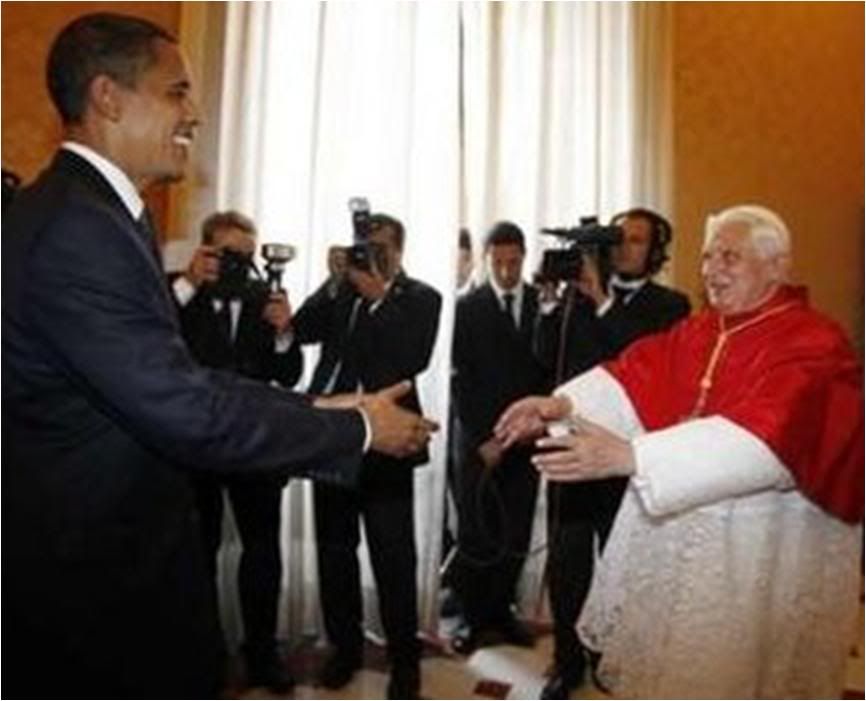
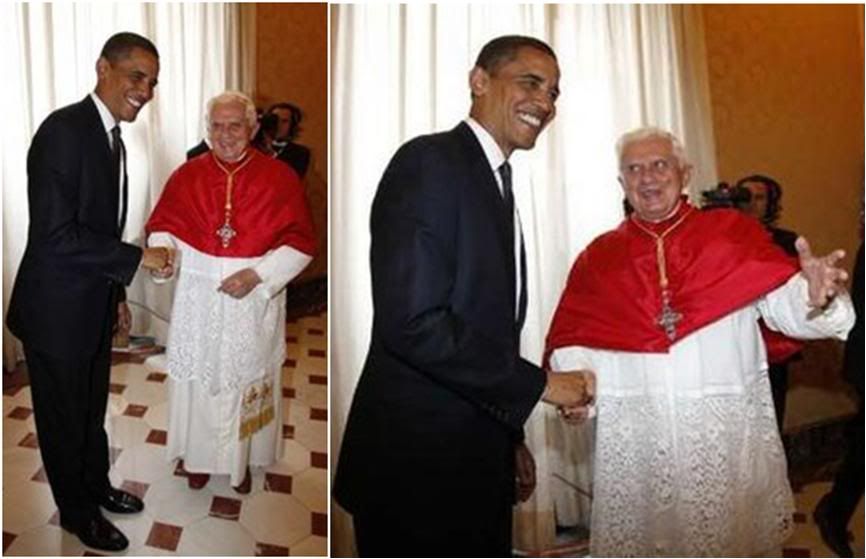
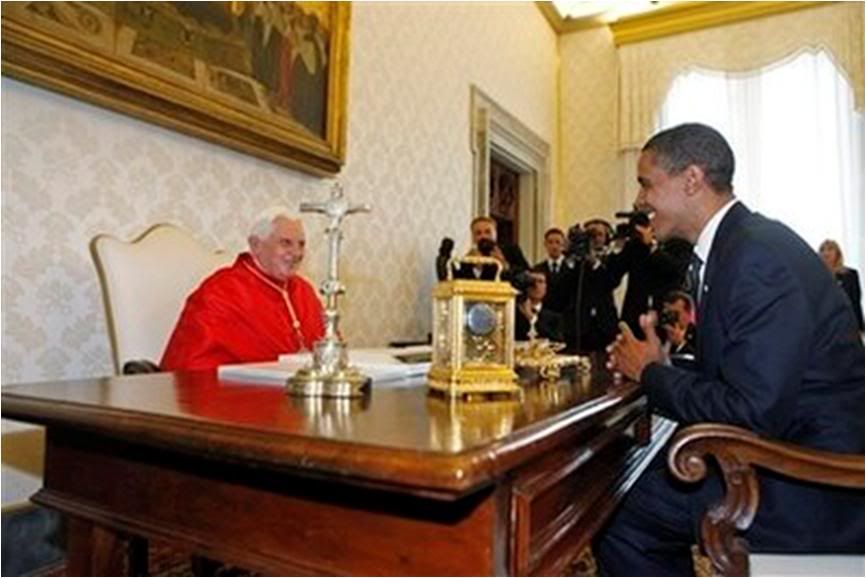 Obama wraps up first meeting
Obama wraps up first meeting
with Pope Benedict XVI at Vatican,
then heads to Ghana

VATICAN CITY, July 10 (AP) - President Barack Obama sat down with Pope Benedict XVI at the Vatican on Friday for a meeting in which frank but constructive talks were expected between two men who agree on helping the poor but disagree on abortion and stem cell research.
"It's a great honor," Obama said as he greeted the pope, thanking him for this first meeting. They sat down at the pontiff's desk and exchanged pleasantries before reporters and photographers were ushered out of the ornate room.
The pope was heard asking about the Group of Eight summit, the meeting of developed nations that concluded before Obama's arrival at Vatican City. Obama said it "was very productive."
The pope and Obama met for half an hour, then were joined by first lady Michelle Obama.
Upon leaving, Obama again thanked the Pope. "We look forward to a very strong relationship between our two countries," he said.
There was no immediate word on what was discussed in the meeting.
With some Catholic activists and American bishops outspoken in their criticism of Obama, even as polls have shown he received a majority of Catholic votes, the audience was much awaited.
Obama is very popular in Italy and several hundred people lining the broad avenue leading to St. Peter's Square cheered his limousine as it went by. Obama waved. Awaiting him at the Vatican was an honor guard of Swiss Guards in their colorful, striped uniforms.
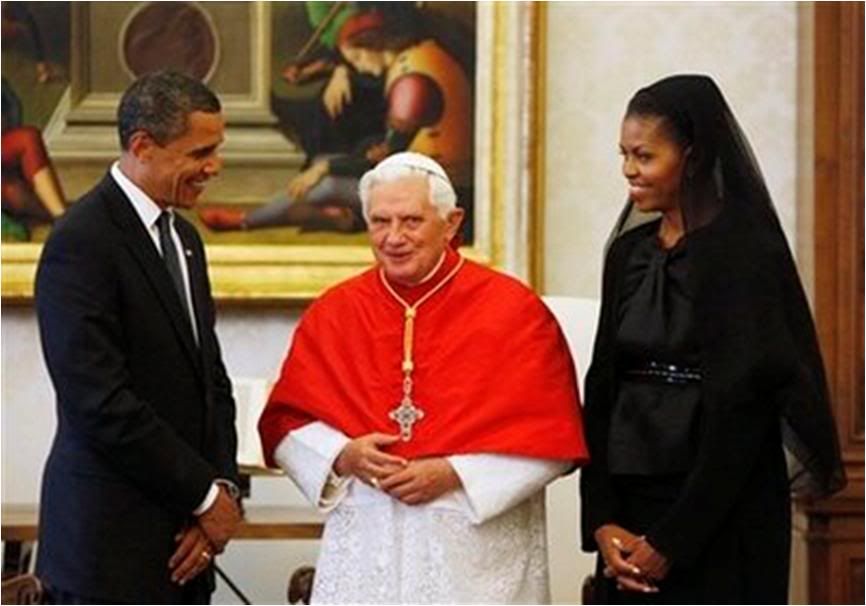
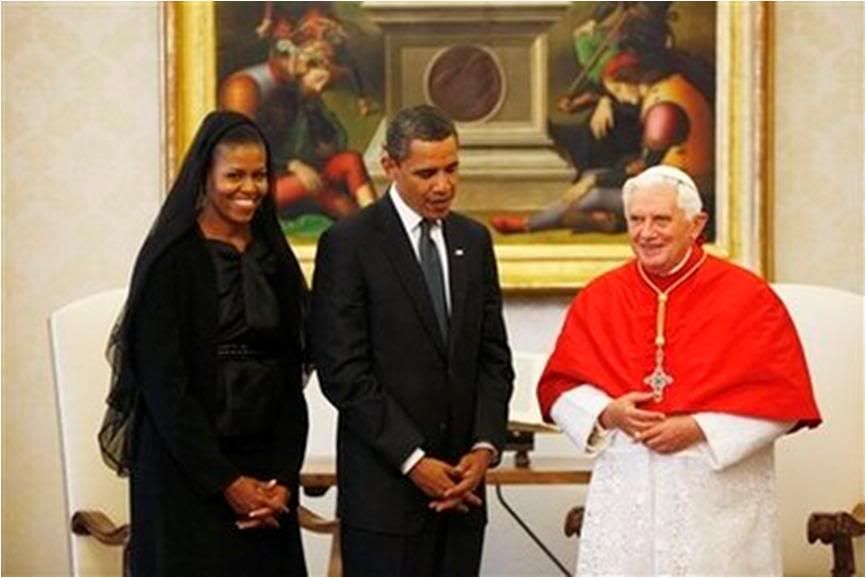
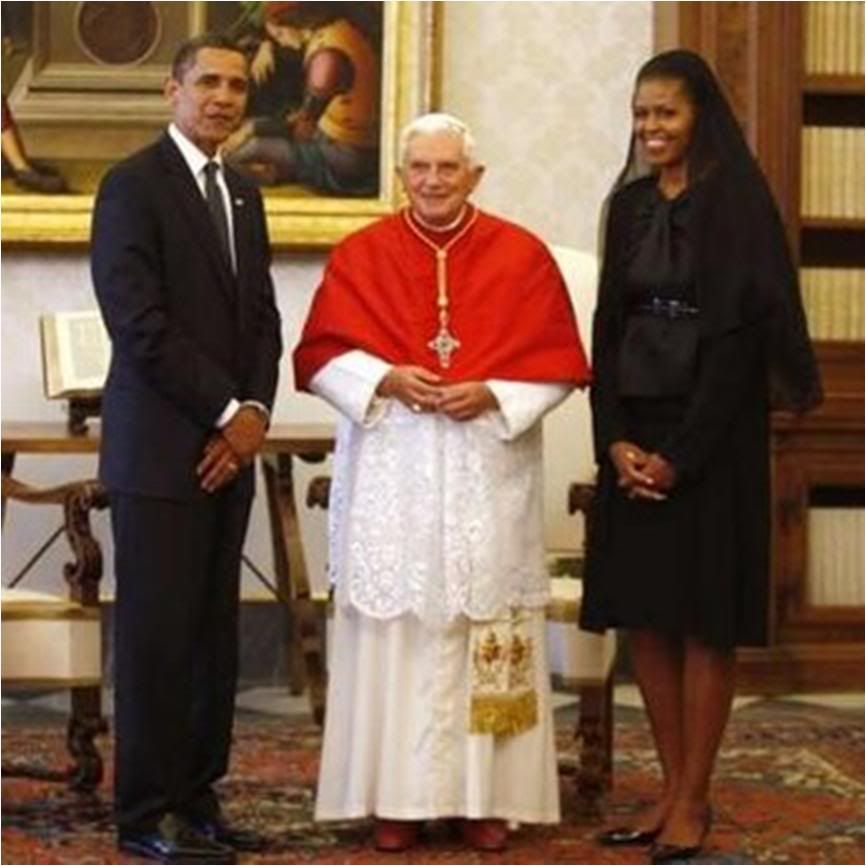
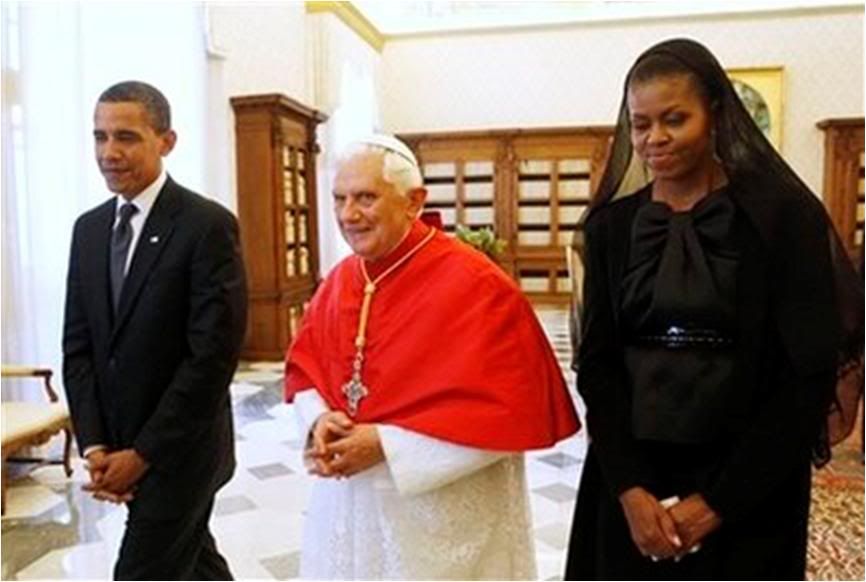
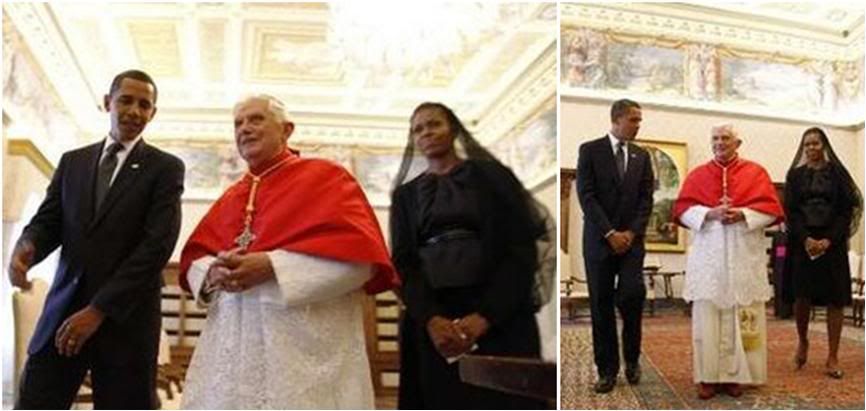
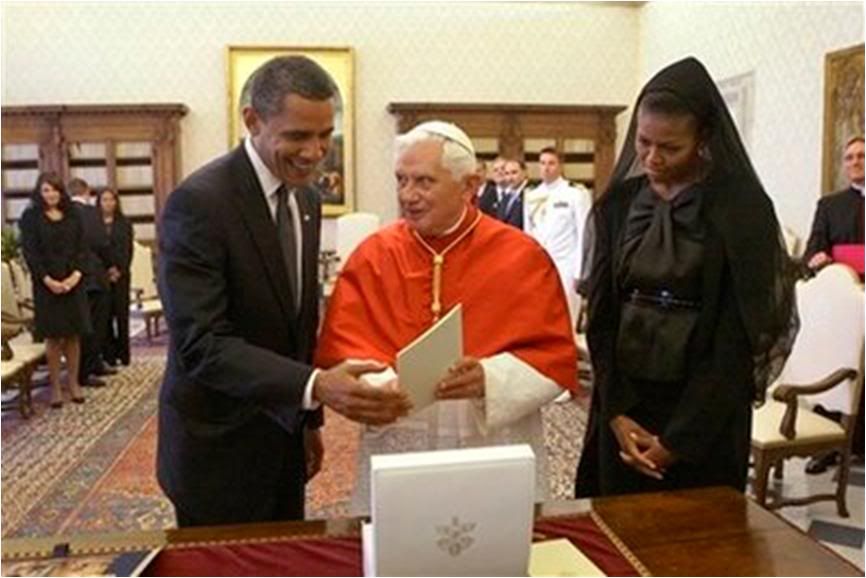
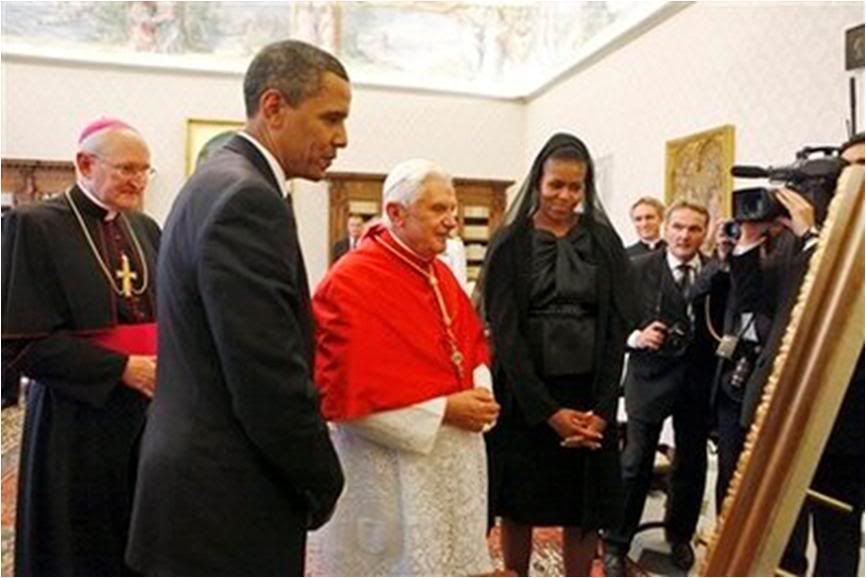 Now, let's see the spinmasters try to spin this! Nobody, but nobody, not even POTUS, gets a 'pass' from the Pope when it comes to standing for non-negotiable principles like the defense of life which are not amenable to dialog despite the best will in the world!
At their first meeting,
Now, let's see the spinmasters try to spin this! Nobody, but nobody, not even POTUS, gets a 'pass' from the Pope when it comes to standing for non-negotiable principles like the defense of life which are not amenable to dialog despite the best will in the world!
At their first meeting,
Pope Benedict XVI and Obama
agree on helping the poor;
disagree on abortion,
stem cell research
by Victor L. Simpson

VATICAN CITY, July 10 (AP)-- President Barack Obama sat down with Pope Benedict XVI at the Vatican on Friday for frank but constructive talks between two men who agree on helping the poor but disagree on abortion and stem cell research.
"It's a great honor," Obama said as he greeted the Pope, thanking him for this first meeting, which lasted 30 minutes. They sat down at the pontiff's desk and exchanged pleasantries before reporters and photographers were ushered out of the ornate room.
The Pope was heard asking about the Group of Eight summit, the meeting of developed nations that concluded before Obama's arrival at Vatican City. Obama said it "was very productive."
After the meeting, the Vatican said the two leaders discussed immigration, the Middle East peace process and aid to developing nations. But the Vatican's statement also underscored the pair's deep disagreements on abortion.
"In the course of their cordial exchanges, the conversation turned first of all to questions which are in the interest of all and which constitute a great challenge ... such as the defense and promotion of life and the right to abide by one's conscience," the statement said.
Even in his gift to the U.S. leader, the Pope sought to communicate his beliefs. Benedict gave Obama with a copy of a Vatican document on bioethics that hardened the church's opposition to using embryos for stem cell research, cloning and in-vitro fertilization. (And that's our Pope Benedict, who always does what needs to be done and say what needs to be said - as he did with Speaker Nancy Pelosi earlier this year - to make clear where the Church stands.]
"Yes, this is what we had talked about," Obama said, telling the Pope he would read it on the flight to Ghana.
Earlier, the Pope's secretary, the Rev. Georg Ganswein, had told reporters the document would "help the president better understand the position of the Catholic Church." [Imagine, even GG pushing the message for the Church!]
Upon leaving, Obama again thanked the Pope. "We look forward to a very strong relationship between our two countries," he said.
Obama met first with Cardinal Tarcisio Bertone, the Vatican's secretary of state, before meeting Benedict in the Pope's study.
Obama's wife, Michelle, joined him at the end of the meeting, and gifts were exchanged. Daughters Malia and Sasha, who accompanied their parents on the weeklong trip, also met Benedict. They were ushered out of the room before the media were allowed back in.
Several senior White House staff members also met the Pope, with some either shaking his hand or kissing his ring.
[The rest of the story is a repeat of the background that Simpson wrote about in his [preliminart story this morning - See post above this.]
THE VATICAN COMMUNIQUE
ON THE MEETING
Translated from

This afternoon, Friday, July 10, His Holiness Benedict XVI received in audience the President of the United States of America, His Excellency Mr. Barack Obama.
Before that, the President met His Eminance Cardinal Tarcisio Bertone, Secretary of State, and Mons. Dominuque Mamberti, secretary for relations with other states.
During the cordial conversations, they dwelt first of all on questions that are of interest to everyone and which constitute the great challenge for the future of each nation and for the true progress of peoples, such as the defense and promotion of life and the right to conscientious objection.
They also focused on immigration, with particular attention to keeping famlies together.
Also central to the talks were issues of international politics, especially in the light of what took place at the G8 summit earlier this week. They dwelt on the prospects of peace in the Middle East, on which they had convergent views, and other regional situations.
They reviewed some topics of greaet relevance like the dialog among cultures and religions, the global economic-financial crisis and its ethical impllcations, food security, development aid to the poorer countries, especially to Africa and Latin America, and the problem of itnernational drug trafficiking.
Finally, they emphasized the importance of educating people of every nation in tolerance.
I think the AP account did not emphasize enough the second non-negotiable principle underscored by the Vatican communique: the right to conscientious objection, in this case by Cath9olic healthcare professionals who refuse to tkae part in abortion practices (including not selling contraceptives).
Note how the Vatican statement laid the stress, first and foremost, on these two non-negotiable princniples - even before going to questions like the Middle East, the world crisis and other international problems!
In his first report on the meeting, even cheerleader-in-chief John Allen does not attempt to spin what happened, except the usual "The Vatican went out of its way for Obama" - something the MSM chose to underplay when the Pope gave George W. Bush an unprecedented Vatican visit last June which was really 'going out of the way'!
Does anyone remember that - the reception and talk at Torre San Giovanni, the stroll through the Vatican Gardens, the musical program at the Grotto of Our Lady of Lourdes? At a time when Bush had six months left in his Presidency, the only ones to honor him as a person and as US President were the Pope and the African peoples whom his government had helped shubstantially in development aid and fighting malaia and AIDS.
Pope presses Obama
on pledge to reduce abortions;
Leaders find 'general agreement'
on Middle East, other issues

July 10, 2009
ROME - When President Barack Obama came calling on Pope Benedict XVI today, the two men enjoyed a “truly cordial” encounter, according to a Vatican spokesperson, but at the same time there was no diplomatic silence from the Pontiff about their differences over abortion and other “life issues.”
Not only did Benedict press his pro-life case with his words to the president, but he even found a way to make the point with his gift, offering the president a copy of a recent Vatican document on bioethics [Dignitas Personae, acccording to the Italian media]]. According to a Vatican spokesperson, the pope drew a repetition from Obama of his vow to bring down the actual abortion rate.
Beyond the life issues, the Vatican’s statement indicated that Benedict and Obama also found “general agreement” on the Middle East peace process and other regional situations.
The two leaders also touched food security, development aid especially for Africa and Latin America, immigration and drug trafficking, according to the statement.
Coming away from the meeting, however, it was hard to escape the impression that Benedict wanted to use it to deliver a clear pro-life message.
While Jesuit Fr. Federico Lombardi, the Vatican spokesperson, said after the meeting that it would be wrong to interpret the Pope’s message as a “polemic,” he added that the life issues are “important for the American Church” and “it would be ambiguous to try to hide these differences, or to put them in second place.”
According to a written statement from the Vatican, the first issues discussed during a 35-minute private meeting this afternoon in the Apostolic Palace were “questions which … constitute a great challenge for the future of every nation and for the true progress of peoples, such as the defense and promotion of human life and the right to abide by one’s conscience.”
The latter phrase was understood as a reference to the current debate in America over protections for health care workers who assert a conscientious objection to participating in abortions or other procedures.
During a session with Catholic journalists last week, Obama promised a “robust conscience clause” which would not weaken protections in vigor during the Bush administration.
In a briefing for reporters in Rome, Lombardi said that Benedict XVI said afterwards that Obama had seemed “attentive” to the Church’s concerns, and that Obama had reiterated his commitment to adopting policies that will bring down the actual number of abortions.
Lombardi said that Benedict XVI seemed “very satisfied and content” with how the meeting went. Obama left the meeting saying to the Pope that he wants to forge “a very strong relationship” with the Vatican.
The face-to-face session between Obama and Benedict XVI, accompanied by two interpreters, was scheduled to last around 15 minutes, but in the end the two men were behind closed doors for more than 35 minutes. Afterwards Obama introduced his family to the Pope, along with key members of his administration, and the two men exchanged gifts.
Typically that gift exchange is pro-forma, but this afternoon Benedict XVI used it to underscore his message on the life issues. In addition to a signed copy of his recent encyclical on the economy, Caritas in Veritate, which has become the Pope’s standard offering to heads of state this week,
Benedict also gave Obama a copy of Dignitas Personae, an instruction from the Vatican’s doctrinal agency on bioethics released last December.
Dignitas Personae lays out the church’s position in defense of human life “from conception to natural death,” and also treats a wide range of new bioethical questions such as embryonic stem cell research, cloning, preimplantation diagnosis and genetic engineering.
As reporters waited outside during the private session, a top papal aide approached them to explain that the Pope was presenting Obama with a copy of Dignitas Personae. He said, “The reading [of this document] could help the president better understand the church’s position.”
Later, as Benedict pointed the document out to him, Obama said it looked like he had “some reading to do on the plane.”
Prior to his session with Benedict XVI, Obama sat down with the Vatican’s Secretary of State, Italian Cardinal Tarcisio Bertone, for roughly 15 minutes.
Well before Obama even strolled into the Apostolic Palace, both sides had made clear they were committed to making this meeting happen.
Obama called on the Pope in the middle of what is arguably among the busiest days of his presidency to date. This morning he wrapped up a G8 summit in the Abruzzo region of Italy, meeting with the heads of state of African nations and then conducting a bilateral meeting with President Jacob Zuma of South Africa.
Obama then made his way to Rome to see the Pope, en route to the airport for a state visit to Ghana, where he’s due to arrive tonight.
On the Vatican side, two small but telling concessions reflect their eagerness to receive Obama. For one thing, it’s long been diplomatic protocol here that the Pope receives heads of state in the late morning, with the afternoon often reserved for meetings with curial officials.
For another, the normal procedure is for a head of state to meet first with the pope, in his library on the top floor of the Apostolic Palace, and then to descend to the first floor for a session with the Cardinal Secretary of State in his office.
In this case, Bertone came upstairs to meet Obama in a corner room, just a few doors down the hall from the papal apartment. In an inversion of the normal sequence, Obama met first with Bertone and then with Benedict XVI.
All these gestures were designed to accommodate Obama’s tight schedule, and although the concessions may seem small, in the carefully orchestrated world of Vatican diplomacy – where nothing is too insignificant to escape notice – they amounted to unmistakable signals that the Vatican wanted the chance to put some matters on Obama’s radar screen.
Despite the weighty nature of the issues at stake, some of the rock-star-like excitment that Obama often induces was evident even in and around the Vatican this afternoon.
In the Press Office of the Holy See, for example, a French correspondent displayed a banner above his work space, playing off the famous “Yes We Can!’ mantra of the Obama campaign.
The banner read: “Yes We Vatican!”
 Perhaos the most sensible comment I read in the American press during the pre-meeting hooplah was from Father David O'Connell, rector of the Catholic University of America, who drily observed:
Perhaos the most sensible comment I read in the American press during the pre-meeting hooplah was from Father David O'Connell, rector of the Catholic University of America, who drily observed:
"People are making much more out of this than needs to be made. This is a standard meeting that the Holy Father gives a head of state, and I don't think it's going to be some great, earthshaking event. It's going to be a gracious and courteous time together."
As it seemed to be. The Pope looked very cheerful, Obama was beaming all the time, he and Mrs. Obama displayed a natural and easy deference to the Pope, the photos and videos are delightful.
It was, of course, not the standard meeting in the sense that the President of the United Sattes, whoever he is, is not your standard guest. In much the same way - perhaps more, even - that the Vicar of Christ on earth is not your standard host!
But there is also the historic fact that Obama is America's first black President, and whatever one may think of his policies (or his person, even), you can't take away that significant and historic distinction from him, and the fact that he had what it took [though not always right and proper] to win the Presidency after a mere handful of years in elected office.
It is in the mutual interest of both the Pope and the President to have had this opportunity to 'size each other up', to somehow get a sense of your interlocutor even after such a short get-together.
We should all be happy it went the way it did.
And, by the way, I continue to under-estimate the media capacity for spin. Consider this opening paragraph from an 'NCR Catholic' writing for NCR:
Benedict, Obama meeting
marked by clarity, respect:
Pope sets aside politics,
favoring education, persuasion
By Nicholas P. Cafardi
On abortion and some others topics, they evidently agreed to disagree, not in polemical anger, but in a clear understanding that such issues are difficult ones in a pluralistic society, in which well-meaning people, “exercising the right to abide by one’s own conscience,” in the words of the post-meeting Vatican press release, might have different moral solutions to the same problem. ...
[That's a blatant distortion right there of the context in which 'exercising the right to abide by one's own conscience' was meant in the Vatican communique!]
'They agreed to disagree' appears to be the Obama-rah-rah media's line on what took place at the Vatican today. Here's the spin from TIME:
Obama and the Pope:
Agreeing to disagree on "life" issues
By Jeff Israely

Vatican City Friday, Jul. 10, 2009 - Body language says a lot about a world leader's audience with the Pope.
During his 2007 visit to Pope Benedict XVI's private library, President George W. Bush sat down across the desk from the Pontiff as if he had just landed on his own porch in Crawford, Texas: leaning back in the velvet chair, legs crossed, apparently eager to show his command of the situation. [Isn't it more likely he was just being his usual self? I don;t think he ever, in eight years, gave the impression that he was 'eager to show he is in command' - he simply was in command when he had to - and meeting with the Pope was not one of those occasions. That meeting also came after Bush came back from a G8 summit in the Pope's homeland. I always had the impression Bush behaved with the Pope as he did did with his own father, who is two years older than Benedict, and with whom his children have a very warm and loving relationship that is evident whenever they are together or talk about each other.]
When President Barack Obama sat down in that same spot on Friday, July 10, for his first papal meeting, his posture was altogether different. Leaning forward from the front edge of the chair, his shoulders slightly hunched, his crossed hands resting softly on the edge of the Pope's desk, the leader of the free world looked more like a schoolboy who'd arrived to humbly plead his case to the principal. [This, too, is a forced and false reading of Obama, who was full of confidenceas usual, though to his credit, he avoided the swagger, and seemed genuinely and naturally deferential all throughout what we were shown on TV.]
"You must be used to getting your picture taken," Obama commented to the Pope as a scrum of photographers clicked away, then continued, "I'm still getting used to it."
The potential for global symbolism abounds whenever an American President meets the Roman Pontiff, and the first-ever encounter between the 47-year-old Obama and the 82-year-old Benedict offered a vivid snapshot of how the change of the guard in Washington looks on the world stage.
Of course the differences are not just in the humble body language but in hard policy. To a large degree, the deck has flipped from the Bush era: the Obama Administration's focus on dialogue-centric, multilateral foreign policy is to the Vatican's liking, while its support of abortion rights and stem-cell research are a deep worry after the Pope's having had an ally on bioethics in the White House for eight years.
And during the oddly scheduled Friday afternoon meeting, crammed between the end of the Group of 8 meeting in L'Aquila, Italy, and Obama's departure for Ghana, the Pope had no intention of papering over differences on what the Vatican calls "life" issues, such as abortion and euthanasia.
While reporters and photographers waited in a narrow Vatican corridor outside the library during the private audience, the Pope's personal secretary, Monsignor Georg Ganswein, disclosed that there was one item added to the list of gifts for Obama: Dignitas Personae ("The Dignity of a Person"), a Vatican document released in December that lays out its latest stance on biomedical ethics. "It can help the President better understand the position of the Catholic Church," said Ganswein.
When the Pope presented him with the light green softcover document after their 35-minute closed-door meeting, Obama quickly responded, "Yes, this is what we had talked about." And like that humble schoolboy, the President assured the Pope he would read it on the flight to Ghana.
Patrick Whelan, head of the Catholic Democrats organization in Boston, believes that the Pope's particular emphasis on bioethics may have been due to the recent uproar in the U.S. Catholic Church over the President's invitation to give the commencement address at the University of Notre Dame.
Some Catholic bishops opposed to the invitation because of Obama's stance on abortion and other ethical issues had hoped in vain that the Vatican would join the fray.
"There was a feeling that [ the Pope] didn't back them up over Notre Dame," said Whelan. "He wanted to show them that he wouldn't shy away from these issues in front of Obama." [What an absurd supposition!It isn't for the Pope to 'back up' local bishops when they take a stand on local issues, and I am sure none of those 80 bishops expecetd the Pope to issue a statement saying "I think Notre Dame should not give the President an honorary degree"! Since when has any modern Pope descended to such detail in his governance of the Church? And the Pope has nothing to prove to the bishops, either.]
Vatican spokesman Father Federico Lombardi told reporters after the audience that it was important for the Pope to be clear about the Church's stance on ethical issues.
"It would be ambiguous to hide or minimize what we believe," he said. "It's not meant to be divisive or polemical." Lombardi added that the Pope told him that Obama "explicitly expressed his commitment to reducing the numbers of abortions and to listen to the Church's concerns on moral issues."
Father Lombardi said the Pope seemed "extremely satisfied" with the meeting and was "well impressed" with Obama, who was "attentive and ready to listen."
White House officials said the President hand-delivered a letter to the Pope from Senator Edward Kennedy, who's suffering from an incurable brain tumor, and Obama asked for prayers for the brother of the only Catholic President in American history.
Benedict, who doesn't have the same instincts in world diplomacy as Pope John Paul II and has had some notable verbal missteps, [Israely just can't help planting this poisoned stiletto of his every chhance he gets!] has a new opportunity with a like-minded Obama Administration to have more of a say on a vast array of foreign policy challenges. [ DIM]8pt[=DIM][Really! How exactly does he have more of a say? On whatever issues they may think the same about, Obama's 'say' will always be considered the decisive 'say', with the Vatican simply part of the chorus. That's just the way things are in the world of itnernational politics.]
Among other issues touched upon was the West's relations with Islam, and the White House noted that they spoke about Obama's recent speech in Cairo directed at the Muslim world.
Still, beyond the private talk, Obama's visit to the Vatican — in which the President's wife and daughters also got a private tour of St. Peter's Basilica and the Sistine Chapel — is one of the key encounters of his first year in office. It gives him the chance not only to solidify support from U.S. Catholic voters at home but also to spread his new American gospel to the world [?????What new gospel? And how does association with the Vatican, however superficial it is because that's what it is for now, help him spread that 'gospel?
All those pro-abortion Catholics who voted for Obama will simply feel more hostile to the church and to the Pope for being so 'stubbornly old-fashioned in opposing abortion'! And Obama staunchly standing by his position that 'abortion is a fundamental human right' ain't going to solidify like-thinking Catholics behind him if his economic policies don't work!]
Once again, Mr. Israely, EEEEEWWWWWW!!!!!
[Modificato da TERESA BENEDETTA 11/07/2009 04:56] |
| |
 11/07/2009 13:34 11/07/2009 13:34 |
|
| | | OFFLINE | | Post: 17.912
Post: 581 | Registrato il: 28/08/2005
Registrato il: 20/01/2009 | Administratore | Utente Senior | |
|
 The Pope receives
The Pope receives
new Mexican envoy
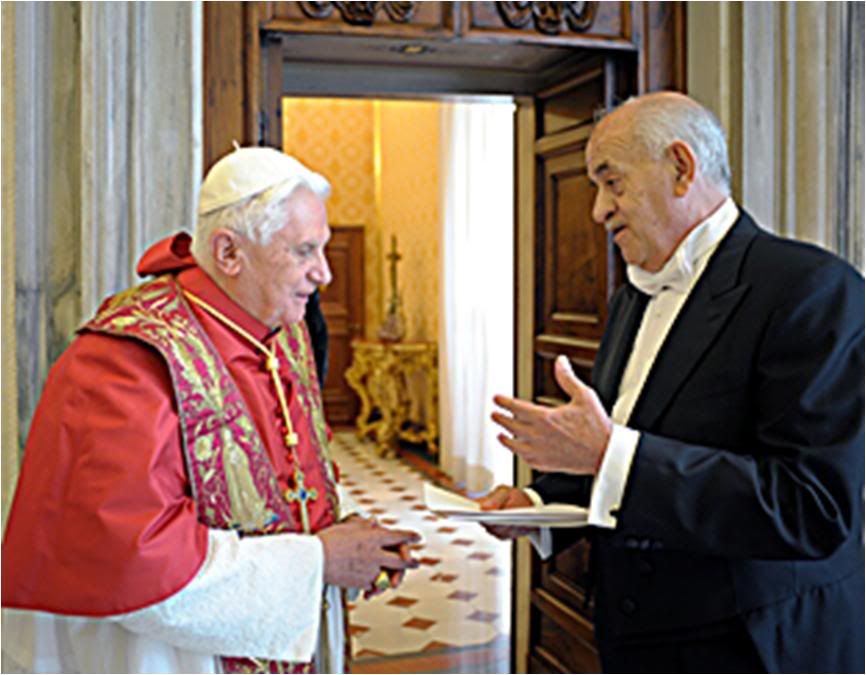 Yesterday morning, 7/10, the Holy Father received the new ambassador from Mexico to the Holy See, and delivered an important address. The event was all but overlooked because of the Obama visit. I will post a translation here.
Pope urges Mexico to respect life,
Yesterday morning, 7/10, the Holy Father received the new ambassador from Mexico to the Holy See, and delivered an important address. The event was all but overlooked because of the Obama visit. I will post a translation here.
Pope urges Mexico to respect life,
praises abolition of death penalty
By Cindy Wooden

VATICAN CITY, July 10 (CNS) -- Emphasizing the importance of protecting human life, Pope Benedict XVI congratulated the government of Mexico for its decision in 2005 to eliminate the death penalty.
"One cannot insist enough on the fact that the right to life must be recognized fully," the Pope said July 10 as he welcomed Hector Ling Altamirano as Mexico's new ambassador to the Holy See.
Governments must enact laws and public policies that "take into account the high value that a human being has at every moment of existence," the pope said.
"In this regard, I welcome with joy the initiative of Mexico, which in 2005 eliminated its capital punishment legislation, as well as the recent actions some states have taken to protect human life from its beginning," Pope Benedict told the new ambassador.
The Pope said he prayed that Mexico would be able to face its current problems with courage and determination so the nation would "continue on the path of freedom, solidarity and social progress."
The government has taken many steps to promote a more just social order and resolve serious problems such as violence, drug trafficking, inequality and poverty, "which can breed delinquency," the pope said.
He told the ambassador that an effective and lasting solution to such social problems also requires "moral renewal, the education of consciences and the building of a real culture of life."
The Catholic faith, shared by the vast majority of Mexicans, espouses values that Mexico needs in the process of "promoting justice, working for peace and reconciliation, encouraging honesty and transparency, combating violence, corruption and crime, caring constantly for human life and safeguarding human dignity," he said.
Respecting freedom of religion means not only protecting people's rights to believe and to worship, but it also means allowing them to try to apply their religious values to public discussions and social policies, he said.
Pope Benedict also called on the Mexican government to promote policies that assist families, both because they are a central value of the Mexican people and because strong families are essential for a strong nation.
"The family -- a community life and love founded on the indissoluble marriage of a man and a woman -- is the basic unit of the social fabric," he said. Families are "schools of respect and mutual understanding, seedbeds of human virtues and a motive of hope for the rest of society," he said.
[Modificato da TERESA BENEDETTA 11/07/2009 16:58] |
| |
 11/07/2009 13:44 11/07/2009 13:44 |
|
| | | OFFLINE | | Post: 17.913
Post: 582 | Registrato il: 28/08/2005
Registrato il: 20/01/2009 | Administratore | Utente Senior | |
|
 Pope blesses a new Marian image
Pope blesses a new Marian image
in the Vatican Gardens
Translated from
the 7/11/09 issue of

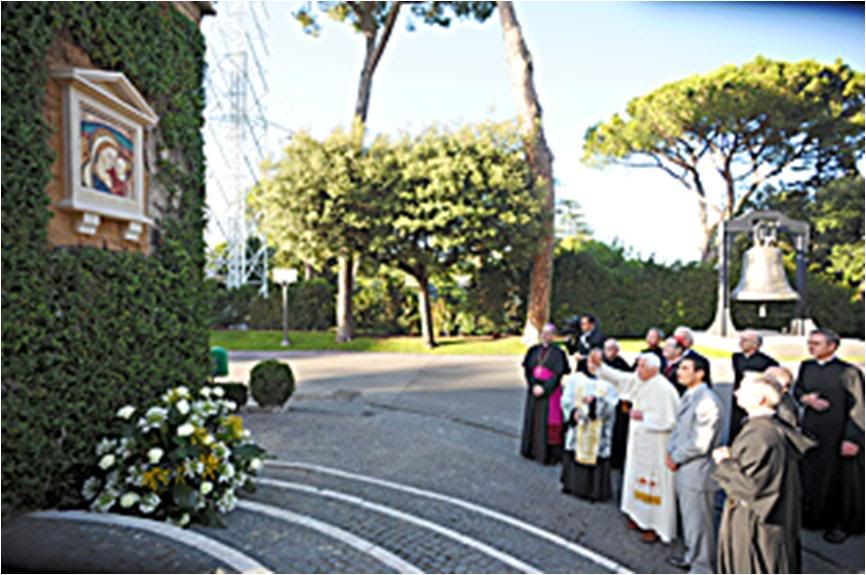
An icon representing Our Lady of Good Counsel, executed by the Mosaic Studio of the Fabbrica di San Pietro. was blessed by the Holy Father in the Vatican Gardens on Thursday afternoon.
The path along which the image is located, earlier called Largo della Capanna Cinese (Path of the Chinese Hut), has been renamed Largo Madre del Buon Consiglio.
Taking part in the ceremony were Cardinal Giovanni Lajolo, president of teh Pontifical Commission for Vatican City State as well as the Governatorate; Mons. Renato Boccardo, secretary-general of the Governatorate; Bishop-elect Giorgio Corbellini, recently named to head the Labor Office of the Holy See; the mosaic artist, Gabriele Mattacci, and its sponsor, Camillo Anastasi; and the Pope's two private secretaries.
Also present were the Prior General of the Augustinian order, Fr. Robert Francis Prevost, and the Augustinian community of the Parish of Sant'Anna in the Vatican, which promoted the initiative; along with parish priest Don Roberto Silvestrini and his predecessor Don Gioele Schiavella.
Before the ceremony, the Pope first blessed the path that leads from Torre San Giovanni towards the new icon, which in October 9 last year - on the 50th anniversary of the death of Pius XII, had been named the Passeggiata Pio XII (Pius XII Walk), since it was where he used to take his daily walks.
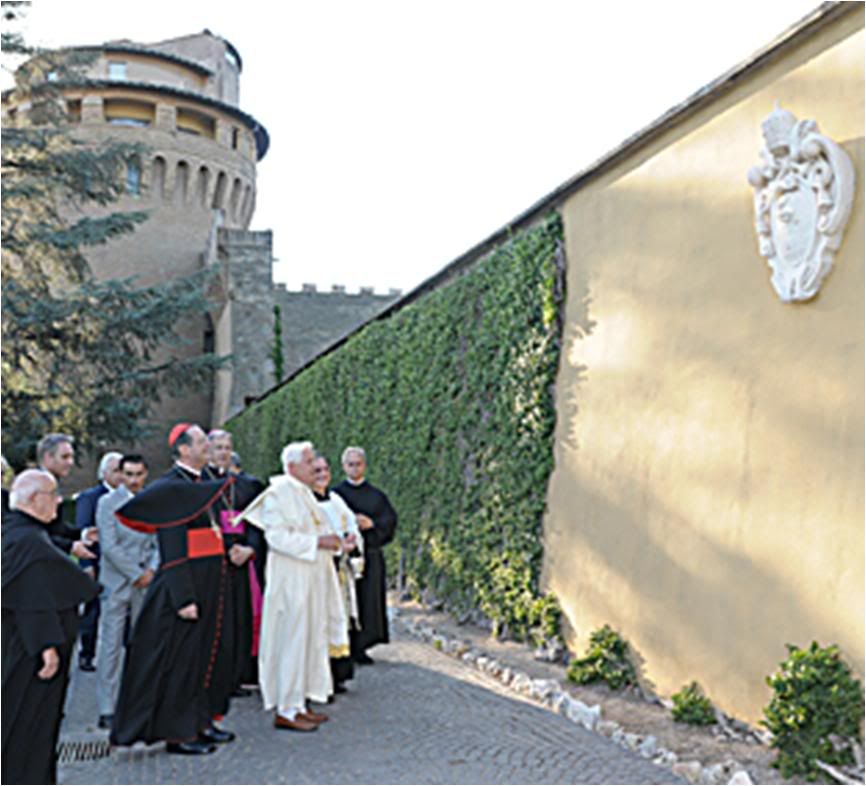
In the photo, the Pope looks at Pius XII's coat of arms that was attached to the adjoining wall last October.
The new mosaic of Our Lady of Good Counsel adapts the iconographic motives of the image (center photo) venerated in the Augustinian shrine in Genazzano in the Alban Hills.
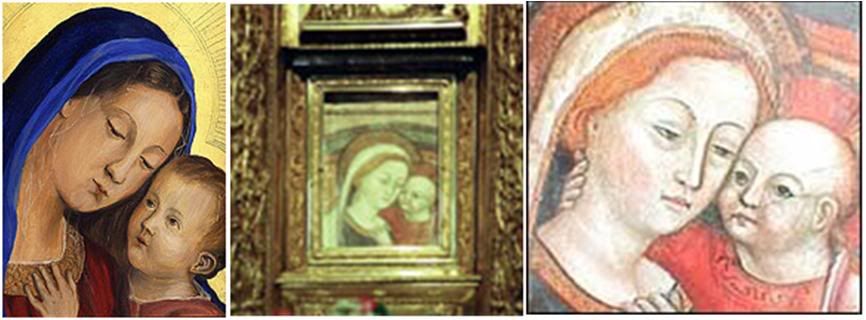
The Virgin's blue cloak represents humanity, while the Baby's red garment signifies divinity. The Virgin has the traits of classical portraiture, but the Baby's face is more Byzantine, thus expressing the ideal 'embrace between the Eastern and Western Churches that is also suggested by a rainbow over the two figures (not seen in photos).
The image traces its story back to April 25, 1467, during Vespers at the piazza adjoining a small 10th century church named for Our Lady of Good Counsel, which had been under the custody of the Augustinian fathers and was undergoing repairs.
During Vespers, the image of Our Lady with the Child Jesus appeared on one of the exterior walls of the Church. Within the next 3 months, more than 160 'miraculous events' had been attributed to the intercession of the Madonna, prompting Pope Paul II to send two bishops to investigate the situation.
News of the miracles spread throughout Italy and Genazzano became a major pilgrim destination. Meanwhile, the two bishops apparently reported favorably to the Pope because successive Popes have supported the shrine over the centuries.
Four of them visited the shrine - Urban VIII in 1630; Pius IX in 1864 (on the 10th anniversary of proclaiming the dogma of the Immaculate Conception); John XXIII in 1989; and John Paul II on April 22, 1993.
Tradition has it that the Marian image had been miraculously transported to Genazzano on that April day in 1467 from a church in Albania, where it had been venerated, in order to escape a Turkish invasion.
[Modificato da TERESA BENEDETTA 11/07/2009 18:00] |
| |
 11/07/2009 14:31 11/07/2009 14:31 |
|
| | | OFFLINE | | Post: 17.914
Post: 583 | Registrato il: 28/08/2005
Registrato il: 20/01/2009 | Administratore | Utente Senior | |
|

HAPPY NAME DAY
TO OUR BELOVED HOLY FATHER!
July 11
 St. Benedict (480-547)
St. Benedict (480-547)
Patron of Europe
OR today.
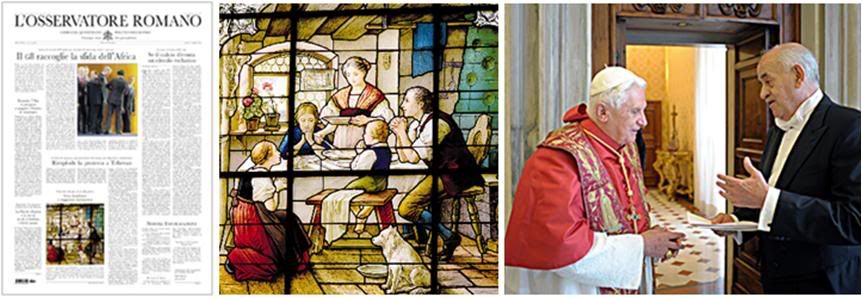
Summit leaders pledge aid against hunger and poverty
G8 responds to challenge of Africa
Illustration: Cover picture from a new book on how the Rule of St. Benedict applies in daily life.
NB: Since the newspaper goes to press at 3 p.m., anything that takes place later does not make it to the next day's issue, hence no mention in today's issue of the Obama visit.
Other Page 1 stories: The Pope tells the new Mexican ambassador (photo) that religious freedom is the rock on which human rights rest; an essay on the Rule of St. Benedict on the occasion of his liturgical feast today; new protests erupt in Tehran; and an editorial commentary on football becoming an exclusive sport. In the culture section is the introduction to a new book in Italian on House, M.D., the TV series, and how it portrays genuine ethical values through the apparently cynical leading character.
THE POPE'S DAY
The Holy Father met today with
- H.E. Stephen Harper, Prime Minister of Canada, with his wife and delegation
- Participants of the first European Meeting of University Students promoted by the Council of European
bishops' conferences. Address in Italian.
[Modificato da TERESA BENEDETTA 11/07/2009 19:37] |
| |
 11/07/2009 20:58 11/07/2009 20:58 |
|
| | | OFFLINE | | Post: 17.917
Post: 586 | Registrato il: 28/08/2005
Registrato il: 20/01/2009 | Administratore | Utente Senior | |
|
 WITH THE PRIME MINISTER OF CANADA
WITH THE PRIME MINISTER OF CANADA

This morning His Holiness Benedict XVI received the Prime Minister of Canada, His Excellence Mr Stephen Harper, who afterwards met with His Eminence Cardinal Tarcisio Bertone, Secretary of State, accompanied by His Excellence Mgr Dominique Mamberti, Secretary of the Section for Relations with States.
The friendly conversation focused on several issues of international politics discussed at the G8 and on the results of the summit, even in the light of the new Encyclical, Caritas in Veritate, and particularly the economic and financial crisis and its ethical implications, aid to developing countries, especially Africa, climatic changes, disarmament and nuclear non-proliferation.
Attention was given also to the Middle East and to the future perspectives of peace in the region, as well as to religious freedom in several countries.
With regard to Canada, the conversation involved ethical values, the defence and promotion of life, marriage and family.
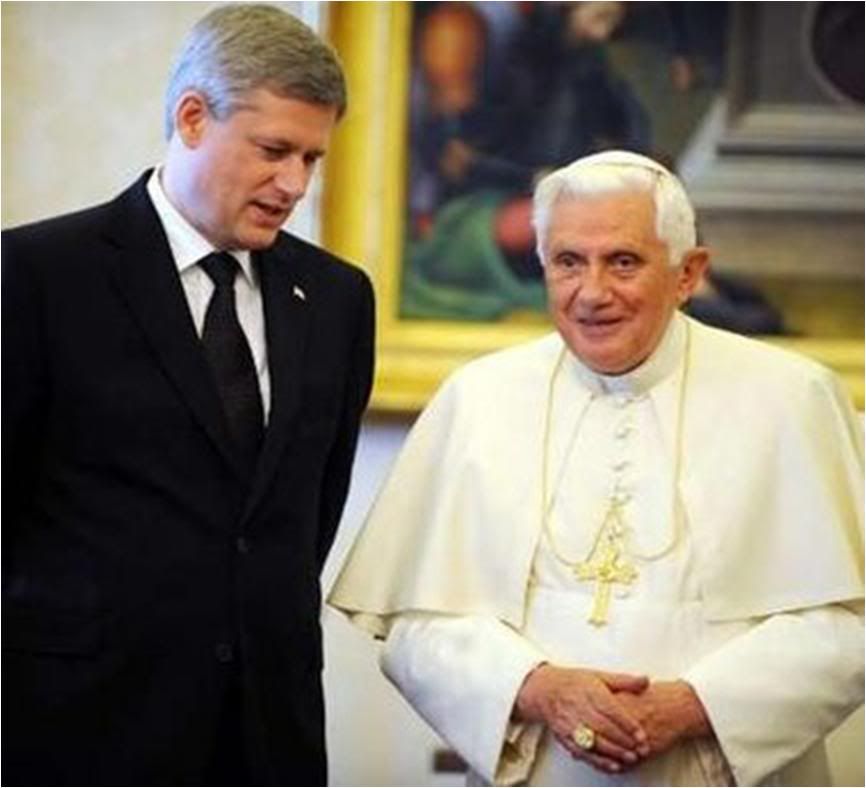
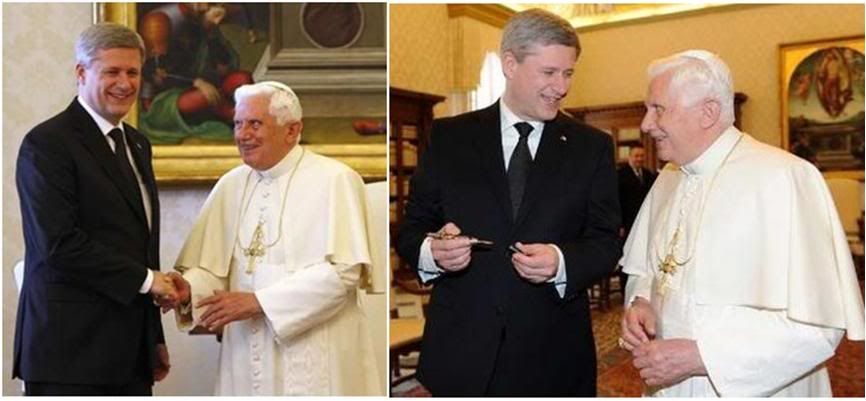
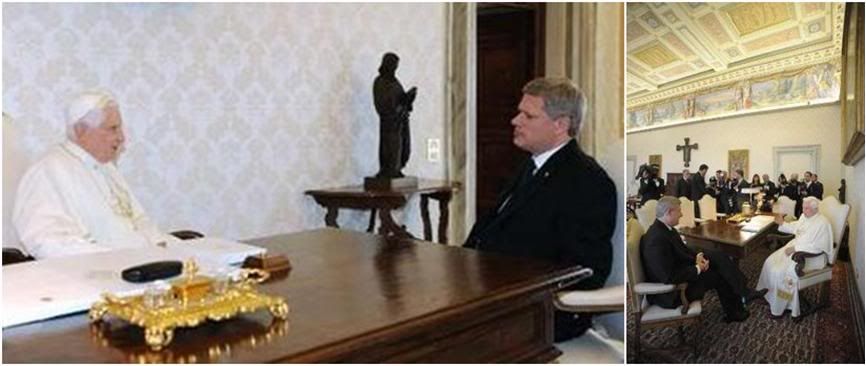
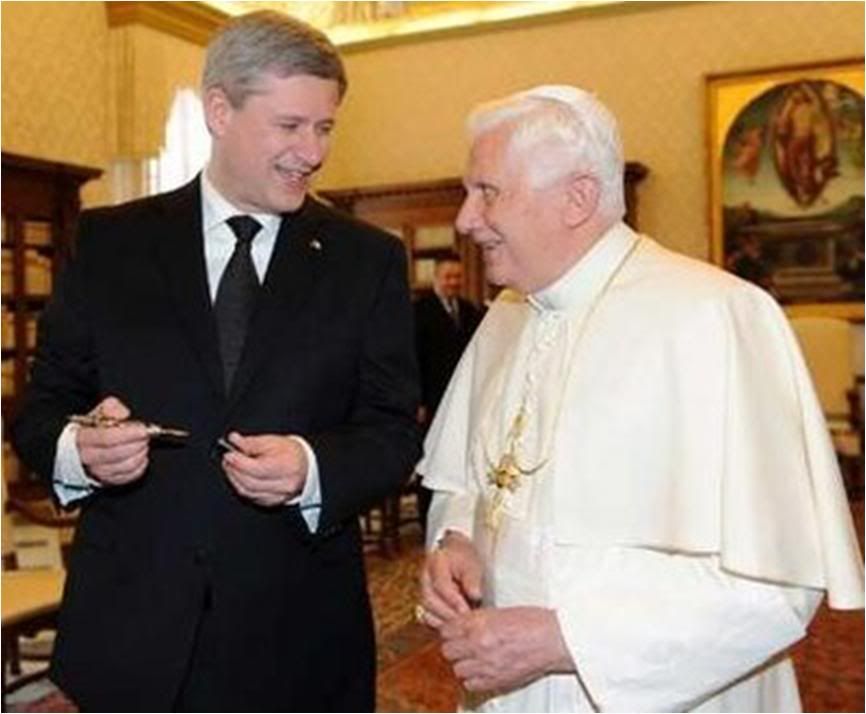
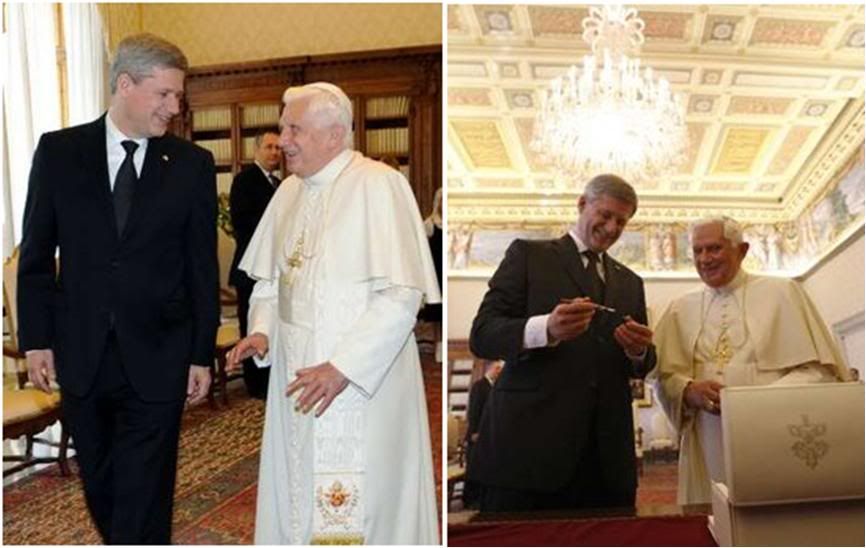
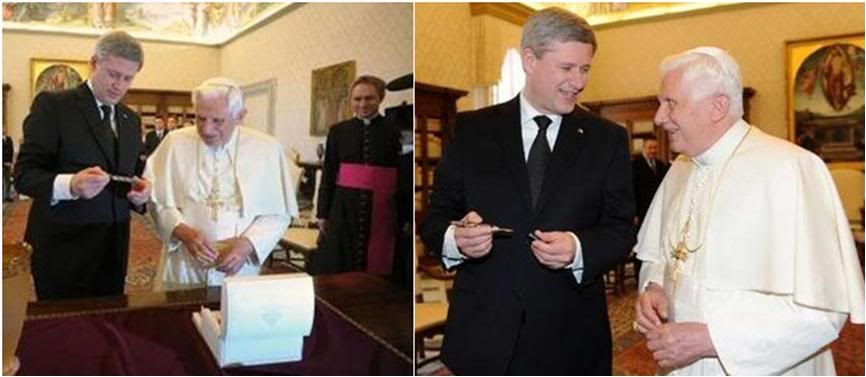
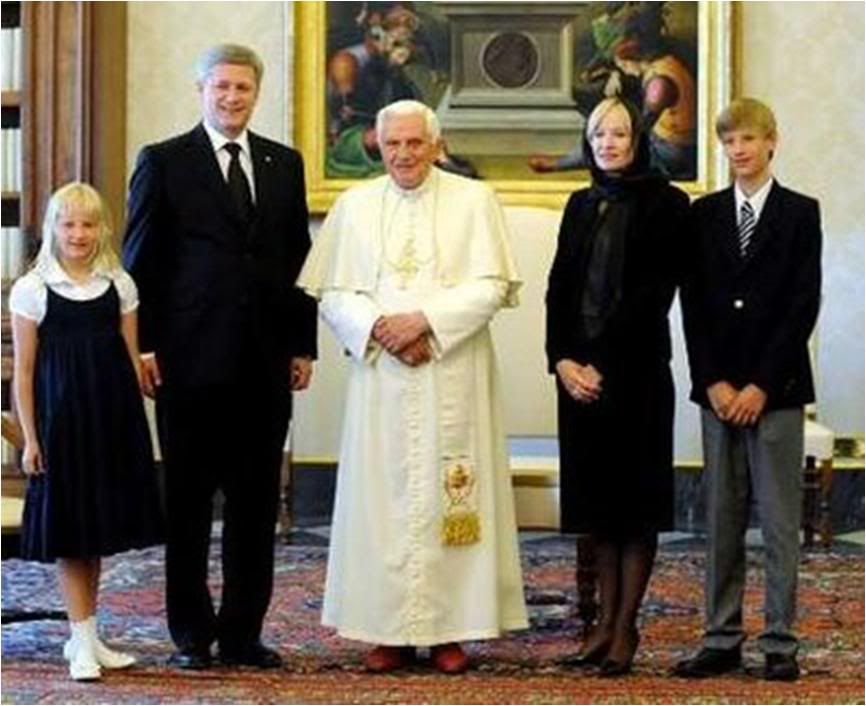
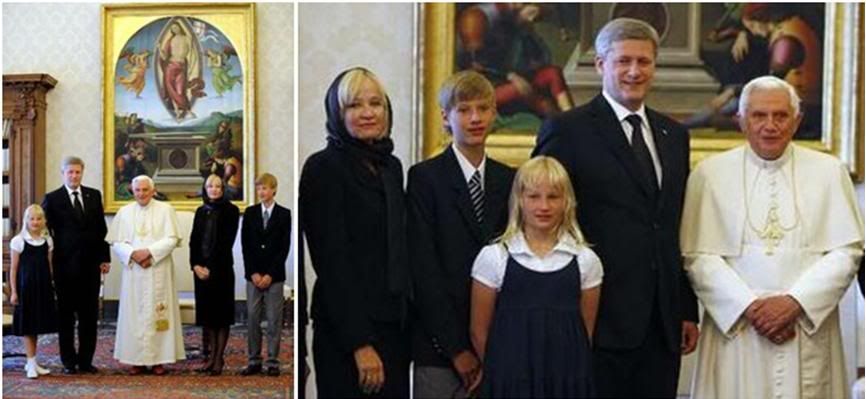
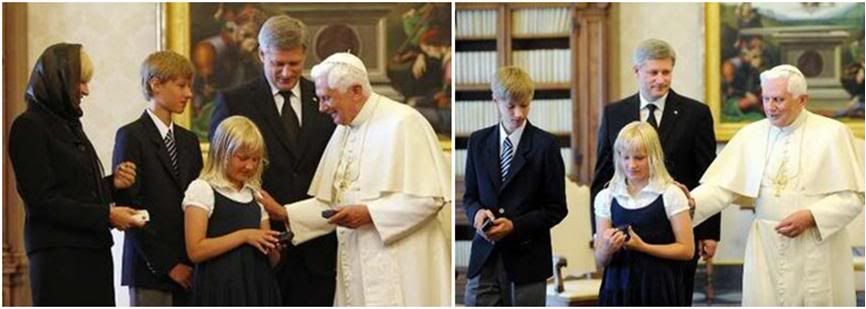
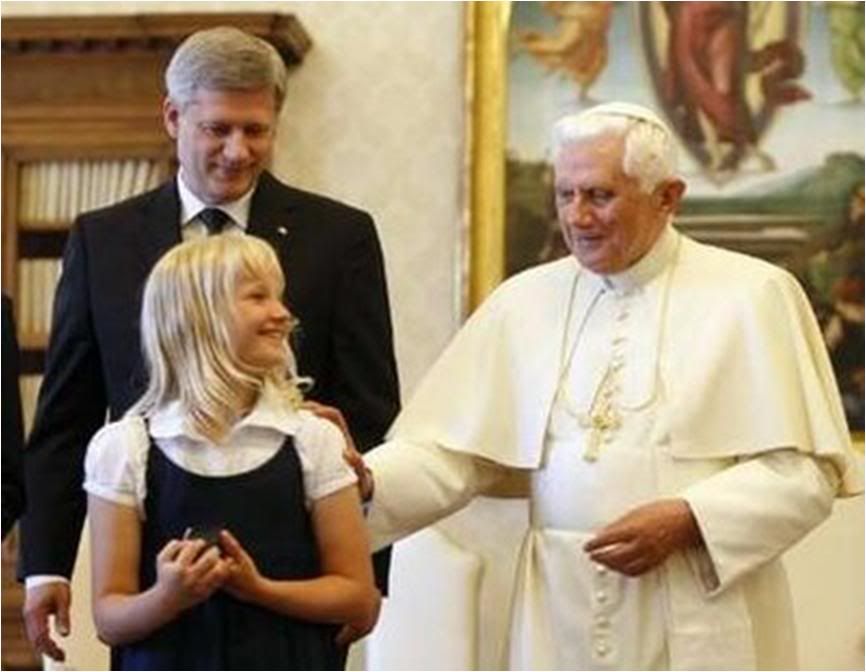
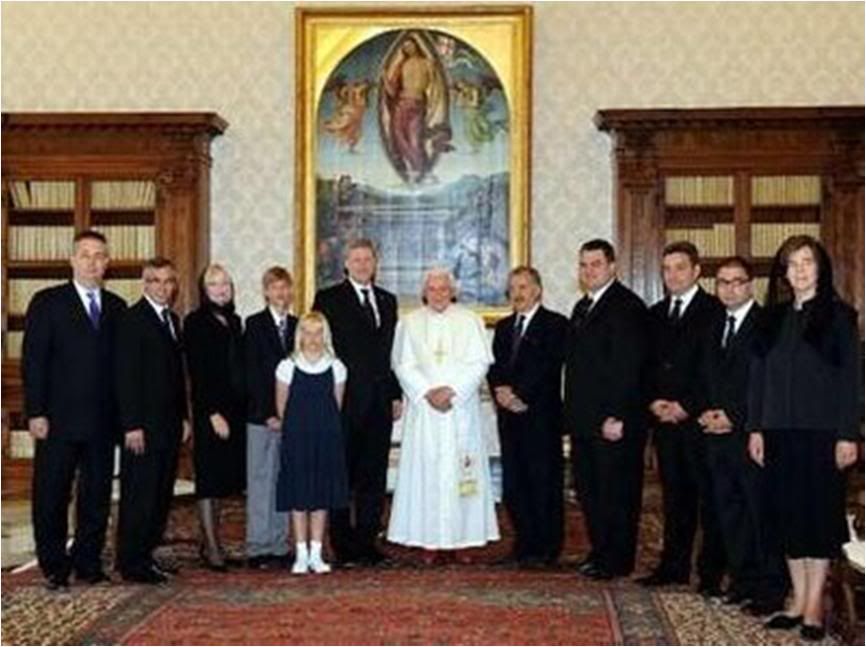
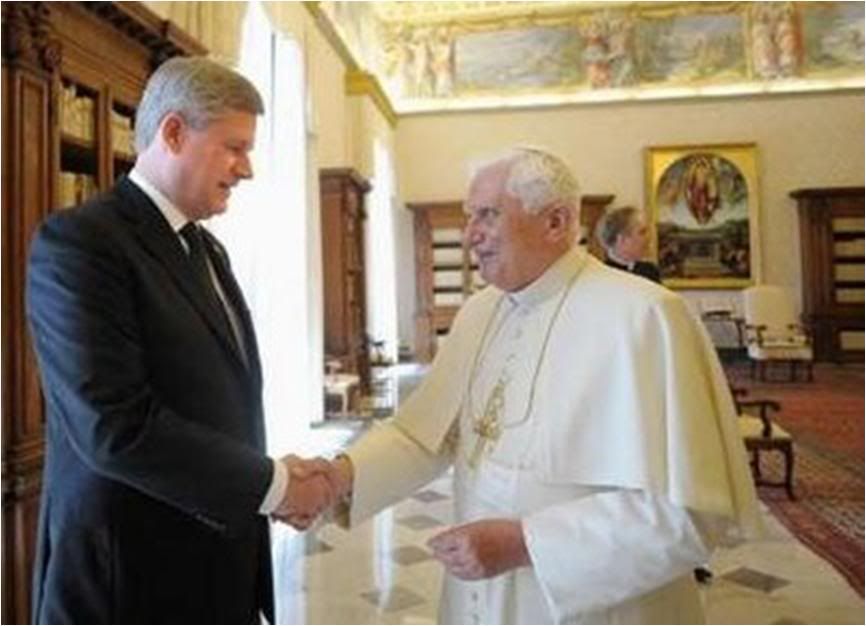 Benedict XVI is, among other things, a gracious host and a warm and joyous man. Prime Minister Stephen Harper of Canada should count himself lucky to have had an audience with the Pope that was almost as well covered photographically as the Pope's audience for Barack Obama yesterday.
Benedict XVI is, among other things, a gracious host and a warm and joyous man. Prime Minister Stephen Harper of Canada should count himself lucky to have had an audience with the Pope that was almost as well covered photographically as the Pope's audience for Barack Obama yesterday.
(With one notable difference: Harper's children were allowed to be photographed openly with the Pope. The Obama children, who were accompanied by their maternal grandmother and their governess, were not.)
The coverage of Harper and the resulting photographs are all the more remarkable because an embarrassing incident - that has many Canadian Catholics furious at what they consider Harper's profanation of the Host - had preceded this visit.
I did not post any of this which was well-followed by the Italian media because I have not had time to check out the Canadian media reporting on it. But it seems Harper, who is not Catholic, attended a Roman Catholic funeral service for a bishop, and then inexplicably joined the Communion line, took the host in his hand, and walked away without consuming it. Most reports say he put it in his pocket....
Whatever really happened, I am sure the Canadian ambassador to the Holy See must have worked overtime to clear up this embarrassment before Harper came visiting with his family and a delegation. The bishop who gave him the Host has come under criticism also because he has made statements that seem to shrug off the incident as 'no big deal'!
None of that embarrassment shows in the photographs, and we may assume Harper made the necessary amends to the Pope. (I am truly curious to know what his explanation was. I think he should have said, "I should never have gone up for Communion, I was not thinking, I didn't realize the implications, and I am truly sorry. Please forgive me.")
He came to the audience with wife Laureen and children Ben and Rachel, who will have a great 'show and tell' on 'what I did last summer'.
One other thing: Note how in the Vatican communique summing up Harper's visit, the question of 'ethical values, family and marriage' is the last item mentioned (though God knows Canada has perhaps even more alarming national attitudes against tradition in all these areas
than Americans)
It might be a measure of how grave the Holy Father considers the ethical pitfalls of the present US administration, never mind what spin the Catholic progressives are giddily putting on Obama's visit.
[Modificato da TERESA BENEDETTA 12/07/2009 15:47] |
| |
 11/07/2009 21:39 11/07/2009 21:39 |
|
| | | OFFLINE | | Post: 17.918
Post: 587 | Registrato il: 28/08/2005
Registrato il: 20/01/2009 | Administratore | Utente Senior | |
|
 THE POPE WITH EUROPEAN UNIVERSITY STUDENTS
THE POPE WITH EUROPEAN UNIVERSITY STUDENTS
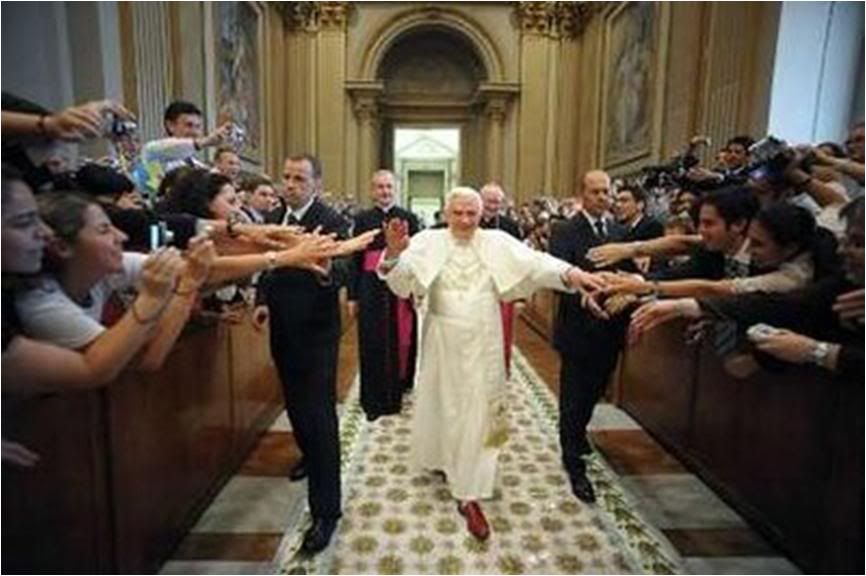
The hooly Father today addressed 1500 university students from 31 European nations participating in the first European Encounter of Unviersity Students organized by the Commission on Catechism and Education of the Council of European Episcopal Conferences known by its acronym in Latin, CCEE.
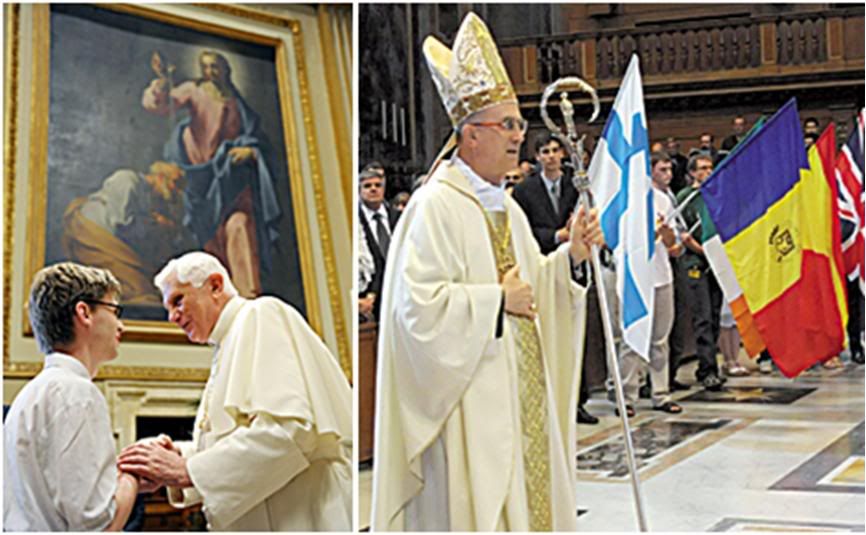
In the morning, the students attended Mass at St. Peter's basilica celebrated by CArdinal Tarcisio Bertone.
The meeting was organised by the Office for Pastoral Care in Universities of the Vicariate of Rome, in the context of the CCEE's Catechesis-School-University Commission (CSU) University Department activities, in partnership with the Italian Ministries of Education, University and Research; of Foreign Affairs; and of Youth.
The event Began July 6-8 when the students were hosted in the campuses of Milan, Padua, Venice, Florence, Bologna, Perugia and other locations, where they met with university chaplaincies coordinated by the National Office for Education, School and University of the Italian Bishops´ Conference (CEI).
They converged in Rome Thursday for the actual discussion session on three general topics: Youth and Hope in Europe; Youth and New Life in Europe; Youth and intellectual Charity.
The highlight of the event was today, on the Feast of St Benedict, Patron Saint of Europe, with Mass at St. Peter's and an audience with the Pope.
{ Pope's address to be translated)
[Modificato da TERESA BENEDETTA 11/07/2009 21:41] |
| |
 12/07/2009 15:33 12/07/2009 15:33 |
|
| | | OFFLINE | | Post: 17.919
Post: 588 | Registrato il: 28/08/2005
Registrato il: 20/01/2009 | Administratore | Utente Senior | |
|
[Modificato da TERESA BENEDETTA 12/07/2009 21:08] |
| |
 12/07/2009 15:34 12/07/2009 15:34 |
|
| | | OFFLINE | | Post: 17.920
Post: 589 | Registrato il: 28/08/2005
Registrato il: 20/01/2009 | Administratore | Utente Senior | |
|

July 12
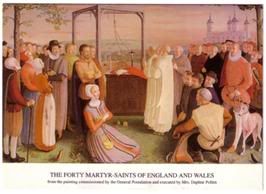 Saints John Jones (Wales, 1530-1598) and
Saints John Jones (Wales, 1530-1598) and
John Wall (England, 1620-1659)
Franciscans and Martyrs
OR today.

Benedict XVI receives US President Barack Obama in audience
A cordial meeting
At the center of talks was the defense and promotion of life, the challenges for the future, and the progress of peoples
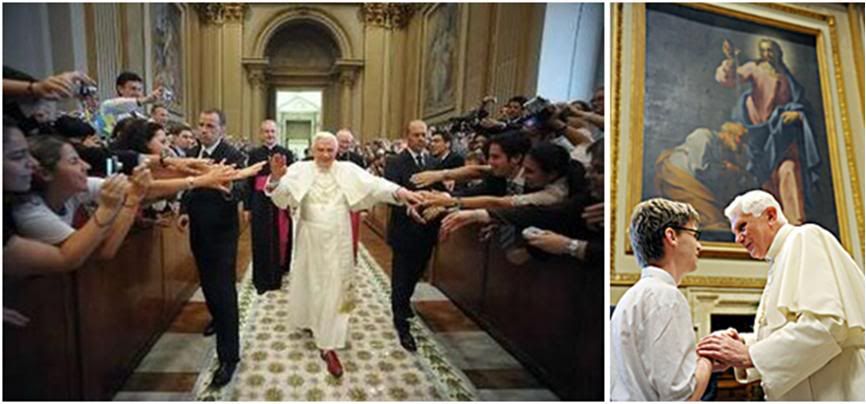 Other Page 1 stories: The Pope meets with Canadian prime Minister Stephen Harper (right photo, top panel); the Pope meets with European university students and tells them the desire to find God should be reborn in the classrooms; an editorial commentary by Ettore Gotti Tedeschi on Caritas in veritate - 'Even Machiavelli would have agreed with the Pope'; a commentary on why the G8 cannot 'die' despite continuing talks of its demise - there is no other mechanism right now for what it does (or tries to do); and Israel says it will not retreat from the Golan Heights even in an agreement with Syria.
THE POPE'S DAY
Angelus today
Other Page 1 stories: The Pope meets with Canadian prime Minister Stephen Harper (right photo, top panel); the Pope meets with European university students and tells them the desire to find God should be reborn in the classrooms; an editorial commentary by Ettore Gotti Tedeschi on Caritas in veritate - 'Even Machiavelli would have agreed with the Pope'; a commentary on why the G8 cannot 'die' despite continuing talks of its demise - there is no other mechanism right now for what it does (or tries to do); and Israel says it will not retreat from the Golan Heights even in an agreement with Syria.
THE POPE'S DAY
Angelus today - The Holy Father gives a brief and absolutely beautiful synthesis of the message
in Caritas in veritate; he asks for prayers for the people of Honduras who are undergoing
a government crisis; and he bids 'Arrivederci' to Rome as he leaves for his annual summer vacation
tomorrow in Val D'Aosta, asking us all to pray for him.
|
| |
 12/07/2009 16:24 12/07/2009 16:24 |
|
| | | OFFLINE | | Post: 17.921
Post: 590 | Registrato il: 28/08/2005
Registrato il: 20/01/2009 | Administratore | Utente Senior | |
|
 ANGELUS TODAY
ANGELUS TODAY
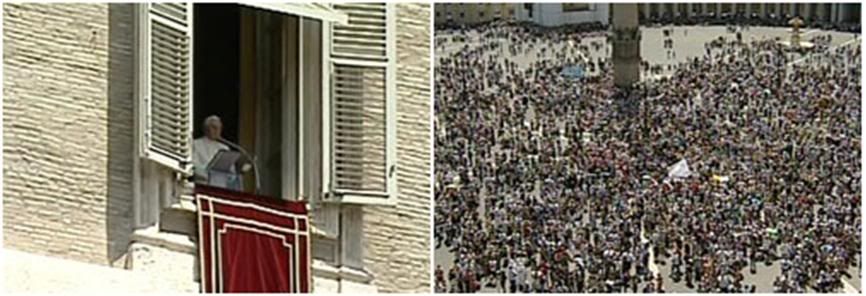 Here is what the Holy Father said in English today. For once, it does not touch on the main themes he spoke about in his main messages before and after the prayers:
Here is what the Holy Father said in English today. For once, it does not touch on the main themes he spoke about in his main messages before and after the prayers:
I am pleased to greet the English-speaking visitors here today.
I know that some of you have come from as far away as Sydney, Australia, and I extend a particular welcome to you, remembering the joyful celebration of World Youth Day in your city almost exactly a year ago.
To all who are on pilgrimage or on holiday at this time, I offer the assurance of my prayers that you will find refreshment in body and spirit and an opportunity to draw closer to the Lord in prayer and thanksgiving.
May God bestow his blessings of joy and peace upon all of you, and upon your families and loved ones at home.
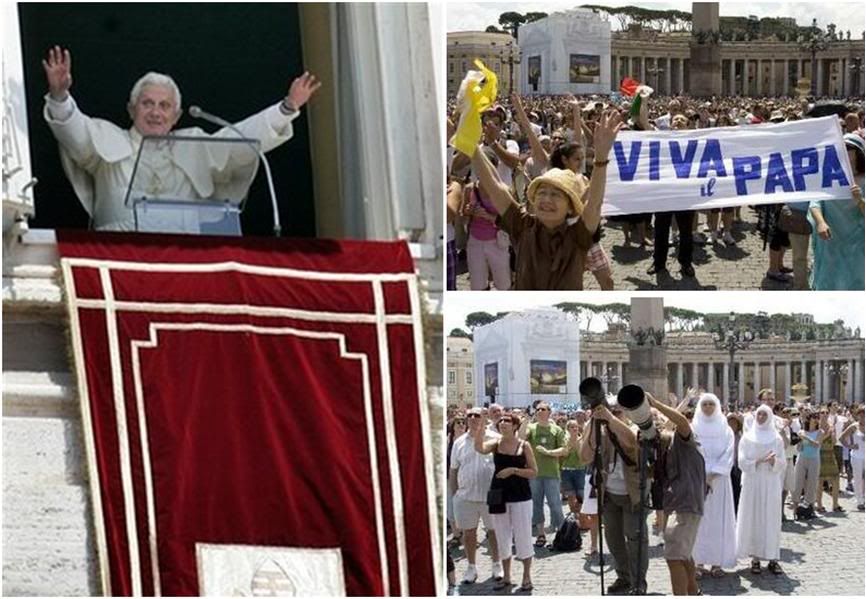
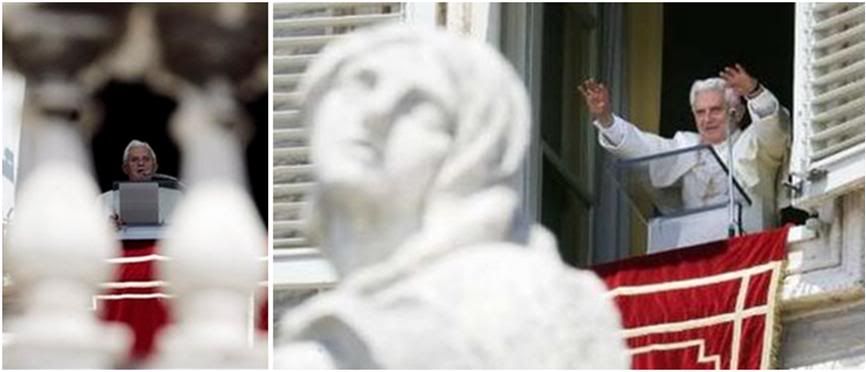
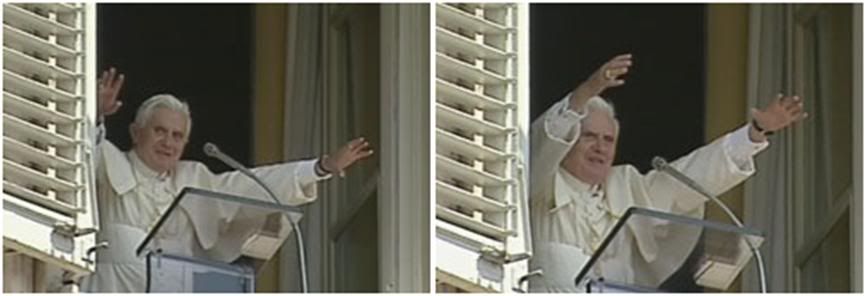 Here's a full translation of the Holy Father's words at Angelus today:
Here's a full translation of the Holy Father's words at Angelus today:
Dear brothers and sisters,
In the past days, the attention of everyone was on the G8 summit which took place in L'Aquila, the city that was sorely tested in the recent earthquake.
The problems on their agenda were dramatically urgent. There are social inequalities and structural injustices in the world that are no longer tolerable - and which require, beyond immediate dutiful intervention, a coordinated strategy for seeking solutions that are durable on the global level.
During the Summit, the heads of state and government of the G8 nations reiterated the need to reach common agreements to assure humanity of a better future.
The Church does not possess technical solutions to present, but, as an expert in humanity, it offers to everyone the teaching of Sacred Scripture on the truth about man and announces the Gospel of Love and justice.
Last Wednesday, commenting at the General Audience on the encyclical Caritas in veritate, which was published precisely on the eve of the G8 summit, I said that "a new economic projection is needed that redesigns development in a global manner, based on the fundamental ethic of responsibility before God and before the human being as a creature of God".
This is because, as I wrote in the encyclical, "in an increasingly globalized society, the common good and the effort to obtain it cannot fail to assume the dimensions of the whole human family" (No. 7).
The great Pontiff Paul VI, in the encyclical Populorum progressio, had recognized and described the worldwide horizon of the social question.
Following in the same path, I felt it was necessary to address Caritas in veritate to the same question, which in our time has become "a radically anthropological question [i.e., man-centered], in the sense that it implies the very way of conceiving the human being who is increasingly in the hands of man himself and the new biotechnologies (cfr ibid No. 75).
The solutions to the present problems of mankind cannot be merely technological, but they should consider all the needs of a person, who is gifted with both body and soul, and therefore, such solutions should consider the Creator, God.
Indeed the 'absolutism of technology' - which finds its maximum expression in practices contrary to life - might well design dark scenarios for the future.
Actions which do not respect the true dignity of the person - even when motivated by a 'choice of love' - are really the fruit of a 'material and mechanistic concept of human life' which reduces love without truth to "an empty shell to be filled in an arbitrary way" (cfr No.3) and can therefore be negative to integral human development.
As complex as the present situation in the world is, the Church looks at the future with hope, reminding Christians that "the announcement of Christ is the first and principal factor for development".
Today, in the Collect of the Mass, the liturgy invites us to pray: "Grant us, oh Father, that we may hold nothing dearer than your Son, who reveals to the world the mystery of your love and the true dignity of man".
May the Virgin Mary obtain for us that we may walk on the path of development with all our heart and our intelligence, "that is to say, with the ardor of charity and with the wisdom of truth" (cfr No. 8).
After the prayers, he said this:
I have been following the events in Honduras these days with great concern. I wish today to ask you to pray for that dear nation, so that, through the maternal intercession of Our Lady of Suyapa, the authorities and all its inhabitants may follow patiently the path of dialog, of reciprocal understanding and of reconciliation.
This is possible, if everyone - overcoming their particular tendencies - tries to seek the truth and tenaciously pursue the common good: this is the condition for assuring peaceful coexistence and authentic democratic life.
To the beloved people of Honduras, I assure my prayers and impart a special Apostolic Blessing.
Tomorrow, God willing, I will leave for a brief rest period in the mountains. I will be going to Les Combes in Val D'Aosta, a place made famous by the many sojourns of my beloved predecessor John Paul II, and a place that I too love.
In saying 'Arrivederci' to St. Peter's Square and to the city of Rome, I ask you all to accompany me with your prayers. Prayer does not recognize distance and separation - wherever we are, it makes us all one heart and one spirit.
On the subject of vacations, I take the occasion to reiterate once more the duty of everyone to observe prudence in driving and respect for the rules of the road. A good vacation begins with this!
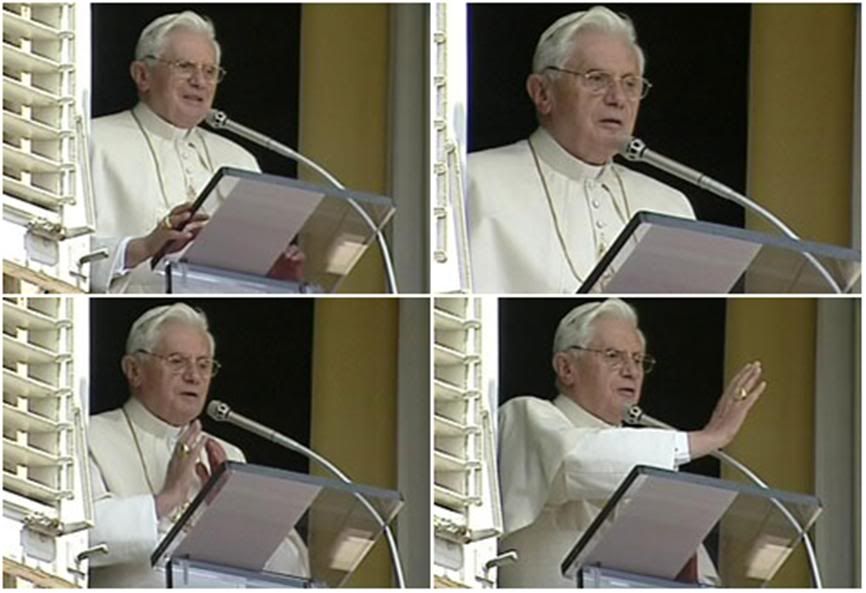
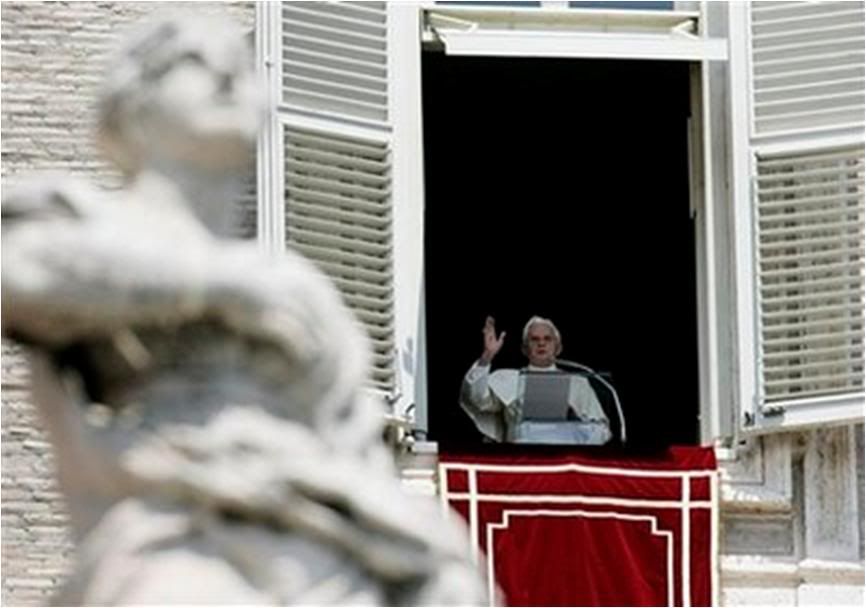
[Modificato da TERESA BENEDETTA 12/07/2009 17:40] |
| |
 12/07/2009 21:08 12/07/2009 21:08 |
|
| | | OFFLINE | | Post: 17.922
Post: 591 | Registrato il: 28/08/2005
Registrato il: 20/01/2009 | Administratore | Utente Senior | |
|

 Because of the newspaper's peculiar deadline, we had to wait 24 hours before getting L'Osservatore Romano's account of the meeting between the Holy Father and President Obama. This time, editor Giovanni Maria Vian toes his 'publisher's' (the Pope's) line on the primacy of life issues in any dialog that the Church undertakes.
Because of the newspaper's peculiar deadline, we had to wait 24 hours before getting L'Osservatore Romano's account of the meeting between the Holy Father and President Obama. This time, editor Giovanni Maria Vian toes his 'publisher's' (the Pope's) line on the primacy of life issues in any dialog that the Church undertakes.
Still, the sub-headline was somewhat skewed to make it appear that 'the challenge of the future and the progress of peoples' had been treated separately from the life issues - an account which is clearly contradicted by the first sentence of the story itself.
As the issue only used one photo of the visit, I have posted here the appropriate photos from the news agencies, courtsy of Yahoo's newsphoto service, to illustrate the story.
A CORDIAL MEETING:
Benedict XVI receives US President Obama in audience;
At the center of their talks - the defense and promotion of life,
the challenge of the future and the progress of peoples
Translated from
the 7/12/09 issue of
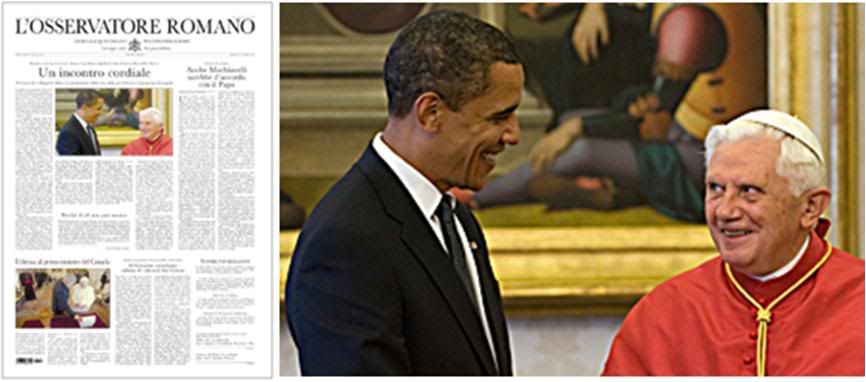
"The defense and promotion of life and the right to conscientious objection" were the principal questions "in the interests of all and which constitute a great challenge for the future of every nation and for the true progress of people".
For this reason, these issues were at the center of the 40 minutes of 'cordial conversation' between Benedict XVI and the President of the United States, Barack H. Obama, at the Vatican on Friday afternoon, July 10.
The official communique of the Holy See's Press Office says that
"reference was also made to immigration with particular attention to the matter of reuniting families".
The meeting focused as well upon "matters of international politics, especially in light of the outcome of the G8 Summit", which had ended in L'Aquila a few hours before the meeting.
The conversation also dealt with "the peace process in the Middle East, on which there was general agreement, and with other regional situations".
Certain current issues were then considered, such as "dialogue between cultures and religions, the global economic crisis and its ethical implications, food security, development aid especially for Africa and Latin America, and the problem of drug trafficking".
Finally, the communique concludes, "the importance of educating young people everywhere in the value of tolerance was highlighted".
The entire audience lasted for a bit over an hour, in a climate of cordiality, with smiles, handshakes and a few sentences caught by newsmen during the photo opportunity.
Vatican press director Fr. Federico Lombardi told nessman later that Obama assured the Pope of his personal commitment to reduce the number of abortions in the United States. [How can that be done if the administration advocates abortion as a human right and Obama himself does not see anything wrong with late-term abortion or even with partial birth abortion?]
This is an issue, along with bioethical questions, that rightly concerns the bishops and Catholics of the United States as well as the Holy See, Lombardi said.
He said the visit was positive and that the Holy Father found it satisfactory.
Arriving a few minutes after 4 p.m. at the Cortile San Damaso in a black limousine, Pres. Obama was welcomed by Archbishop James Harvey, prefect of the Pontifical Household, who is American.
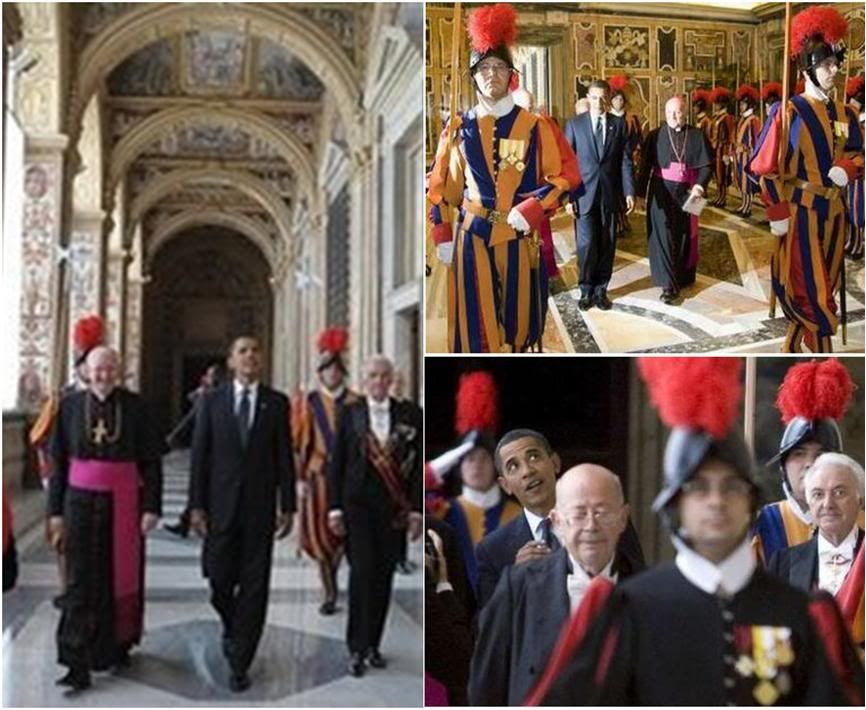
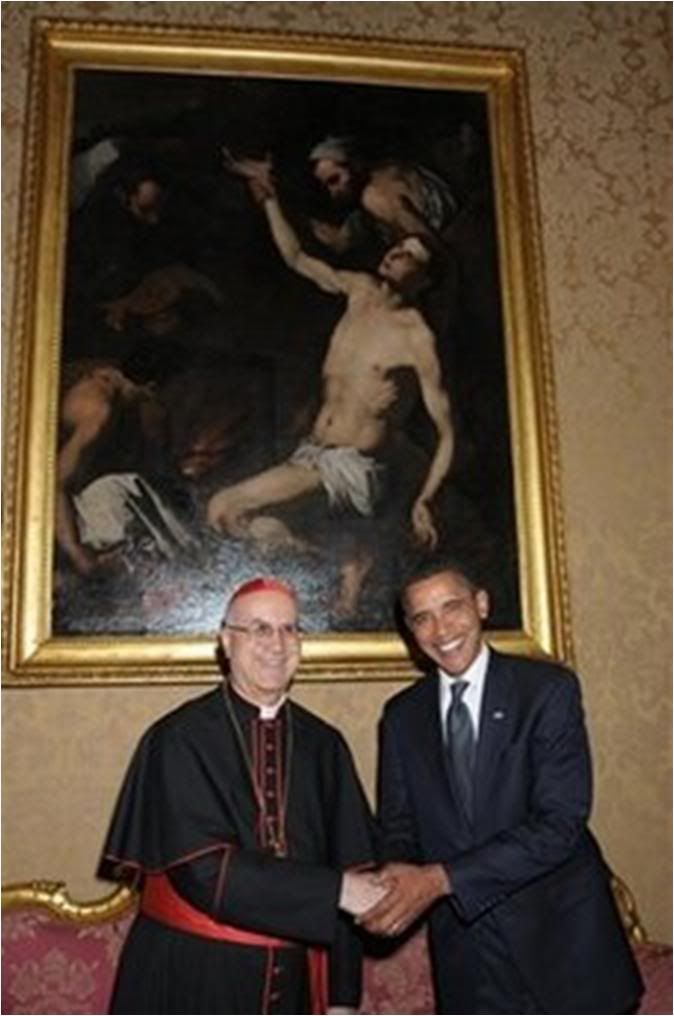
Inside the Apostolic Palace, the President first met with Secretary of State, Cardinal Tarcisio Bertone, in the Sala d'Angolo, along with Mons. Dominique Mamberti, secretary for relations with other states.
Also present were Mons. Nwachukwu, chief of protocol at the Aecretariat of State; Mons. Brian Wells, head of the English section, also American; Mons. Gualtieri, responsible for the US desk; and Mons. Piechota, Cardinal Bertone's secretary.
Cardinal Bertone gave the President a copy of the polyglot Bible which was published on the occasion of the Bishops' Synod assembly on the Word of God last October, as well as engraved prints showing the fountains of the Vatican.
The President then proceeded to the Second Loggia, where he was welcomed by the Pope at the door leading to his private library.
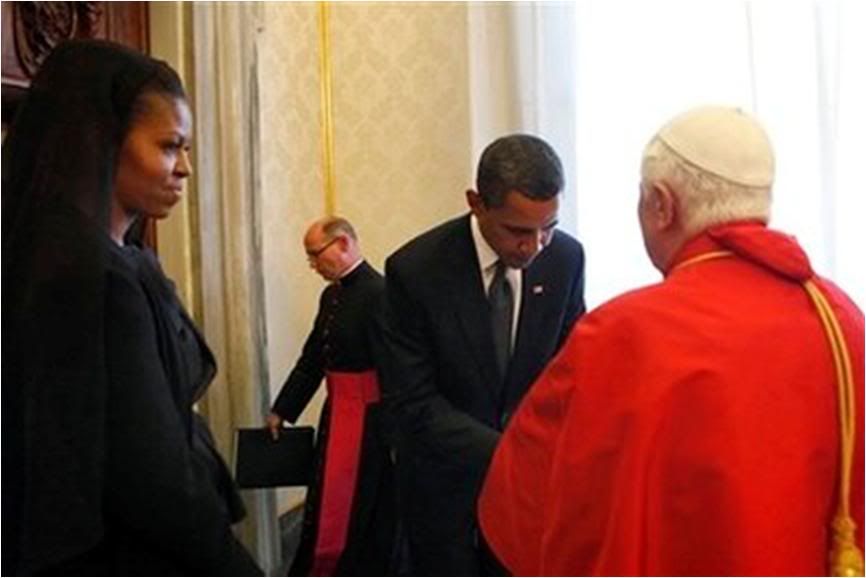
"It is a great honor for me", the President said in response to the Pope's greeting.
The Pope asked him about the recently-concluded G8 summit, and he answered that they were very productive and concrete, and that the G8 leaders had pledged $20 billion to fight hunger.
After their private meeting, the Pope then greeted the President's wife Michelle and their daughters Malia and Sasha, along with Michelle's mother Marian Robinson. This meeting was not open to the news cameras.
The doors to the private library reopened for the presentation of gifts and the introduction of the President's delegation.
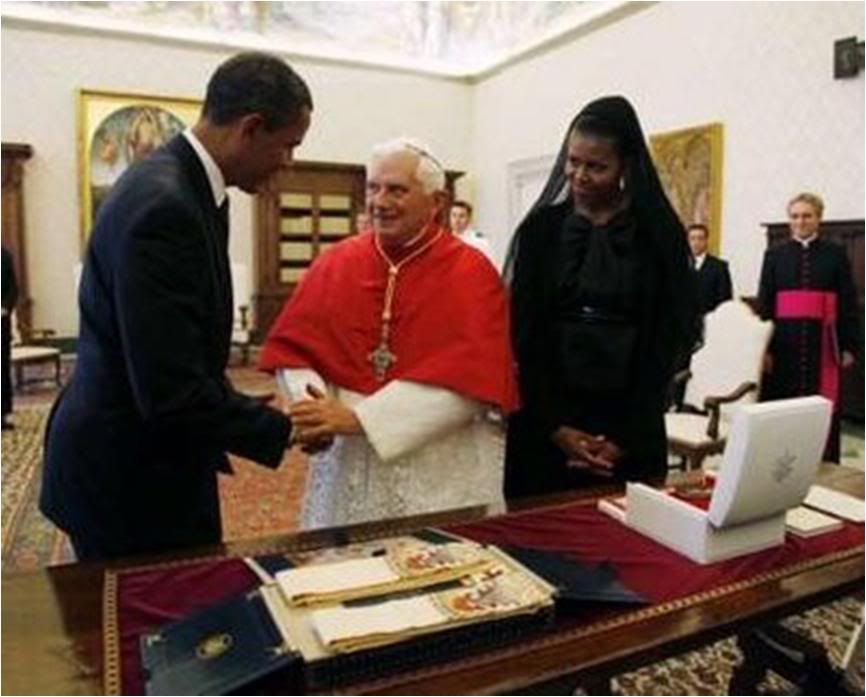
Obama presented the Pope with the liturgical stole that had been placed for the past 18 years on the remains of St. John Neumann in the Philadelphia shrine dedicated to the first US bishop to be canonized.
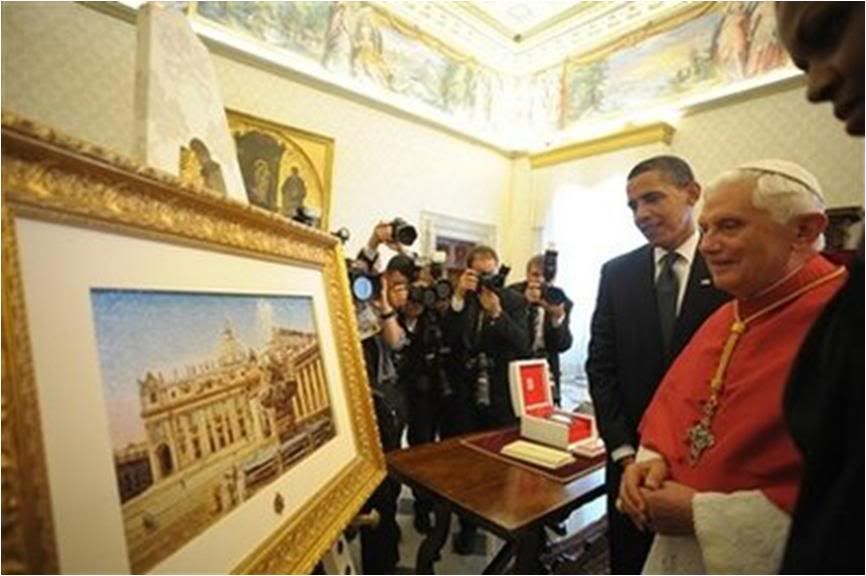
Besides the prepared gifts from the Pope - a mosaic showing St. Peter's Basilica and the Apostolic Palace, an autographed copy of Caritas in veritate, medals of the Pontificate and rosaries - Benedict XVI also gave the President a copy of the Instruction Dignitas personae issued by the Congregation for the Doctrine of the Faith last year to update and clarify the Church's positions on a wide range of bioethical issues.

"We spoke about this," the President commented upon getting it.
Later, the Pope's private secretary, Mon. Georg Gaenswein, told journalists that the document "could help the President to better understand the positions of the Catholic Church".
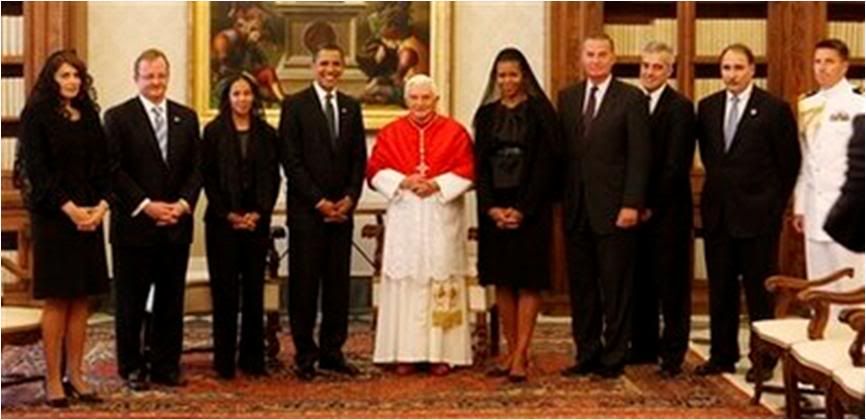
Finally, the Pope greeted the President's delegation, assuring them of his prayers and blessings.
Obama said farewell by expressing the hope for fruitful relations between the Holy See and the United States.
[The account inexplicably omits reporting the Pope's parting words: "I am praying for you and for the United States", which newsmen and photographers heard.]
Previously, while the President was meeting with the Pope, the American First Lady and her two daughters were entertained by representatives of the Secretariat of State, among them, Mons. Camilleri, secretary to Mons. Mamberti.
The two girls were presented with gifts from Cardinal Bertone: a jigsaw puzzle of the Last Judgment in the Sistine Chapel for the younger girl, Sasha; and a watch and an illustrated book on the Vatican Museums for Malia; and for both, a cap with the Pope's coat of arms.
The First Lady and her daughters also had a chance to tour St. Peter's Basilica where they paid a visit to John Paul II's tomb and climbed to the top of Michelangelo's dome, and then visited the Sistine Chapel. These are the only two pictures I have seen about their visit so far.
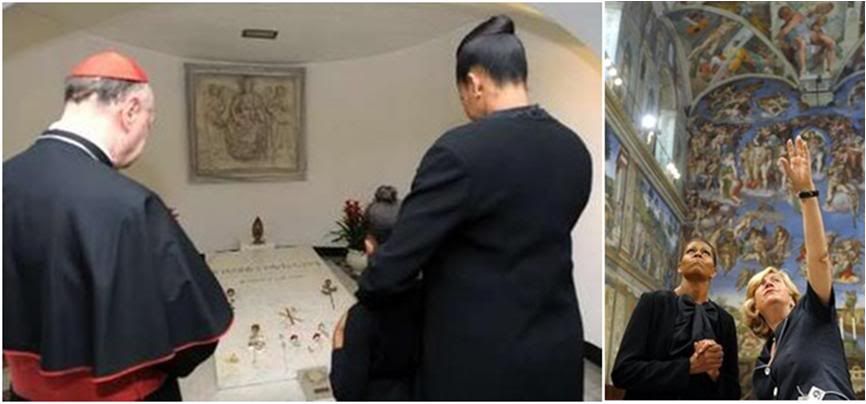 And since we have not been shown pictures of the girls meeting with the Pope, pictures taken of the family as they prepared to board the plane for Ghana right after their visit to the Vatican shows that even the daughters were dressed in black for the Pope. I bet he personally would like children to wear bright colors:
And since we have not been shown pictures of the girls meeting with the Pope, pictures taken of the family as they prepared to board the plane for Ghana right after their visit to the Vatican shows that even the daughters were dressed in black for the Pope. I bet he personally would like children to wear bright colors:
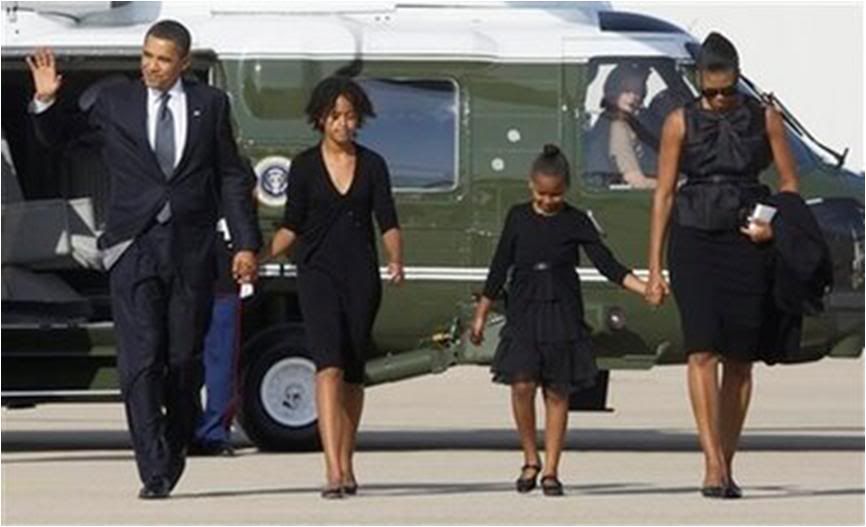
 The front-page news story was the only item in the issue about the visit. There was no editorial from Mr. Vian [What could he say, afetr all - "Gee, I am sorry I read it all wrong"?], and there were no other pictures other than the front-page photo. So much, I hope, for Mr. Vian's efforts to make the OR a cheering squad on behalf of Barack Obama on any issue!
The front-page news story was the only item in the issue about the visit. There was no editorial from Mr. Vian [What could he say, afetr all - "Gee, I am sorry I read it all wrong"?], and there were no other pictures other than the front-page photo. So much, I hope, for Mr. Vian's efforts to make the OR a cheering squad on behalf of Barack Obama on any issue!
Someone who tells things as they are, without any delusion or illusion but with healthy realism, is Elizabeth Lev, who I am glad now has a chance to write regularly on things other than art and art history.
I should think her views are necessarily - and felicitously - colored by the fact that she is the daughter of Ambassador Mary Ann Glendon (president of the Pontifical Academy of Social Sciences) who, among other things, famously turned down Notre Dame's Laetare award that would have been given to her at the same time as the honorary degree to Obama.
She is probably the only orthodox Catholic in the stable of POLITICS DAILY, AOL's predictably liberal online journal [AOL is part of the TIME-Warner conglomerate], the other Catholic being David Gibson, whom I consider treacherous to both the Church and particularly, to Benedict XVI in the post-conclave biography that Gibson wrote.
Lev wrote this piece on the day of the meeting but before we knew what had taken place.
Barry and Benedict meet
in the land of Caesars and martyrs
by ELIZABETH LEV

July 10, 2009
ROME - In the land of Caesars and martyrs, the 44th President of the United States on Friday met the 264th successor of St. Peter.
Much ado surrounded this historic meeting, particularly among American Catholics, some of whom perceive this encounter as a celebrity death match of epic proportions.
The fact is that through the 2,000-year-old Christian presence in the Eternal City, there have been many more troubling meetings.
St. Peter met Nero (ended badly) Gregory VII met the Holy Roman Emperor Henry IV (ended badly) and the list goes on. So after sacks, murders and kidnappings, what was there to fear?
The tension around this meeting had nothing to do with the military might of the U.S. or its economic prowess dwarfing the little David of the Vatican. American Catholics were terrified of something more insidious to their community - ambiguity. [At least the orthodox Catholics - not the cafeteria Catholics behind Obama who would like nothing more than ambiguity about the Catholic identity. They think Catholics should be politically correct and homogenize themselves with everybody else.]
Since his election, President Obama has played a hard and fast game with Catholic teaching. Placing in high positions several Catholics who publicly flout church teaching, he has rewarded those who compromised belief by catering to constituents, leaving the few who hold fast to the repeated emphasis of John Paul II and Benedict XVI on the sanctity of human life increasingly isolated.
One week before his meeting with the Pope, Obama sat down with eight U.S. Catholic journalists and outlined his agenda for the meeting.
"He said that it would be a great honor to meet the Pope and was looking forward to talking about the Middle East, climate change and immigration," reported the National Catholic Register.
After the Notre Dame controversy, when 80 of the 258 bishops openly protested a Catholic university's invitation to a President with the most permissive track record toward abortion in history, thinking that life issues are off the agenda might be a tad ingenuous.
The Pope also released a 79-point document called "Charity in Truth," outlining his own talking points regarding modern social issues. While the economic crisis and aid to poverty-stricken areas are very much on his mind, the pope resolutely remains fixed on the question of protection of human life from conception to natural death.
Obama acts like the perfect "cafeteria Catholic" [including going to church only when he pleases and not as an religious obligation].
Picking among the many offerings, he invariably selects divisive citations like those of the Chicago Cardinal Joseph Bernardin's "seamless garment" project (that Catholics should adopt a consistently pro-life ethic, and not limit themselves to combating abortion), as he attempts to bury abortion among many other issues, treating the murder of hundreds of thousands of innocent children as morally equivalent to welfare reform and immigration law.
Cardinal Bernardin, who died in 1996, himself rebutted that interpretation in a 1988 interview. "I don't see how you can subscribe to the consistent ethic and then vote for someone who feels that abortion is a 'basic right' of the individual," he said.
On the other hand, Obama never cites Pope John Paul II, who reigned for 25 years of his 48-year existence, or Cardinal Francis George, the archbishop of Chicago for the last 12 years and head of the U.S. bishops' conference, who has tirelessly worked to defend the sanctity of human life.
After all of the President's smoke and mirrors with Catholic causes, papal adherents fear that the meeting focused on Iran and ozone while the big white elephant of abortion stood noiselessly in the corner. [Well, that fear was unjustified, it turns out, and we Catholics should have more faith in the steadfastness of Benedict XVI to the doctrine of the faith. Did we really expect him to be anything less than emphatic and firm about the issue of life when facing the most powerful man in the world?
But the President also seemed to suffer from some apprehensions about the meeting. He put off meeting Benedict until the 11th hour, a delay bordering on rudeness to a fellow head of state.
Then, he requested an encounter during afternoon hours when the Pope never takes meetings, almost as if to force the Pope to refuse Obama. But he didn't. The Vatican showed its ability to "change" by consenting to a 4 p.m. sit-down.
The President did have two reasons to be concerned. One is that he knew he would be meeting a real man of God, not one shopping around for a church. For Benedict, it is all about the immortal soul.
Plus, if Obama believes the mainstream press, coming face to face with the man dubbed "God's Rottweiler" must have been a bit daunting.
The private meeting lasted 25 minutes, almost doubling the scheduled 15, and took place behind closed doors with no outsiders present. One thing is certain, there was to be no scolding, no barking from the "German shepherd."
Obama's forceful personality undoubtedly made itself felt as he spoke to the Pope about the points they have in common and explained his take on the U.S. situation. Benedict, most likely, simply listened. He is not one to scold, he teaches gently and with simple clarity.
The issue of abortion was certainly addressed, but without menacing tones. The Pope is capable of surprising by not barking, just blessing.
At this point, the question becomes what spin the administration will put on things. One hopes it won't emulate Nancy Pelosi's gaffe of relating an entirely different story than the Vatican press office after her meeting with the Pope.
There is little to fear (or expect) from this meeting; it is merely an introductory step to allow each leader to get beyond the endless distortions of the press and size up one another.
Benedict met and befriended President Bush in the midst of the Iraq maelstrom, so perhaps we can hope for another small miracle in the encounter with Obama; after all, the Vatican has been known to produce a prodigy or two.
 Well, Ms. Lev got all of it right, except neither she nor any of us anticipated Benedict XVI's genuinely dramatic coup de theatre - giving Obama a copy of Dignitas Personae to drive home his message, and making sure the gesture was not missed by anyone. To his credit, even Obama did not.
Well, Ms. Lev got all of it right, except neither she nor any of us anticipated Benedict XVI's genuinely dramatic coup de theatre - giving Obama a copy of Dignitas Personae to drive home his message, and making sure the gesture was not missed by anyone. To his credit, even Obama did not.
Not even that master of the dramatic gesture, John Paul II, thought of giving George W. Bush a copy of the Catechism of the Catholic Church with the section on 'just war' encircled in red, when he catechized him against the Iraq war.
More than anything, that gift from Pope Benedict is the best answer to the 'laissez faire' Catholic supporters of Obama, including the promoters, cheerleaders and defenders of the NoTre Shame honorary degree.
The Pope did have his public say, after all, in the best of all circumstances - with Obama coming to the Vatican, where the Pope can put his foot down for all the world to see, as he did this time, even with wayward editors and functionaries of the Secretariat of State.
Insofar as spin, I have not seen any from the Obama press people so far. The blog about the meeting posted on the White House website was entitled simply 'A photo-essay on teh meeting at the Vatican' and carried four photos taken by the White House photographer. No text.
Not so the liberal media, who have to stand by their own script, no matter what {"Gee! We can't afford to be proven wrong about anything!"), as someone from the Creative Minority Report notes in the ff. item. (To those like me who are not up-to-date on Web lingo, BFF means 'best friends forever' - I had to Google it - which is one of those shortcuts used in the social network sites.)
NYT: Pope and Obama BFF's
Posted by Matthew Archibold
 [Note the pciture of the young Fr. Ratzinger in the CMR banner!]
[Note the pciture of the young Fr. Ratzinger in the CMR banner!]
July 11, 2009
The New York Times thinks Pope Benedict and President Obama aren't gonna' let a little thing like the death of millions of babies get in the way of their budding BFF-ness.
The Times says the Pope, unlike crazy American Catholics, is willing to see abortion and embryonic stem cell research as just one teeny issue among many. Of course, the story belies reality.
President Obama received a warm welcome at the Vatican on Friday in his first meeting with Pope Benedict XVI.
Indeed, the Vatican has generally seemed more eager to form a relationship with Mr. Obama than many American bishops, who have been cooler because he differs from the church on abortion and other reproductive issues.
The invitation Mr. Obama received to deliver the commencement speech at the University of Notre Dame, for instance, triggered strong public condemnation from conservative bishops.
Why does the American Catholic leadership seem to be focused on abortion, while the Vatican appears willing to view that issue as merely one among many on which to judge a political leader?
I'm sorry, did the Pope hand Obama a book on how to stimulate the economy? No.
Did the Pope hand Obama a book about how to get our troops out of the Middle East? Nope.
The Pope handed Obama a booklet explaining the Vatican's opposition to practices such as abortion and embryonic stem cell research.
So it doesn't seem like the Pope treated it as one issue among many. Maybe that was only the media.
 The citation from the Times is actually the tendentious lead-in to an online written forum they had about 'the visit',
The citation from the Times is actually the tendentious lead-in to an online written forum they had about 'the visit',
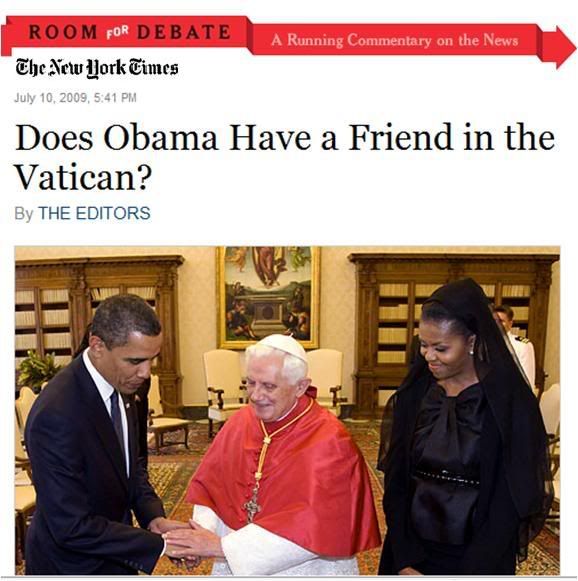
roomfordebate.blogs.nytimes.com/2009/07/10/does-obama-have-a-friend-in-the-vatic...
written by three wholly predictable liberals/cafeteria Catholics - the ubiquitous John Allen; Fr. James Martin, SJ, of America magazine; and Cathleen Kaveny, a professor of law and theology, whom I will never forget for writing, shortly after the April 2005 Conclave, a nasty recollection about meeting Cardinal Ratzinger (he wasn't nasty, of course - she was just offended by his views!), and in this forum, she makes it appear that the Pope's 'warm welcome' for Obama is a repudiation of the pro-life Catholic bishops; and one orthodox Catholic.
Colleen Carroll Campbell, a reliably orthodox Catholic who writes widely and has a regular show on EWTN, is the only one who does not join the chorus. I am posting Ms. Campbell's piece for the record:
The chasm is there
by Colleen Carroll Campbell
Ms. Campbell is a fellow at the Ethics and Public Policy Center, the author of The New Faithful: Why Young Adults Are Embracing Christian Orthodoxy and host of “Faith & Culture,” a TV and radio show that airs on EWTN.
Given President Barack Obama’s recent clashes with American bishops and pro-life Catholics, it’s understandable that his administration has sought to cast today’s meeting with Pope Benedict XVI as evidence of a papal endorsement.
In reality, Benedict’s decision to welcome President Obama for a 25-minute encounter in the papal library is hardly remarkable.
It’s unsurprising that Benedict would welcome an opportunity to chat face-to-face with the leader of the world’s sole remaining superpower.
He did the same with President George W. Bush three times, most recently in 2008, when Benedict took the unusual step of welcoming Mr. Bush to the Vatican Gardens, a site traditionally reserved for intimate meetings with friends.
Just because the Pope met with Obama doesn’t mean they see eye to eye.
As with George W. Bush, Benedict can find points of convergence between his priorities and those of President Obama.
But the points of divergence between the two men — namely, on the “life issues” of abortion, embryonic research and euthanasia — are more fundamental than his differences with George Bush. [Cardinal Ratzinger opposed the war in Iraq, but once it was a fait accompli, he, like any right-thinking person, has only wanted things to go well with Iraq's fledgling democracy, and being the Pope, especially for its tiny Christian minority.]
As the future Pope explained in a letter to Cardinal Theodore McCarrick during the 2004 election, the defense of innocent human life from conception to natural death is a non-negotiable moral imperative in the eyes of the Church.
“Not all moral issues have the same moral weight as abortion and euthanasia,” he wrote. “There may be a legitimate diversity of opinion even among Catholics about waging war and applying the death penalty, but not however with regard to abortion and euthanasia.” [American Catholics who are pro-Obama have tended to overlook - or prefer to ignore - this statement.]
Anyone who regards focus on the life issues as a peculiar concern of American bishops should read Benedict’s new encyclical, Charity in Truth, which he presented to President Obama on Friday, along with a Vatican document on bioethics.
Although intended to address the global economic crisis, the encyclical includes nearly a dozen passages reiterating Catholic teaching that the right to life of the innocent human person — both born and unborn — is the foundational principle upon which all other social policy must rest.
Benedict’s meeting with President Obama cannot erase the deep chasm that exists between them on the question of which human lives deserve protection. That chasm was not created by the American bishops, and it cannot be repaired by mere photo ops or facile talk of “common ground.”
 BTW, I object to the title given to the mini-forum, "Does Obama have a friend in the Vatican?" It's based on the wrong premise used by the usual partisan mentality, which cannot be applied to the Pope, of all people. As a Christian, and as a head of state, he must be friendly with everyone.
BTW, I object to the title given to the mini-forum, "Does Obama have a friend in the Vatican?" It's based on the wrong premise used by the usual partisan mentality, which cannot be applied to the Pope, of all people. As a Christian, and as a head of state, he must be friendly with everyone.
Although he constantly and consistently proposes Catholic doctrine, as he must, he knows very well it cannot be imposed on individuals and governments who may think differently.
That doesn't mean he stops showing respect and cordiality to those who oppose Church teaching in any way - and so yes, Obama does have a friend in the Vatican, as do French President Sarkozy and Italian Prime Minister Berlusconi, whose own personal conduct (and that of their wives) may be morally questionable, and even Hugo Chavez who has been received by Benedict XVI at the Vatican, for all his aggression against the Church in Venezuela.
[Modificato da TERESA BENEDETTA 14/07/2009 01:39] |
| |
 12/07/2009 23:33 12/07/2009 23:33 |
|
| | | OFFLINE | | Post: 17.923
Post: 592 | Registrato il: 28/08/2005
Registrato il: 20/01/2009 | Administratore | Utente Senior | |
|
 'Caritas in veritate'
'Caritas in veritate'
in the spirit of continuity
Translated from

July 12, 2009
Heart and reason: the heart as the center of the human personality, and reason as the indispensable condition of every action that is authentically personal.
These are the two great coordinates of Benedict XVI's third encyclical, Caritas in veritate.
It is a text that will enter history for the interpretative weight of the proposals it offers.
Following what we might call one of the 'gidelines' of this Pontificate, the 'hermeneutic of conntinuity', the Holy Fathere proposes a careful re-reading of Populorum progressio by the Servant of God Paul VI, saying: "The correct viewpoint is that of the Tradition of apostolic faith [italicized in the text], a patrimony both ancient and new, outside of which Populorum progressio would be a document without roots - and issues concerning development would be reduced to mrely sociological data" (No. 10).
Further:
"The link between Populorum progressio and the Second Vatican Council does not mean that Paul VI's social magisterium marked a break wuthh that of teh previous Popes, because the Council consitutes a deeper exploration of this magisterium within the continuity of the Church's life. In this sense, clarity is not served by certain abstract subdivisions of the Church's social doctrine..." (No. 12).
The categories the Pope refers to are those of 'tradition' and progress', which, placed in opposition wrongfully, are none other than the 'secular' version of the hermeneutic of continuity and of rupture, respectively.
The first hermeneutic is legitimate; the second alien, with grave and dangerous equivocations, too often applied to the Second Vatican Council and repeatedly denounced by Benedict XVI's Magisterium since his historic address to the Roman Curia on December 22, 2005.
Indeed, "it is not a case of two typologies of social doctrine, one pre-conciliar and one post-conciliar, differing from one another; on the contrary, there is a single teaching, consistent and at the same time ever new [also italicized in the original text]".
"it is one thing to draw attention to the particular characteristics of one Enfyclical or another, of the teaching of one Pope or another, but quite another to lose sight of the coherence of the overall doctrinal corpus" (ivi). [Attention. George Weigel! How wisely Benedict XVI anticipated the kind of carping that this encyclical would get, even among Catholic thinkers!]
But to do all this, nonetheless, one must be a human being. One cannot llve with unresolved 'interior ruptures' - it is necessary to love Truth, sincerely and passionately, more than oneself, more than petty powers, more than one's intellectual opinion.
What is needed, in short, is 'a morality of knowledge' which precedes - both logically and experientially - the morality of action itself.
Heart and reason, love and truth, represent the very conditions for the possibility of a life that is authentically human. A life which, necessarily, from its own internal logic, demands to be lived in 'continuity' - which is not simply an interpretative category, but is, in fact, an anthropological condition: without continuity, there is no history, no culture, and definitely, no man. [Human life is meant to be passed on, not aborted or 'birth-controlled'.]
The Church, as the space of life par excellence, can never minimize thiese moral and anthropological conditions of knowledge, since it is certain that true progress coincides with the announcement of the Risen Christ - an announcement without which the world does not have a future, and consequently, would lose every dynamic force for development.
|
| |
 13/07/2009 06:45 13/07/2009 06:45 |
|
| | | OFFLINE | | Post: 17.926
Post: 595 | Registrato il: 28/08/2005
Registrato il: 20/01/2009 | Administratore | Utente Senior | |
|


 Benedict XVI has one overpowering advantage over his beloved Fathers of the Church, whom he has done so much to acquaint us with (at least those of us who follow his teachings religiously) - none of them had the instant global reach that he has, through his books and through the new IT.
Benedict XVI has one overpowering advantage over his beloved Fathers of the Church, whom he has done so much to acquaint us with (at least those of us who follow his teachings religiously) - none of them had the instant global reach that he has, through his books and through the new IT.
His Magisterium, of course, grows daily with every discourse he delivers and every papal text he issues. But there's also a rich publishing vein being mined from new thematic anthologies of his previous writings, as this new one coming out in Italy:
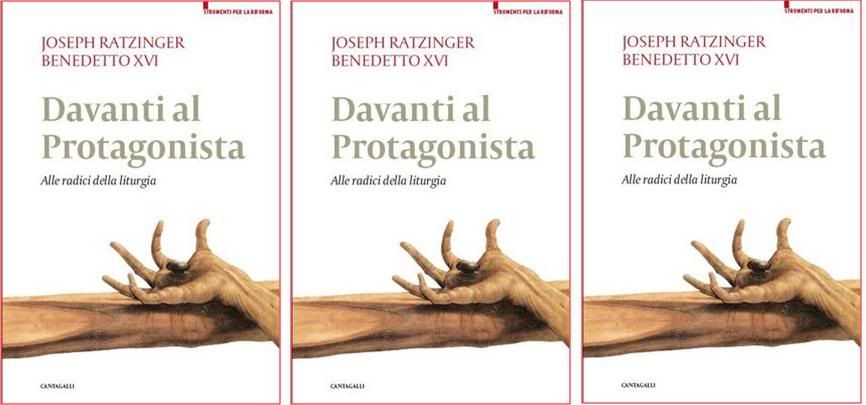 BEFORE THE PROTAGONIST
BEFORE THE PROTAGONIST
The roots of liturgy
Thanks once again to Lella and her invaluable blog

for leading us to this Italian site of
the Movimento Liturgico Benedettiano
(MLB - the Benedictian Liturgical Movement)
 www.rinascimentosacro.com/2009/07/benedetto-xvi-la-liturgia-un-mette...
www.rinascimentosacro.com/2009/07/benedetto-xvi-la-liturgia-un-mette...
"to promote and study the celebration of the venerable Catholic liturgy, especially in the Extraordinasry Form of the Roman Rite, according to the teachings of His Holiness Benedict XVI and the norms contained in his Motu Proprio Summorum Pontificum".
They take their inspiration from these words by Cardinal Ratzinger in The Spirit of the Liturgy:
One cannot 'construct' a liturgical movement of this type - anymore that one can construct something living - but one can contribute to its development, by trying to assimilate anew the spirit of the liturgy and to defend publicly what we have received thus far. This new beginning requires 'fathers' who will me models and not content themselves with indicating the way to follow.
This is the publisher's blurb for the new book:
Benedict XVI: Liturgy
is placing oneself
'before the one Protagonist'- Christ
The second in a Benedictian series of 'Strumenti della Riforma' published by Cantagalli of Siena and edited by MLB member Don Alessandro Galleotti will be out in bookstores soon.
It is an anthology of Joseph Ratzinger/Benedict XVI's texts which seeks to encompass the treasures of liturgical thinking that he has held from the very beginning, and which can be synthesized very well by the book title: Liturgy as an act of placing oneself and the entire Church 'before the Protagonist' of it all, Jesus Christ.
"The Word of God, in order to enter the Church and into the Church, does not take the form of opinions, discussions, much less of pure doctrinal affirmations; it remains an act of God in which we take part." (Adrienne von Speyr)
Above and beyond the polemics between 'revolutioanries' and 'conservatives', the author presents himself as a contemplator, a man moved by the beauty of the one single Protagonist of the liturgy, Jesus Christ.
Leading us through a review of different texts, this book educates us to look at the Church, at its Tradition and its nature, not as a space for our self-affirmation, but as a place to welcome and celebrate the gift of Christ.
It is with the image of the Spouse - through a reading of some Conciliar texts that goes beyond those commonplaces which distort the ecclesial experience - that the author recounts liturgy, from the point of view of a theologian and a priest who lives for the mystery he celebrates daily.
If the Church and its liturgical experience are the center of these reflections, the author does not disdain to respond at the same time to criticisms, nor to give practical suggestions.
Intending neither to abolish Paul VI's liturgical reform nor to restore summarily the Mass of St. Gregory the Great, but situating himself within the great liturgical movements of the last two centuries, he offers practical suggestions for recovering some aspects which are indispensable for truly 'living' the liturgical event. [And in this, he remains the finest exemplar of our day.]
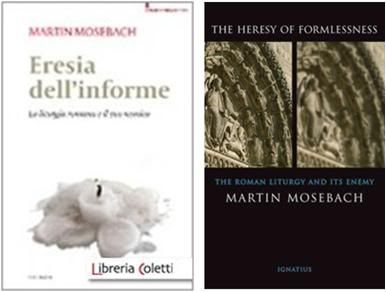
The first book of the Cantagalli series [in Italy, they are called 'collana' (singular) - and are either thematic or books by a single author] was the Italian translation of German literary giant Martin Mosebach's The Heresy of the Formless published last May.
BTW, an interesting project of the MLB is keeping track of churches In Italy where the traditional Mass has been established. It calls it
"The extraordinary fruits of Grace in the time of Benedict XVI:
The map of the litrugy in extrardinary form":
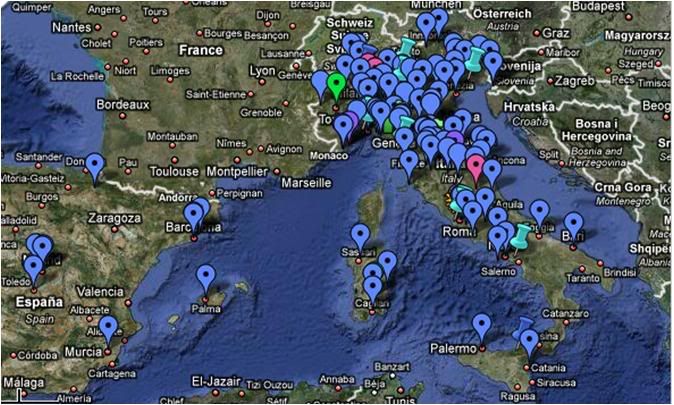
[Modificato da TERESA BENEDETTA 14/07/2009 01:35] |
| |
 13/07/2009 15:33 13/07/2009 15:33 |
|
| | | OFFLINE | | Post: 17.928
Post: 597 | Registrato il: 28/08/2005
Registrato il: 20/01/2009 | Administratore | Utente Senior | |
|

July 13
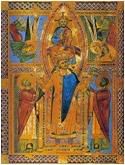 St. Henry (Bavaria, 972-1074)
St. Henry (Bavaria, 972-1074)
German King and Holy Roman Emperor
Confessor
No OR today.
 THE POPE'S DAY
THE POPE'S DAY
The Holy Father has no events scheduled today. He flew to Val D'Aosta to begin his summer vacation
which will last to July 29.
Video from Sky-TV of his arrival at the Turin airport at 11:20 this morning, from where he took
a helicopter to Les Combes:
video.sky.it/videoportale/index.shtml?videoID=29277375001
[Modificato da TERESA BENEDETTA 13/07/2009 15:45] |
| |
 13/07/2009 15:53 13/07/2009 15:53 |
|
| | | OFFLINE | | Post: 17.929
Post: 598 | Registrato il: 28/08/2005
Registrato il: 20/01/2009 | Administratore | Utente Senior | |
|
 THE POPE BEGINS HIS VACATION
Translated from
THE POPE BEGINS HIS VACATION
Translated from

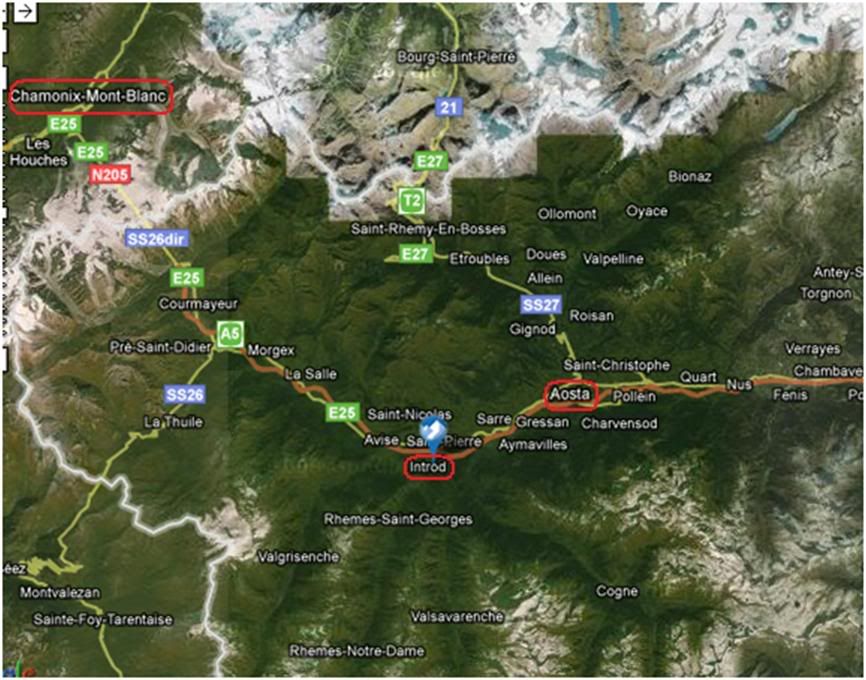
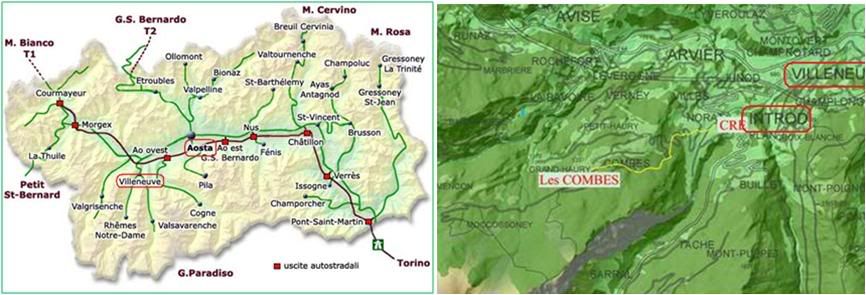 Locating Les Combes - so tiny it doesn't show on regular maps..
The initial newsphotos from the Yahoo service were all taken in Les Combes. The Holy Father flew from Rome to Turin airport this morning, arriving here at 11:30 a.m. He then took a helicopter directly to Les Combes, where he arrived around 12:40.
Locating Les Combes - so tiny it doesn't show on regular maps..
The initial newsphotos from the Yahoo service were all taken in Les Combes. The Holy Father flew from Rome to Turin airport this morning, arriving here at 11:30 a.m. He then took a helicopter directly to Les Combes, where he arrived around 12:40.
My prayer is that he will finish the second volume of JESUS OF NAZAREETH. I have no doubt he will make the best use of this 'time off' God bless...
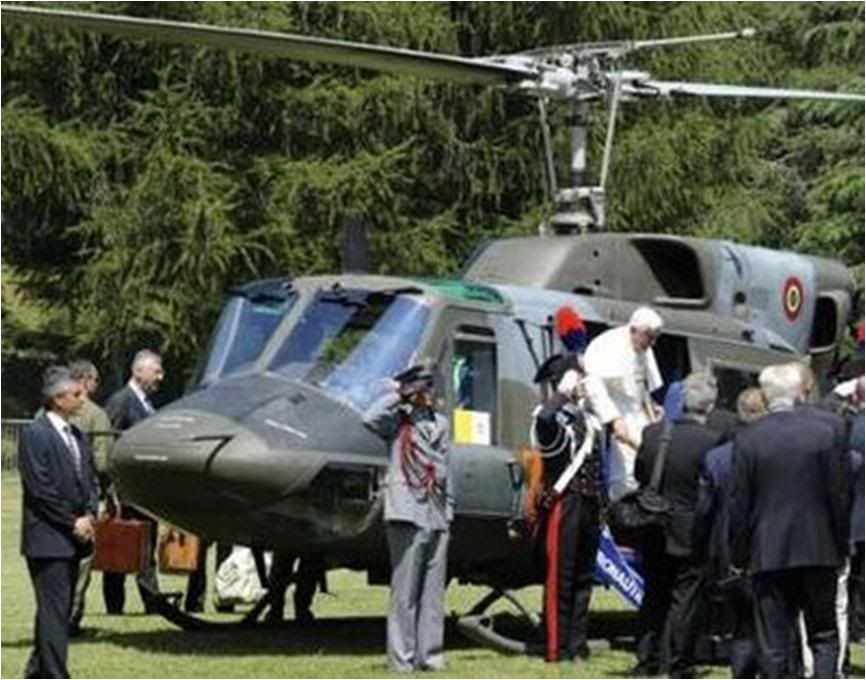
LES COMBES, July 13 - "It will be a vacation for rest, also some work, but above all, rest," Pope Benedict XVI said, arriving at Les Combes of Introd, in Val D'Aosta. where he will be staying until July 29.
The Pope comes from event-filled weeks which included the publication of his third encyclical - starting with the opening of the Year for Priests and the closing of the Pauline Year, to his audiences last week with some of the G8 summit participants, including the US President.
"This is such a beautiful place," he said upon stepping down from the helicopter which brought him to Les Combes from Turin airport. "That's why I'm back."
(He spent the first two summer vacations of his Pontificate here; in 2007, he went to Lorenzago del Cadore in northeast Italy; and last year, a bit farther north, to Bressanone, which was a favorite vacation spot for him before he became Pope.]
He was also heard to say that "It seems to me the G8 summit went well".
The Pope left the Vatican at 10 o'clock this morning, arriving at Torino-Caselle airport at 11:30, where he was greeted by Cardinal Severino Poletti, Archbishop of Turin, the prefect Paoldo padoin; the mayor of Turin Sergio Chiamperino, tje president of the province Antonio Saitte, and the vice president of the Region, Paolo Peveraro.
After a half hour, the Pope took the helicopter to Les Combes.
This year, Aosta is observing the ninth centenary of the death of St. Ambrose, one of the pre-eminent Doctors of the Church, who was bishop of Aosta and became Archbishop of Canterbury.
Welcoming him in Les Combes were the Bishop of Aosta, Mons. Giuseppe Anfossi; the mayor of Introd, Osvaldo Naudin; the president of the region, Augusto Rollandin, and the president of the regional council Alberto Cerise.
Also present were children from the day care center of Introd.
The coming 16 days are seen as an opportunity for the Pope to resume work on the the second volume of JESUS OF NAZARETH and to have more time to play the piano.
His rooms on the second floor of the vacation residence look out to Mont Blanc, the highest peak in the Alps.
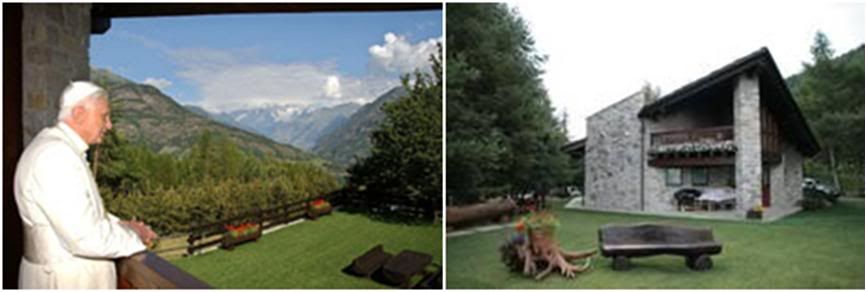
New this year are a lawn umbrella with lounging chair and table, as well as an outdoor barbecue. The Salesian fathers, who own the chalet, also reportedly brought in a new piano for the Pope.
As usual, when he is on vacation, the only scheduled public events are the Sunday Angelus prayers. On July 19, he will do this from the church square in Romano Canavese, in the nearby diocese of Ivrea. It is the hometown of Cardinal bertone.
On July 26, he will lead the Angelus from the meadow adjoining the vacation residence in Les Combes.
Some 300 security personnel, between the Vatican's own, and those of the Italian government, have been assigned to watch over the Pope during this vacation.
When he leaves Les Combes on July 29, the Pope will proceed as usual to Castel Gandolfo where he will spend the rest of the summer, most likely with his brother, Mons. Georg, who has come to Castel Gandolfo regularly for the summer.
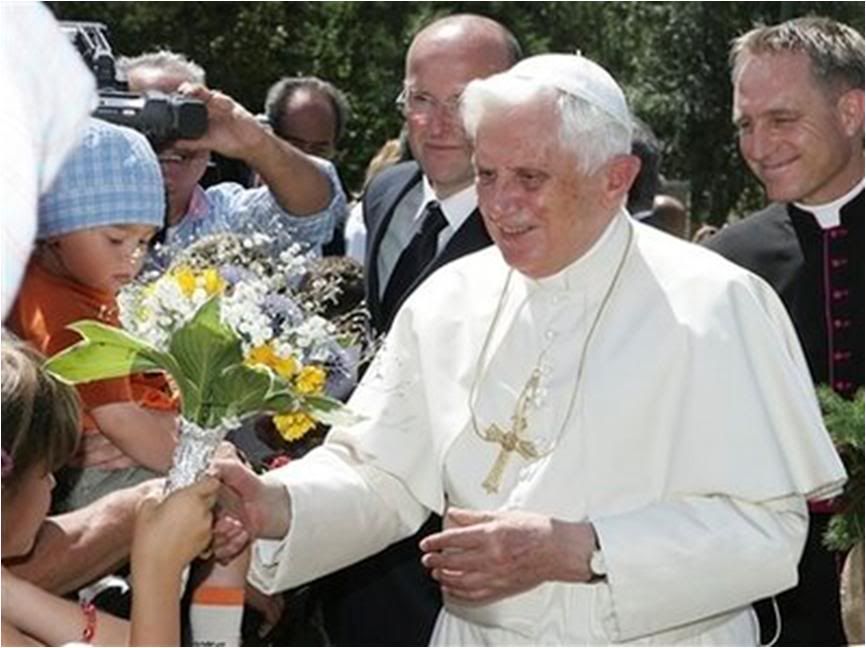
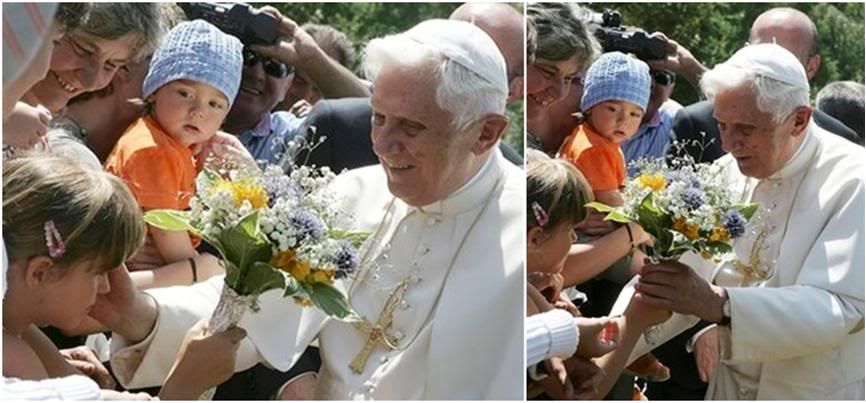
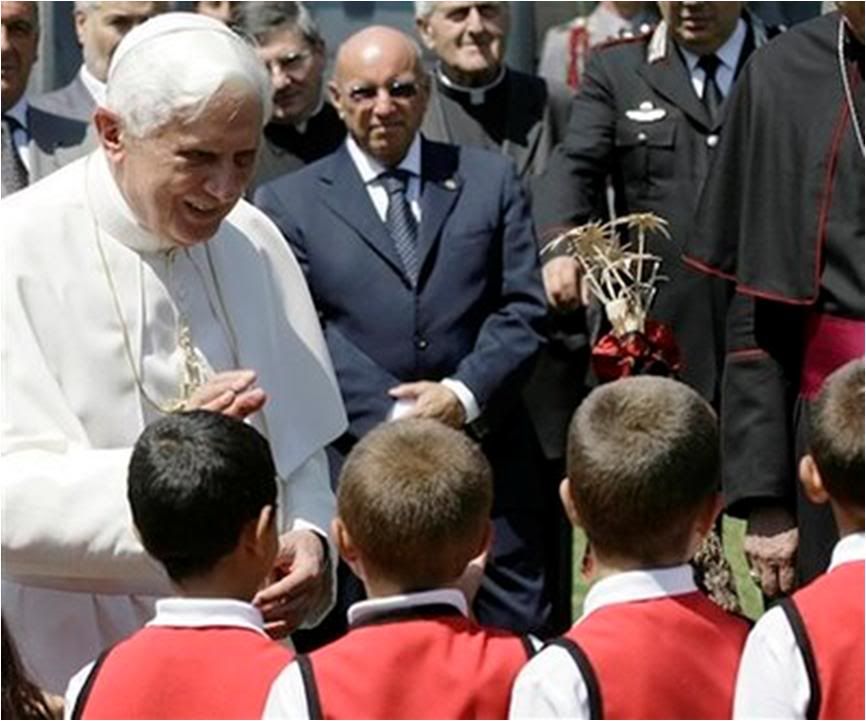
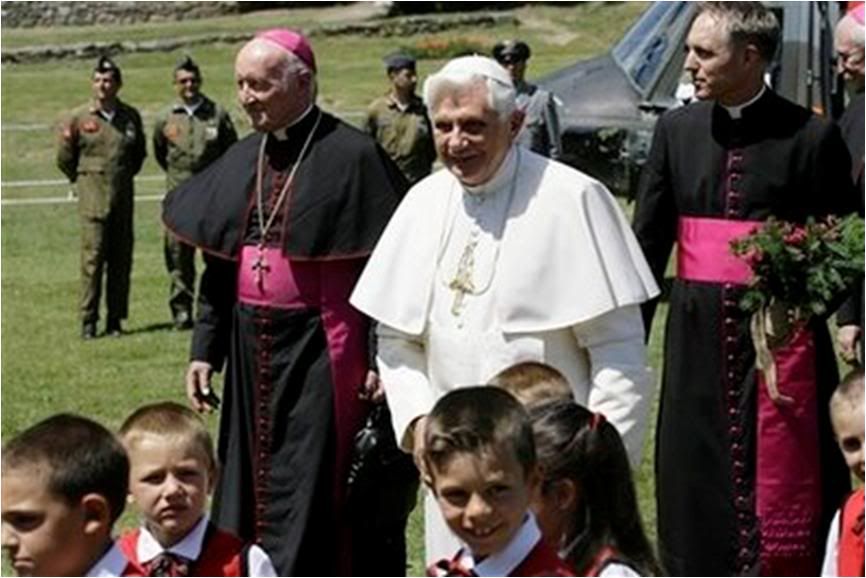
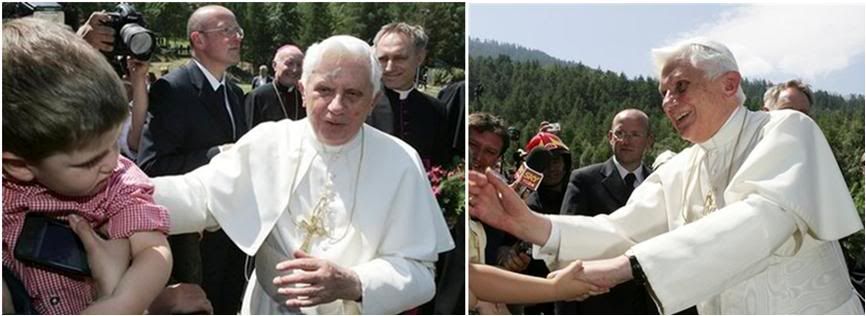
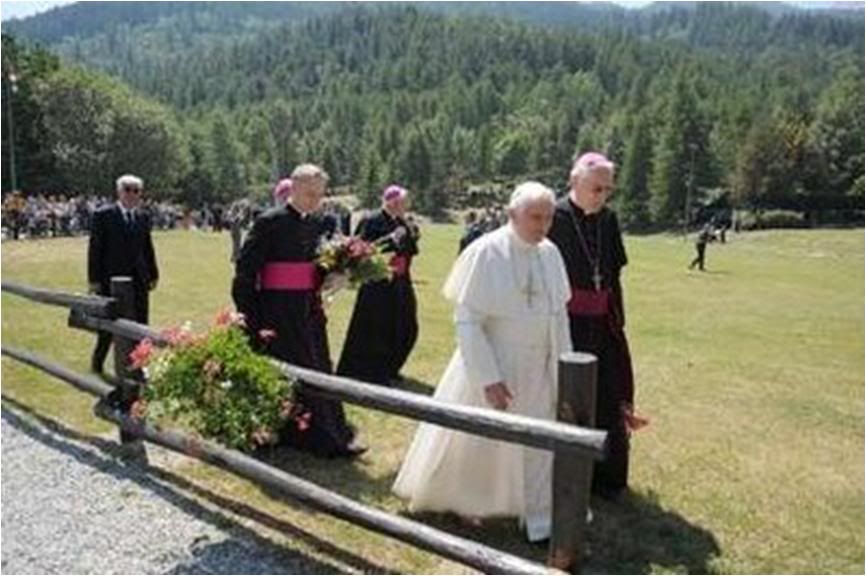
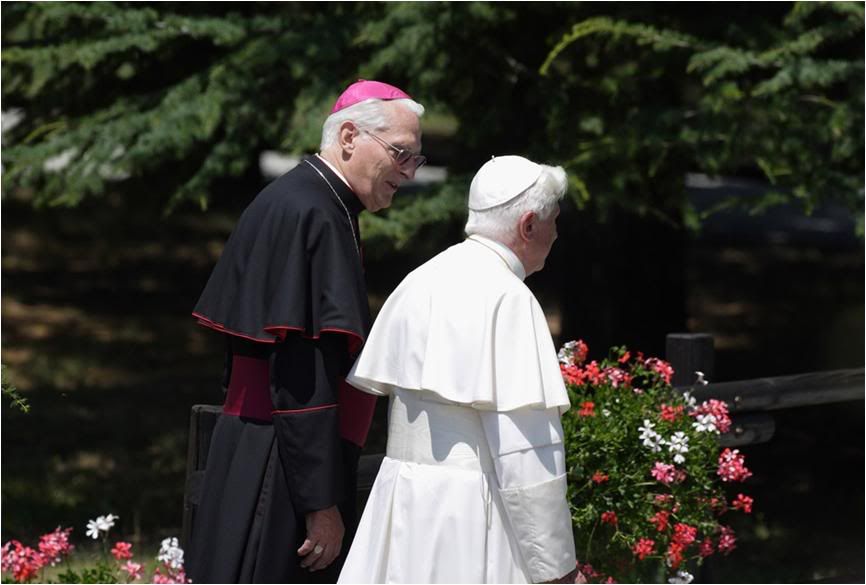
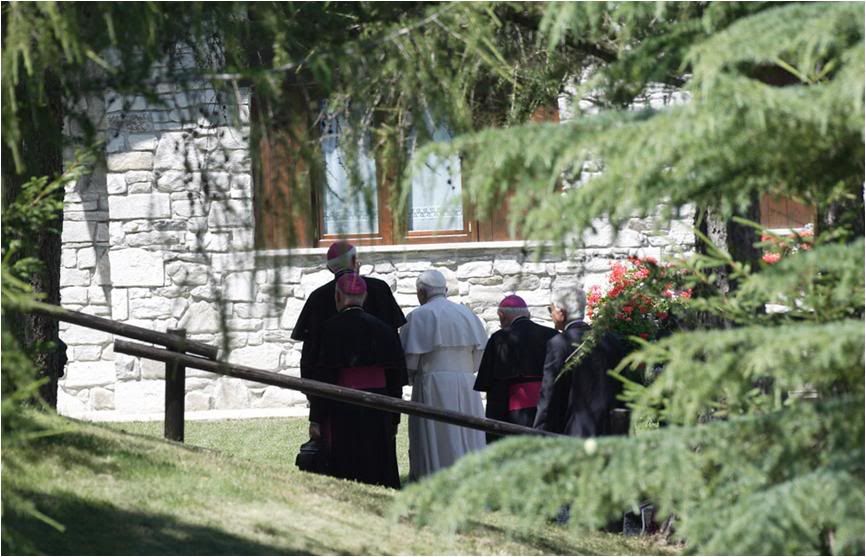
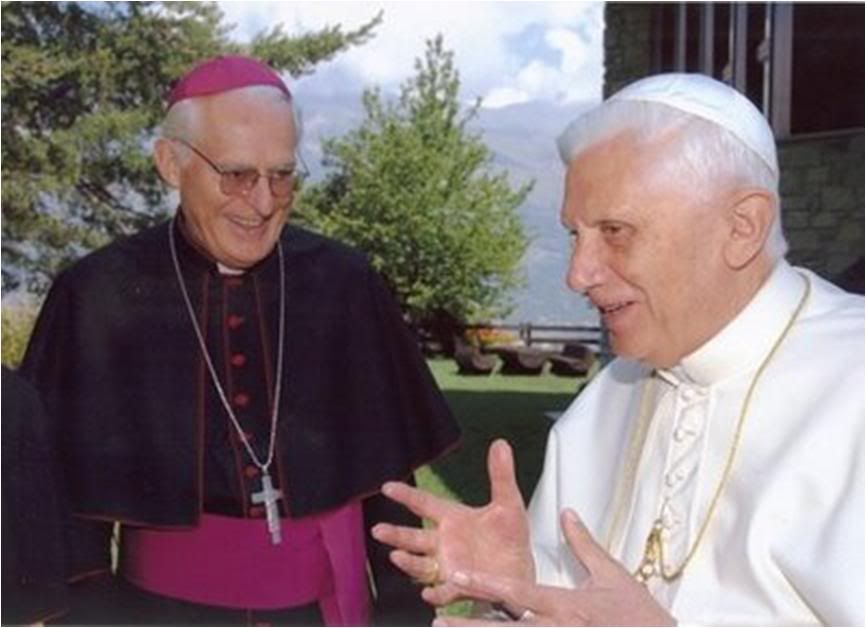 With Mons. Anfossi, Bishop of Aosta.
With Mons. Anfossi, Bishop of Aosta.
Additional info translated from

Smiling and looking very relaxed, the Pope arrived by helicopter on the meadow called Plain du Saint-Pere, named at the time of John Paul's visits to Les Combes.
Twelve children from the local day care center bade him welcome in Italian, French, German and the local patois (a variety of French Provencal).
The Pope called out "Have a good vacation and a good rest" to the journalists present.
Someone asked him if the prospects were better for the poorer countries after the G8 summit in L'Aquila.
He replied, "Let us hope so. I think they made some good decisions and that everything went well".
To Introd Mayor Osvaldo Naudin, he jested: "You are the eternal mayor!"
Naudin has been mayr sonce 1980 and hosted all of John Paul II's ten visits to Les Combes as well as Benedict's three visits so far.
Before the Pope arrived, those in charge of security asked the media not to ask any questions from the Pope until it had been determined whether he was available for that,
But the correspondent for a regional weekly nonetheless called out the question about the G8. Security tagged him and said they would withdraw his accreditation. But in the end, the matter was resolved with handshakes.
As usual, there is no advance word on any outings that the Pope may plan during his stay.
His hosts have proposed a visit to the Cathedral of Aosta, newly restored for the observance of the ninth centenary of the death of St. Ambrose of Canterbury, who had been bishop of Aosta before he was sent to England.
It would also be an occasion for the Pope to meet with the diocesan clergy, as he has done on past vacations, a practice he first started on his first vacation as Pope in Les Combes.
Also recommended is a visit to the Savoyard fort in Bard, in the northwestern Alps.
Certainly, the Pope will take his daily walks in the mountain paths around the simple wood-and-stone vacation residence built by the local Salesian community for John Paul II in 2000.
He may also host a cocnert planned by the regional authority featuring folk music and a chamber orchestra.
This is the first English report I could find today - and it offered little information.
Pope Benedict XVI begins
two-week vacation in the Italian Alps
LES COMBES, Italy, July 13 (AP) — The Vatican says Pope Benedict XVI has traveled to a village in the Italian Alps for two weeks of vacation.
It says the pontiff was flown to Turin on a plane Monday and then traveled on to Les Combes, in a region near the French border, by helicopter.
Benedict has spent two summers at Les Combes in recent years. He said upon arrival that he expected to rest and work during his vacation. He is scheduled to be away until July 29, making at least two public appearances in the area.
Benedict's predecessor, John Paul II, also spent several summer at Les Combes. While John Paul liked to hike, Benedict spends most of his time inside the chalet that looks out on Mont Blanc, the highest peak in the Alps.
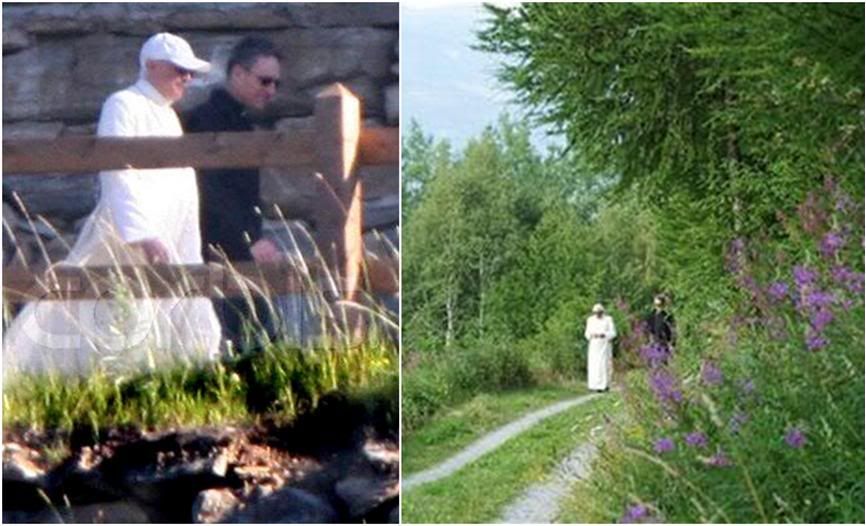 Leisurely walks in July 2005
Leisurely walks in July 2005.
The commune of Introd has reports and photographs of the Pope on
www.maison-musee.it/news/
a website on the John Paul II Museum located there.
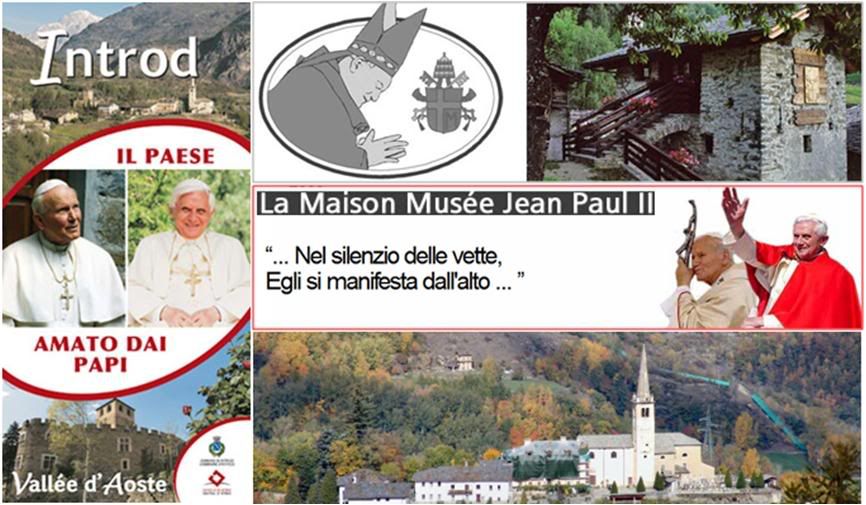
[Modificato da TERESA BENEDETTA 14/07/2009 00:47] |
| |
 13/07/2009 20:56 13/07/2009 20:56 |
|
| | | OFFLINE | | Post: 17.930
Post: 599 | Registrato il: 28/08/2005
Registrato il: 20/01/2009 | Administratore | Utente Senior | |
|
 What malice could make the Vatican correspondent for Italian State TV's third channel newscast TG-3 make the uncalled-for, unwarranted, unfounded and clearly insolent (to say the least - contemptuous is the adjective I would us for it) remarks he made yesterday at the conclusion of a report about the Pope's Angelus message - which, by the way, RAI-TV broadcasts in its entirety on Sundays and consistently attracts at least 20 percent of noontime TV viewers in Italy, an obvious reason why RAI continues to broadcast it.
What malice could make the Vatican correspondent for Italian State TV's third channel newscast TG-3 make the uncalled-for, unwarranted, unfounded and clearly insolent (to say the least - contemptuous is the adjective I would us for it) remarks he made yesterday at the conclusion of a report about the Pope's Angelus message - which, by the way, RAI-TV broadcasts in its entirety on Sundays and consistently attracts at least 20 percent of noontime TV viewers in Italy, an obvious reason why RAI continues to broadcast it.
This is now the center of a media tempest in a teapot in Italy. Here is the account from Il Giornale ....
Should a newscaster get away
with open 'disrespect'
for the Pope?
Translated from the online service of

July 13, 2009
ROME - TG3 is in the center of a storm. Cause for the controversy was a RAI-3 newscast during which Vatican correspondent Roberto Balducci, made these remarks, commenting on the vacation of the Pope:
"There will be two cats with him. They will get a smile out of him, as will the other proverbial four cats (perhaps a few more) who still have the courage and the patience to listen to his words."
[Who is this creature anyway? The only reason he is doing the program is because Italians follow the Sunday Angelus, i.e., to listen to the Pope - and the only reason anyone listens to Baldacci at all is not because of who he is but probably because he anchors the Angelus broadcast!
What does it say of RAI that it can name a correspondent to cover the Pope who obviously has no respect for the man he is covering, who obviously does not understand that what the Pope has to say often matters to the whole world, and not just to Catholics, least of all, 'only yo the proverbial four cats'. The viiewership of the Angelus broadcasts alone belies his obviously ill-willed remarks!]
Promptly, parliamentarian Giorgio Merolo (of the minority Partito Democrata), who is vice president of the parliamentary committee that oversees RAI, protested by writing to management about the 'anti-clerical' msnifestation by Balducci, calling it 'singularly vulgar'.
"Without in any way interfering with the editorial autonomy of the newscast nor raising any polemic of a religious nature," Merlo continued, "it is highly exceptional and unusual that an important media outlet like TG3 should slide into this anachronistic and vulgar anti-clericalism... In any case, such expressions are not part of the norms that regulate the proper use of a public service [like broadcasting]".
The reply from TG-3:
The channel manager (or newscast editor - it is not clear), Antonio Di Bella, replied to Merlo:
"The editorial line of TG# has always been characterized by great attention and respect for the magisterium fo the Church and the figure of the Pontiff. I wish to reiterate this commitment in the face of the Honorable Merlo's courteous but firm protest.
"A statement in eysterday's newscast about the Pope's vacation may have led the Honorable Deputy adn others to consider that it showed lack of respect for the Pope. [DUH! What else was it??
"That was not the case. And because of this, shortly after the newscast yesterdaty, before any protest could be raised, I formally called the correspondent's attention. [So Di Bella himself realized soemthing wrong had happened.]
"He assured me that it was not his intention to be sarcastic or worse, to make the Pope a laughing-stock, as he has never done so in the past.
[The words used by Di Bella suggest Baldacci wes well aware what exactly he meant by his words! Otherwise, he could simply have said, "I did not mean to be disrespectful, and I am sorry" - why go to the lengths of 'self-interpreting' how his words could have been taken?
Even worse, how can Di Bella just accept that non-explanation - which obviously didn't even come with any attempt at apology - and sound so self-righteous when he reports it?]
Di Bella reiterated "the commitment of TG3 to a renewed attention towards Vatican issues and to maximum respect for the figure of the Holy Father, as proven by the impeccable coverage we have provided for his latest events, particularly the meeting with President Obama to which TG3 dedicated the relevance it merited.
[Yeah, sure! They covered it primarily because of Obama, not because of the Pope. Who are we kidding here? This guy makes me want to throw up! he should be called Di Brutta, not Di Bella.]
And Fr. Lombardi says, "Fine, we accept your explanation!"
"I take note of the statement made by TG3 manager (or editor) Di Bella," replied Vatican spokesman Fr. Federico Lombardi. "I hope therefore that the newscast of the third channel may always be, as he says, characterized in fact by attention and respect for the Church and for the figure of the Pope".
Case closed!
While I agree that there is no point to prolonging or widening the controversy, I still think Di Bella's action was summarily dismissive of the gravity of the lese-majeste [or lese-saintete, in this case] committed in such a matter-of-fact way by his Vatican correspondent, who should at least have the elementary decency to say publicly "I'm sorry and I apologize to the Pope". I think Deputy Merlo should insist on this.
[Modificato da TERESA BENEDETTA 13/07/2009 21:09] |
| |
 14/07/2009 00:41 14/07/2009 00:41 |
|
| | | OFFLINE | | Post: 17.931
Post: 600 | Registrato il: 28/08/2005
Registrato il: 20/01/2009 | Administratore | Utente Senior | |
|
 OR's account of the Pope's trip to Les Combes. Photos are from Repubblica online.:
Rest and work
OR's account of the Pope's trip to Les Combes. Photos are from Repubblica online.:
Rest and work
on the Pope's holiday
Translated from
the 7/13-7/14/09 issue of

Benedict XVI reached Les Combes at midday on Monday, July 13, to spend 'a period of rest' until Wednesday, July 29.
The Pontiff himself, speaking to newsmen on his arrival, said it would be a vacation "of rest and work, but above all, rest".
"This is truly a beautiful place," he said, upon stepping out of the helicopter that brought him to Les Combes, then added jestingly, "Otherwise, I would not have come back!"
He also answered a a newsman who asked him what he thought of the recently concluded G8 summit in L'Aquila. He replied: "It seems to me things went well".
The Pope left the Vatican around 10 a.m. He was seen off from the Cortile San Damaso by Cardinal Tarcisio Bertone, Secretary of State, and his two deputies, Archbishops Fernando Filoni and Dominique Mamberti, as well as by Mons. Gabriele Caccia, a senior counselor at State.
Seeing him off from the Vatican heliport were Cardinals Angelo Sodano, dean of cardinals, and Giovanni Lajolo, governor of Vatican city state, along with Mons. Renato Boccardo, secretary-general of the Governatorate.
The Pope flew to Ciampino military airport along with Archbishop James Harvey, prefect of the Pontifical Household; Mons. Paolo De Nicolo, his regent; and Mons. Georg Gaenswein, who all travelled with him to Les Combes.
An A319 civilian aircraft with the papal party took off at 10:35 and landed in Torino-Caselle airport at 11:30. This was a change from the Pope's first two trips to Les Combes, when he flew to the airport of Aosta from Rome.
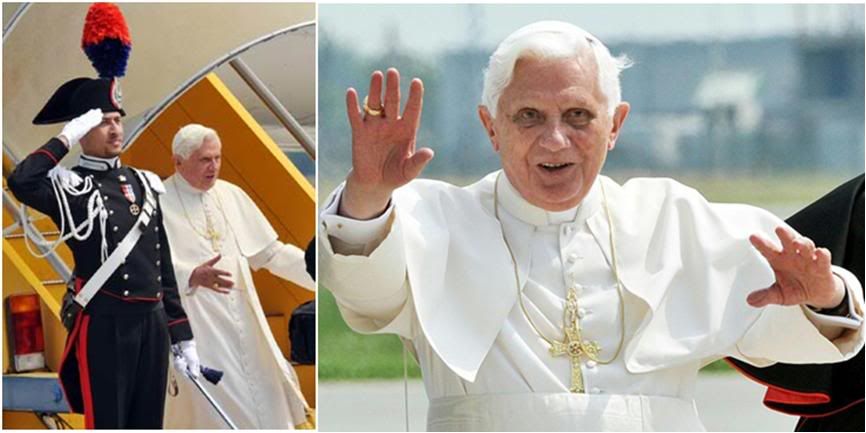
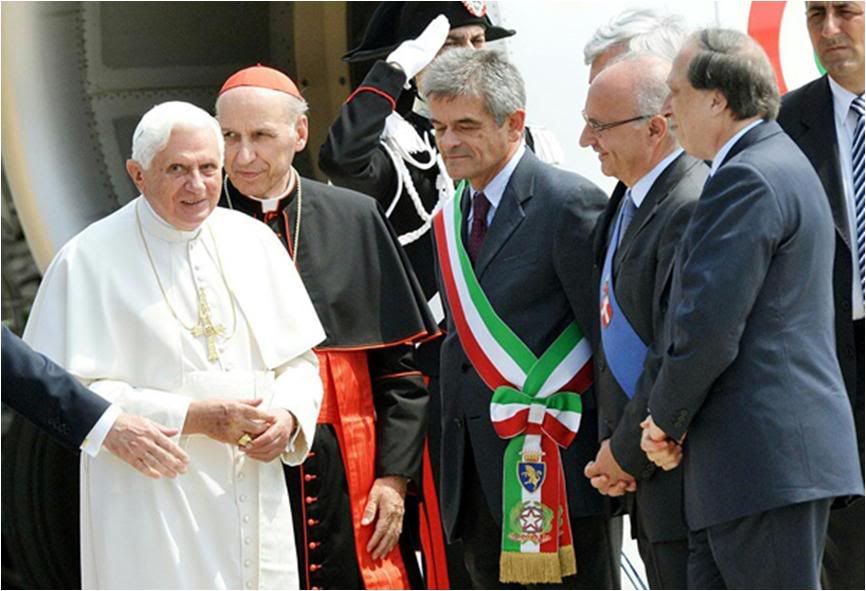
In Turin, he was welcomed by Cardinal Severino Poletto, Archbishop of Turin; Mayor Sergio Chiamparino, prefect Paolo Padoin, provincial president Antonio Saitta, and regional vice-president Paolo Peveraro.
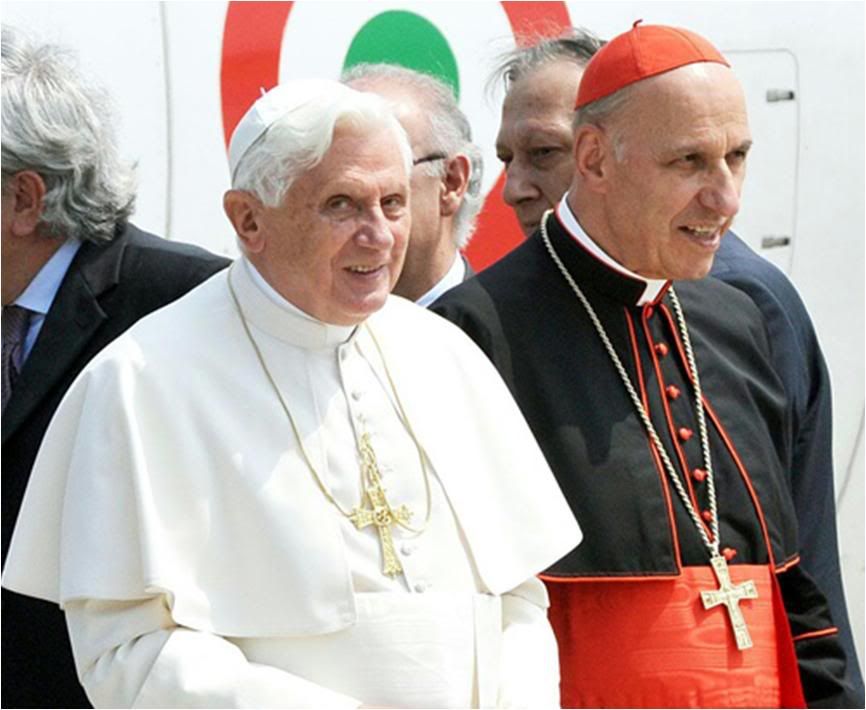 Cardinal Poletto is looking forward to hosting the Pope in Turin early next year for the extraordinary exposition of the Holy Shroud.
Cardinal Poletto is looking forward to hosting the Pope in Turin early next year for the extraordinary exposition of the Holy Shroud.
After half an hour, the papal party took a helicopter direct to Les Combes. Before landing the Pope had a chance to overfly some landmarks in the region, admiring the beauty of the Alpine scenery.
Th helicopter landed at the meadow adjoining the vacation residence at Les Combes, a locality in the foothills of Mont Blanc.
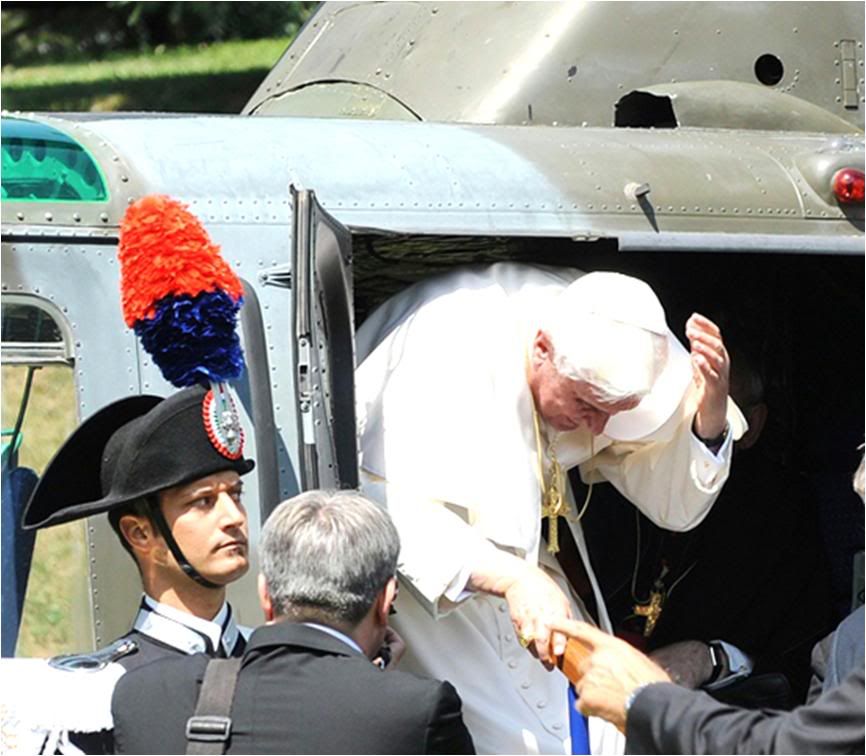
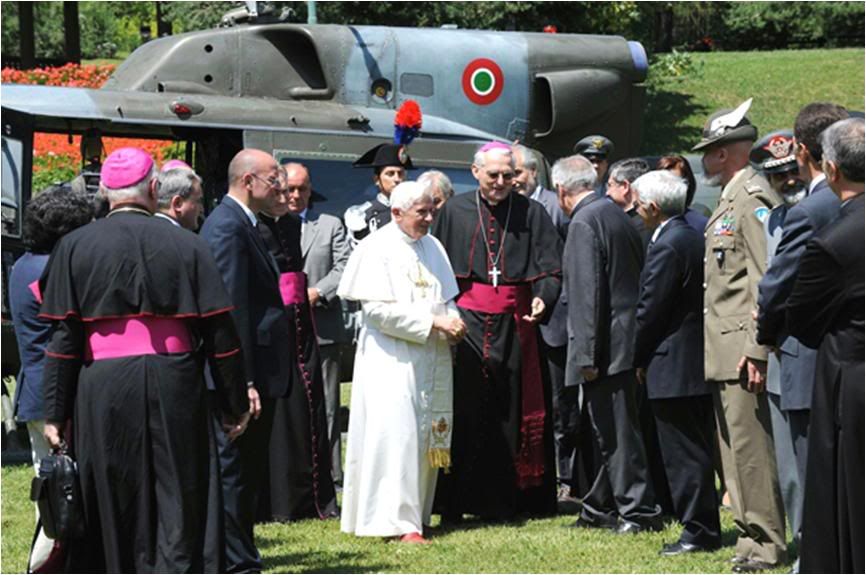
Welcoming him, along with children from the local day care center, were the Bishop of Aosta, Mons. Giuseppe Anfossi; regional president Augusto Rollandin and regional council president Aberto Cerisi, Mayor Osvaldo Naudin, other civilian and military authorities, the parish priest of Introud, Ferrucio Brunod, and the members of the Salesian community under their rector general Pascual Chavez Villanueva.
The Salesians, who have a vacation colony in Les Combes, built the vacation chalet for John Paul II in 2000.
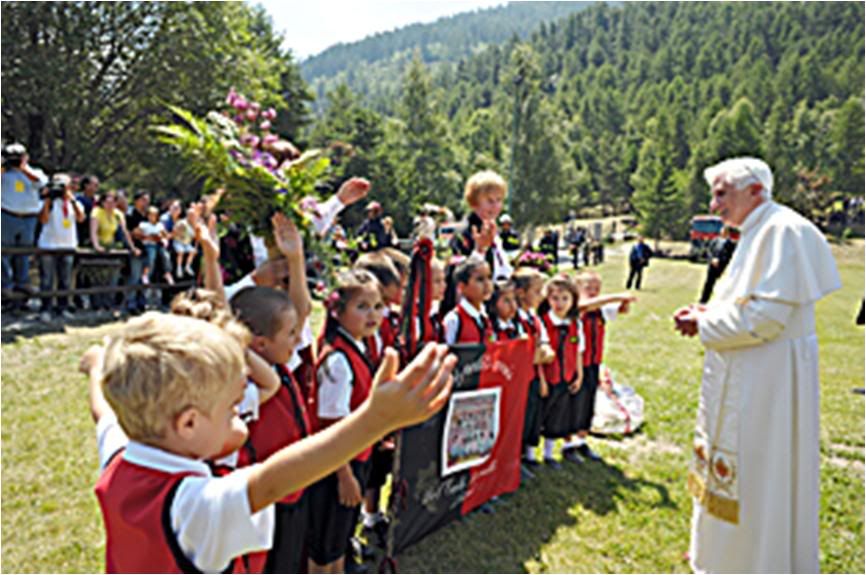
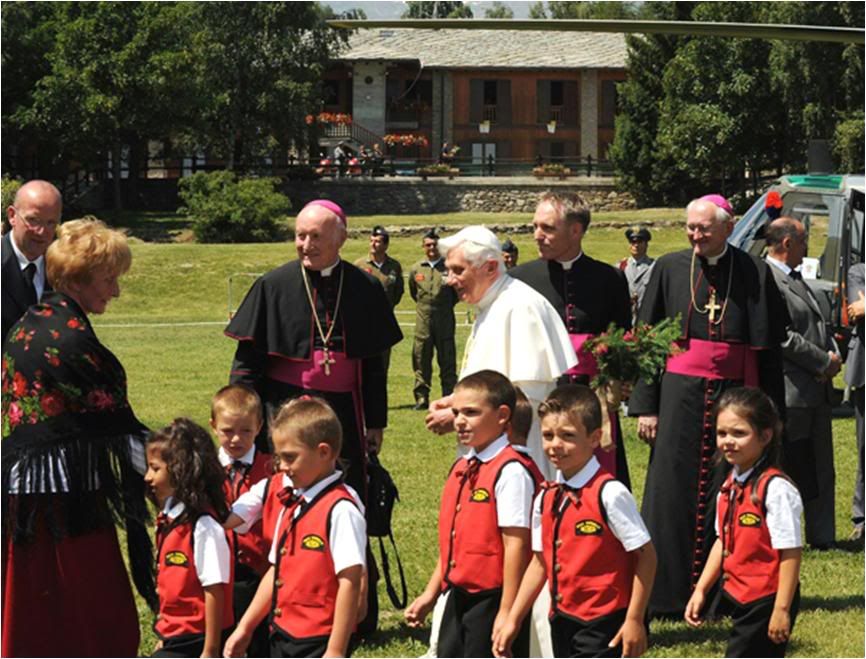
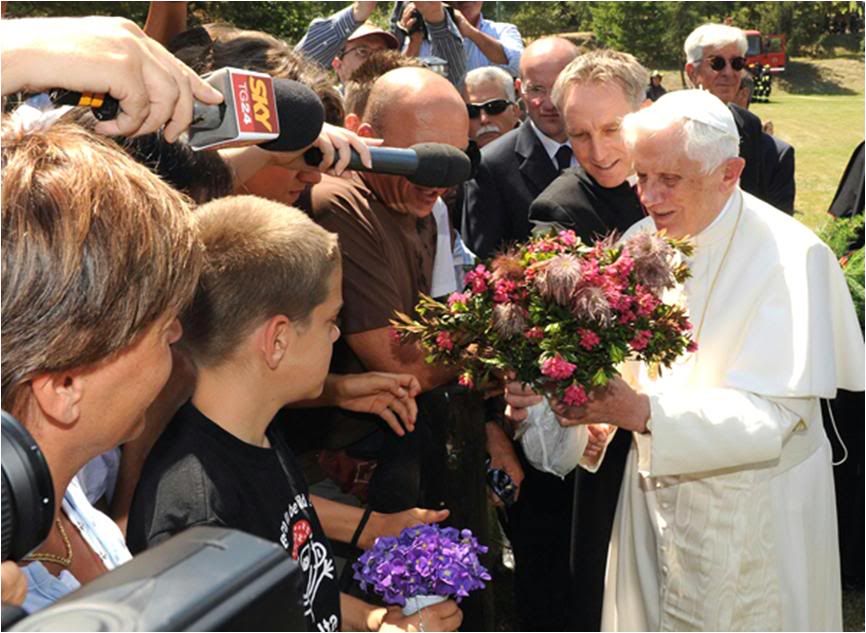
|
| |
 14/07/2009 01:11 14/07/2009 01:11 |
|
| | | OFFLINE | | Post: 17.932
Post: 601 | Registrato il: 28/08/2005
Registrato il: 20/01/2009 | Administratore | Utente Senior | |
|
 Boccardo to Spoleto,
Boccardo to Spoleto,
Vigano to replace him
at the Governatorate
Translated from
Sndrea Tornielli's blog

July 12, 2009
As anticipated by this blog earlier (see June 28 post), this week (probably Tuesday) will see the nomination by Benedict XVI of Mons. Renato Boccardo, who has been #2 man at the Governatorate of Vatican City-State since 2005, to be the Archbishop of Spoleto.
He will replace Mons. Riccardo Fontana, who will go to Arezzo, in place of Mons. Gualtiero Bassetti, who will be Archbishop of Perugia.
Boccardo, who coordinated the papal trips for John Paul II in his latter years, also coordinated Benedict XVI's visit to Cologne in 2005, after which he was named to the Governatorate.
Earlier under John Paul II, he was secretary of the Pontifical Council for Social Communications.
Expected to replace him at the Governatorate is Mons. Carlo Maria Vigano, who, it is thought, will be the eventual replacement for Cardinal Giovanni Lajolo as Governor of Vatican City State.
It is a bad time for the Vatican government, which reportedly lost half of its investments because of the financial crisis.
[Modificato da TERESA BENEDETTA 15/07/2009 02:28] |
| |
 14/07/2009 02:29 14/07/2009 02:29 |
|
| | | OFFLINE | | Post: 17.933
Post: 602 | Registrato il: 28/08/2005
Registrato il: 20/01/2009 | Administratore | Utente Senior | |
|
 I will continue to post here first the more significant commentaries on CIV, and then report them in the CIV thread. This one takes a shot at the mindless ideological reflexes - and they are mindless because they are reflexive, robotic responses - with which political-minded people have reacted to the encyclical.
The audacity of the Pope
I will continue to post here first the more significant commentaries on CIV, and then report them in the CIV thread. This one takes a shot at the mindless ideological reflexes - and they are mindless because they are reflexive, robotic responses - with which political-minded people have reacted to the encyclical.
The audacity of the Pope
By ROSS DOUTHAT
Op-Ed Columnist

Published: July 12, 2009
Papal encyclicals are supposed to be written with one eye on two millenniums of Catholic teaching, and the other on eternity. But Americans, as a rule, have rather narrower horizons.
As soon as the media have finished scanning a Vatican document for references to sex, the debate begins in earnest: Is it good for the left, or for the right? For Democrats, or for Republicans?
This was true in the 1950s, when the young William F. Buckley Jr. famously feuded with liberals over how much respect he owed to papal pronouncements on economic matters.
It was true in the 1990s, when conservatives eagerly cited John Paul II’s condemnations of abortion and euthanasia, while liberals countered by noting his criticisms of the death penalty.
And it’s especially true today, when a document like Caritas in Veritate (“Charity in Truth”), the third encyclical of Benedict XVI’s papacy — whose release, last Tuesday, was slightly overshadowed by a celebrity funeral of some sort — can be wrangled over endlessly within hours of showing up online.
These arguments never seem to go anywhere. When a Pope criticizes legalized abortion, liberal Catholics nod and say that yes, they agree, it’s a terrible tragedy ... but of course they can’t impose their religious values on a secular society. [No, it's worse than that! They actually share the secular view of abortion as a fundamental human right!!
When a Pope endorses the redistribution of wealth, conservative Catholics stroke their chins and say that yes, they agree, society needs a safety net ... but of course they’re duty-bound to oppose the tyranny of big government.
And when the debate isn’t going their way, left and right both fall back on flaccid rhetoric about how the papal message “transcends politics,” and shouldn’t be turned to any partisan purpose.
Caritas in Veritate has been no exception. It’s a “social” encyclical, in the Church’s parlance, covering issues ranging from globalization and the environment to unions and the welfare state.
Inevitably, liberal Catholics spent the past week touting its relevance to the Democratic Party’s policy positions. (A representative blast e-mail: “Pope’s Encyclical on Global Economy Supports the Principles of the Employee Free Choice Act.”)
Just as inevitably, conservative Catholics hastened to explain that the encyclical “is not a political document” — to quote a statement co-authored by the House minority leader, John Boehner — and shouldn’t be read as “an endorsement of any political or economic agenda.”
Boehner is half right. The Pope is not a Democrat or a Republican, and his vision doesn’t fit the normal categories of American politics.
But Benedict’s encyclical is nothing if not political. Caritas in Veritate promotes a vision of economic solidarity rooted in moral conservatism. It links the dignity of labor to the sanctity of marriage. It praises the redistribution of wealth while emphasizing the importance of decentralized governance. It connects the despoiling of the environment to the mass destruction of human embryos.
This is not a message you’re likely to hear in Barack Obama’s next State of the Union, or in the Republican Party’s response. It represents a kind of left-right fusionism with little traction in American politics.
But that’s precisely what makes it so relevant and challenging — for Catholics and non-Catholics alike.
We’re passing through the worst economic dislocation of the past 80 years. Our politics are polarized; our institutions gridlocked. The governing party is mistrusted, the minority party despised.
Yet there’s remarkably little radical thinking taking place. The Republican Party is retrenching, falling back on Reagan-era verities. His promises of post-partisan change notwithstanding, Barack Obama’s agenda looks like the same old Democratic laundry list, rewritten in a sleeker, Internet-era font.
[It may be sleek, but not sleek enough to hide its general outlines, for those who are not self-blinded to see. The audacity of power, one might call it, is fearsome, to say the least, and it threatens American soceity as we have known it. Obama's big government wants to step in and take over every aspect of individual life in a Fascist-like grap for power that does not care if its ambitious take-over programs are burying future generations in debt - and they've only been six months in power!]
This doesn’t mean that America needs a third party with Caritas in Veritate as its platform. The Church is not a think tank, and there’s room for wide disagreement about how to put its social teaching into practice.
But Catholics are obliged to take seriously the underlying provocation of the papal message — namely, that our present political alignments are not the only ones imaginable, and that truth may not be served by perfect ideological conformity.
So should all people of good will. For liberals and conservatives alike, Caritas in Veritate is an invitation to think anew about their alliances and litmus tests.
Why should being pro-environment preclude being pro-life? Why can’t Republicans worry about economic inequality, and Democrats consider devolving more power to localities and states? Does opposing the Iraq war mean that you have to endorse an anything-goes approach to bioethics? Does supporting free trade require supporting the death penalty?
[But all these imagined 'mutual exclusivities' are nothing but expressions of rigid ideology which governs every thought that ideologues make. One can argue that leftist ideologues in the United States are far more rabid about barking out their Pavlov-dog ideological reflexes than their counterparts on the right.]
These questions, and many others like them, are the kind that a healthy political system would allow voters and politicians to explore.
But for now, at least, you’re more likely to find them being raised in Benedict XVI’s Vatican than in Barack Obama’s Washington.
[About which few in the media are brave enough to say the emperor has no clothes - after all the blatantly shameless and widespread disregard for the Emperor-Messiah's own repeated promises of transparency and no lobbying and no new taxes and pie-in-the-sky for everyone.
What administration can have any moral authority when the President insists that Congress pass its bills as fast as they can to get it to his desk by his deadline, without even having a complete bill to present to the members before they vote on it, and whose major bills so far - the stimulus package, notoriously - were passed with most of the members of Congress matter-of-factly admitting they had not read the bill at all, or only parts of it?
I wonder if the Pope was aware of this blatantly immoral open secret in Washington which the media is not at all condemning, or at least protesting?]
[Modificato da TERESA BENEDETTA 14/07/2009 04:48] |
| |
 14/07/2009 13:55 14/07/2009 13:55 |
|
| | | OFFLINE | | Post: 17.935
Post: 604 | Registrato il: 28/08/2005
Registrato il: 20/01/2009 | Administratore | Utente Senior | |
|
 Here's an excellent one from Il Foglio. After I read it, I had to Google who the writer is - and from the very first entry that popped up - in English - it was not hard to see why he writes the way he does. His credentials are sterling!
Here's an excellent one from Il Foglio. After I read it, I had to Google who the writer is - and from the very first entry that popped up - in English - it was not hard to see why he writes the way he does. His credentials are sterling!
His synthesis is masterful in quoting key statements from different parts of the encyclical - many of them those that are italicized in the original text (and italicized accordingly in this post, and bolded) - and putting them together in a coherent and cohesive way to present his argument, which starts with an original premise.
Ecce dono (Behold the gift!):
Benedict XVI rewrites 'Populorum progressio '
in a natalist sense
by ROBERTO DI MATTEI
Translated from

July 12, 2009
To understand in depth the significance of Benedict XVI's encyclical Caritas in veritate, one must situate oneself within a debate that has traversed Catholic thinking for over a century.
The problem began around the middle of the 19th century with the emergence of the so-called 'social question' and with, it a series of new doctrines, such as liberalism and socialism.
The 1891 encyclical Rerum Novarum (Of new things), by Leo XIII, which was considered the first Catholic response to the challenge, was actually the object of a wide-ranging debate which pitted two schools of Christian economics and sociology against one another.
The first maintained that the social question must be faced in the light of the primacy of the theological virtue, love; whereas the second insists on the primacy of the moral virtue of justice.
Inevitable consequences came from the existence of these divergent thoughts.
The primacy of justice leads to stressing the role of the state as a subject called upon to regulate public life by attributing to everyone what is due him.
The primacy of charity, on the other hand, underscores the role of the individual as the decisive actor in any social relationship.
What results from the first case (primacy of justice) is the centrally-planned state, tending to be socialist. From the second, protection of the market, of private property, and of free enterprise.
The surest solution, foreshadowed in Rerum Novarum, is a synthesis of justice and charity, with the latter prevailing, as in the beautiful formula expressed by Giuseppe Toniolo: "He who can do more, ought to do more; he who can do less, ought to receive more."
Charity is essentially giving onself and what one possesses: it has its origin in the spirit of renunciation and sacrifice that is proper to Christianity.
In 1967, Paul VI's Populorum progressio, overturned the tradition that had until then delineated the thinking of the Church by proclaiming the primacy of justice over charity. [This is a point that tends to be missed!]
The encyclical formulated a negative judgment of liberal capitalism (No. 24), criticized 'free exchange' (Mo. 58), advocated central programming and planning (No. 33), anticipated a limitation on private property and the redistribution of incomes (Nos. 23-24), proclaimed a cult of progress, work, and 'world solidarity (Nos. 58-59).
Benedict XVI's document re-proposes traditional doctrine in new terms, developing Paragraphs 26-31 of his first encyclical Deus caritas est concerning precisely the relationship between justice and charity.
It is interesting to compare the 'incipit' (start) of the encyclicals by Benedict XVI and Paul VI.
Caritas in veritate affirms that "Charity in truth is the principal driving for behind the authentic development of every person and of all humanity (No. 1) and constitutes "the heart of the Church's social doctrine" (No. 2).
"It is the principle not only of micro-relationships (with friends, with family members or within small groups), but also macro-relationships (social, economic and political ones) (No. 2).
On the other hand, Populorum progressio launches from the very start an appeal for the liberation of peoples "from the yoke of hunger, of poverty, of endemic diseases, of ignorance" (No. 1), re-echoing post-conciliar utopias, according to which it was possible to assure peace and wellbeing to the entire society.
'Justice and peace' was the program proposed by Papa Montini for 'the integral development of man and the fraternal development of mankind" (No. 5).
It is important to note how the charity that Benedict XVI invokes is rooted in truth, because "a Christianity of charity without truth would be more or less interchangeable with a pool of good sentiments, helpful social cohesion but of little relevance" (no. 4). ['kumbaya' charity, we might say - in which the objective seems to be, above all, for the 'charitable' person to feel good about doing good or the intention to do good]
The social doctrine of the Church is therefore 'caritas in veritate in re sociali'(love in truth, in social matters) - announcing the truth of Christ's love in society. This doctrine is a service to charity, but its locus is truth.(No. 5)
"Without truth, charity degenerates into sentimentalism. Love becomes an empty shell, to be filled in an arbitrary way in a culture without truth. It falls prey to contingent subjective emotions and opinions, the word 'love' is abused and distorted, to the point where it comes to mean the opposite" (No.3).
Justice is present, of course, in the pontifical document. "Not only is it not an alternative or parallel path to charity: justice is inseparable from charity" (No. 6)
Nonetheless, " charity transcends justice and completes it in the logic of giving and forgiving", "to offer what is 'mine' to the other; but it never lacks justice, which prompts us to give the other what is 'his', what is due him by reason of his being or his acting" (No, 6).
In this sense, the concept of charity is linked to that of 'gift'. "Charity is love received and given" (No. 5). In justice, we give our neighbor what is his, while in charity, we give him what is ours.
With respect to his predecessor's encyclical, Benedict XVI has a position analogous to that which he takes to the Second Vatican Council: it must be interpreted in the light of Tradition.
The Pope underscores how Populorum progressio can still speak to us, only if it is "situated within the great current of Tradition" (No. 12).
To understand the significance and the the role of the development that Paul VI wrote about, "the correct viewpoint is that of the Tradition of apostolic faith, a patrimony both ancient and new, outside of which Populorum progressio would be a document without roots - and issues concerning development would be reduced to merely sociological data" (No. 10).
Benedict XVI openly refers to Humanae Vitae (1968) by Paul VI to say that the problems dealt with by this important document are not just about "purely individual morality, but concern " the strong links between life ethics and social ethics" (No. 15).
The Pope is aware that population growth does not produce poverty bur wealth. " Morally responsible openness to life represents a rich social and economic resource" (No. 44) and is 'at the centre of true development" (No. 28).
Therefore, " states are called on to enact policies promoting the centrality and the integrity of the family, founded on marriage between a man and a woman, the primary vital cell of society" (No. 44).
Benedict XVI underscores the positive value of the market and of enterprise, which must, however. be strongly anchored in ethics. It is certainly true that "the market can be a negative force" because a certain ideology can make it so, but this is not its nature (No. 36).
The market is an instrument: "it is not the instrument that must be called to account, but individuals, their moral conscience and their personal and social responsibility" (No. 36).
"Striving to meet the deepest moral needs of the person also has important and beneficial repercussions at the level of economics. The economy needs ethics in order to function correctly - not any ethics whatsoever, but an ethics which is people-centered" (No. 45).
For many economists, the defense of economic freedom is coupled with absolute freedom in the moral field. Among liberals, for example, many are in favor of liberalizing drugs, of abortion, of every experimentation in the area of bioethics.
On this point, Benedict XVI affirms that " the social question has become a radically anthropological question, in the sense that it concerns not just how life is conceived but also how it is manipulated" by genetic techniques and the pro-euthanasia mindset. (No. 75).
He makes an an affirmation rich with profound consequences: God should have " a place in the public realm. specifically in regard to its cultural, social, economic, and particularly, its political dimensions" (No. 56).
Indeed, "without God, man neither knows which way to go, nor even understands who he is" (No. 78)
The entire encyclical is in this line and is, perhaps, the nucleus of Benedict XVI's entire Magisterium.
[Modificato da TERESA BENEDETTA 31/07/2009 04:59] |
| |
|
|
|
|